This is Essential Politics, our in-the-moment look at California political and government news.
Sign up for our free newsletter for analysis and more, and subscribe to the California Politics Podcast. Also don’t miss our Essential Politics page in Sunday’s California section.
- Share via
Downey congresswoman backs Antonio Villaraigosa for governor
- Share via
California farmworkers will have to undergo sexual assault prevention training
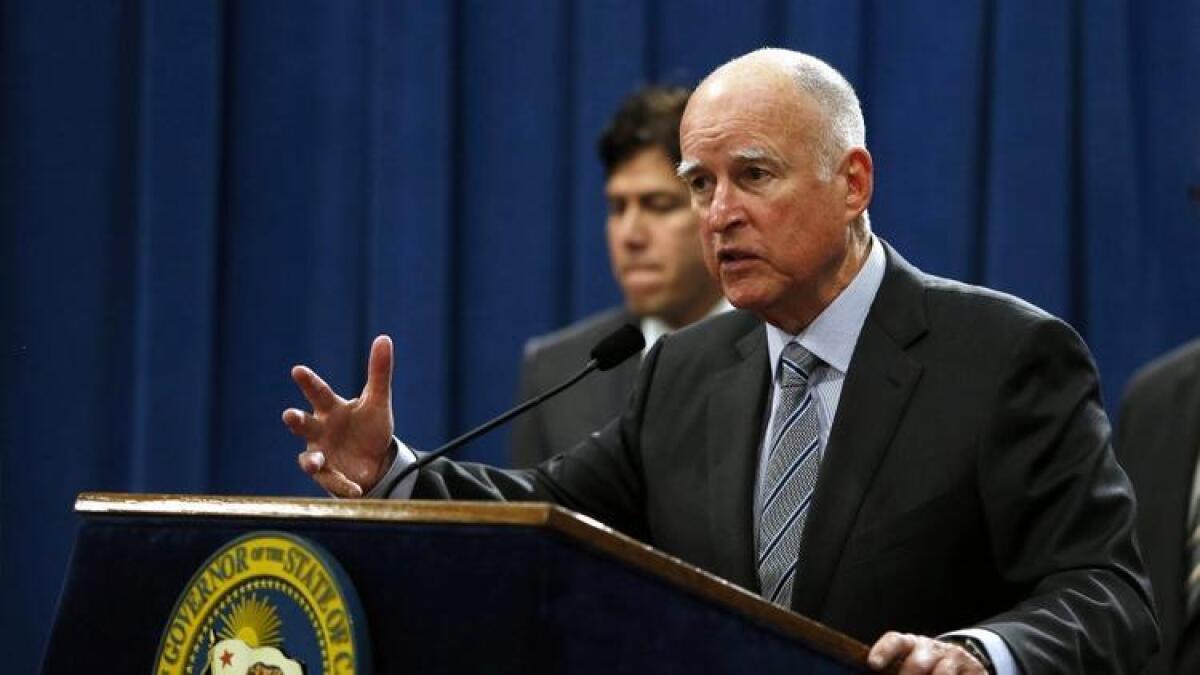
Gov. Jerry Brown on Monday signed legislation to ensure farm labor contractors train employees on how to prevent and report sexual assault, a response to a 2013 PBS Frontline investigation that found sexual violence against women was a pervasive problem in California fields.
Senate Bill 295 by Sen. Bill Monning (D-Carmel) makes sexual harassment training mandatory at all businesses that supervise farm employees or provide them with lodging, transportation or other services.
The training has to be conducted or interpreted in a language that employees can understand, the law stipulates, and farm labor contractors will have to provide proof of all of their materials and resources to the Farm Labor Commission as part of the license renewal process.
Under the new law, the state labor commission also will be able to charge a $100 civil fine for any violation of the new requirements.
The PBS Frontline investigative documenatory, “Rape in the Fields, The Hidden Story of Rape on the Job in America” found more than half a million women work in U.S. fields. Most do not have legal residency in the country, and sexual harassment and violence often go unreported. A 2012 Human Rights Watch survey found 80% of 150 women in California’s Central Valley had experienced some form of the abuse.
- Share via
Los Angeles voters can cast ballots in Assembly race on Tuesday
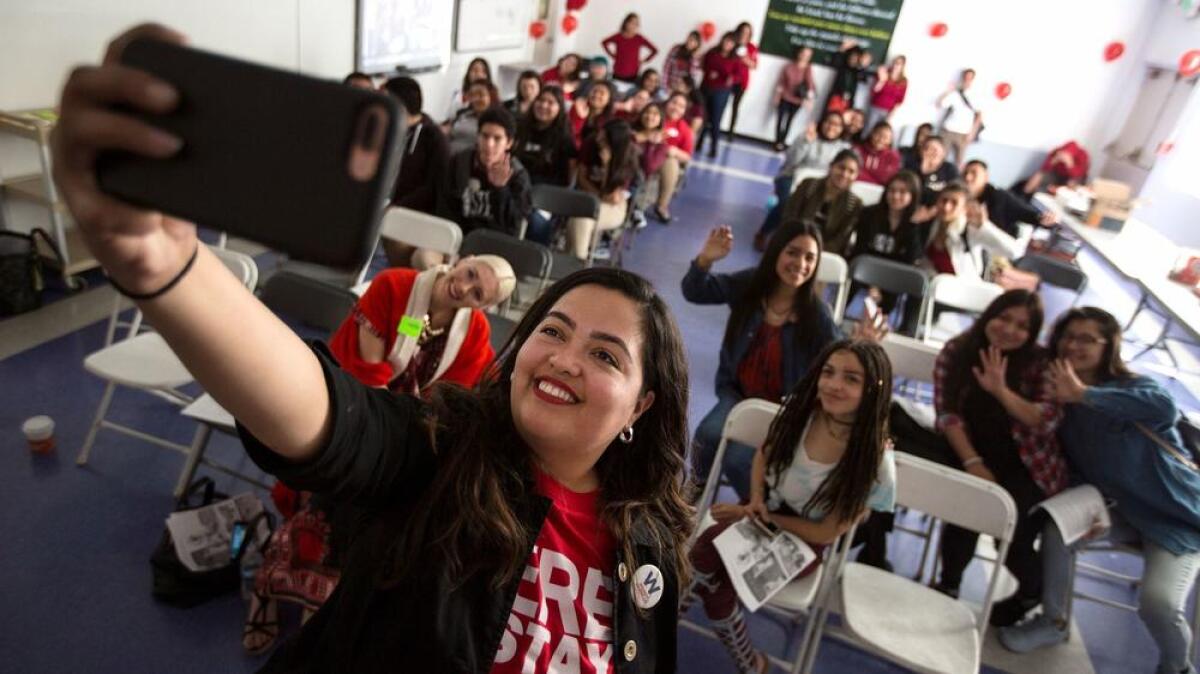
The political dominoes from U.S. Sen. Barbara Boxer’s retirement are almost done falling.
Her decision two years ago to forgo reelection led to a reshuffling that eventually left vacant a state Assembly seat in Los Angeles.
There are 13 candidates running in the special election, and the primary is Tuesday.
- Share via
California Politics Podcast: Lawmakers say their focus on housing has just begun
For months, lawmakers in Sacramento said that their effort to pass a package of bills aimed at California’s housing woes was only the beginning.
They repeated that pledge on Friday, even after acknowledging the heavy political lift it took just to pass the simple steps signed into law by Gov. Jerry Brown.
On this week’s podcast episode, we discuss the political and practical impact of the new housing laws, as well as what might be in store for 2018.
We also discuss Brown’s decision to move California’s presidential primary from June to March, and whether it has any hope of making the state relevant in the race for the White House.
Other topics on this week’s podcast include a push for a property tax proposal on next year’s statewide ballot, and a new poll showing a number of likely voters think Sen. Dianne Feinstein should step down when her current term ends.
I’m joined by Times staff writer Liam Dillon and Marisa Lagos of KQED.
- Share via
Gov. Brown signs major housing legislation
At a signing ceremony in San Francisco on Friday morning, Gov. Jerry Brown signed 15 bills aimed at addressing the state’s mounting housing problems.
“It is a big challenge,” Brown said. “We have risen to it this year.”
The bills could add nearly $1 billion in new funding for low-income housing developments in the near term as well as lessen regulations that slow growth.
- Share via
Watch live: Gov. Jerry Brown signs bills to tackle California’s housing crisis
Gov. Jerry Brown and state lawmakers are gathered in San Francisco for the signing into law of a package of proposals designed to tackle some of the most pressing parts of California’s housing crisis.
- Share via
Businesses in California will be required to tell customers exactly how much their automatic renewal will cost
California will require online businesses that offer free trials to tell customers exactly how much an automatic renewal will cost under a law signed by Gov. Jerry Brown on Thursday.
The law’s author, Sen. Bob Hertzberg (D-Van Nuys), thinks the bill, known as SB 313, will make it easier for customers to cancel service.
“Consumers need to know what they are signing up for and that they can just as easily cancel any service or subscription online as when they started it online,” Hertzberg said in a statement.
Streaming services like Hulu and Spotify and the file-sharing site Dropbox have elicited lawsuits and consumer complaints about their automatic service renewals, according to Hertzberg’s statement.
The law goes into effect in July.
- Share via
Antonio Villaraigosa wants to bring back an urban renewal program to fund low-income housing
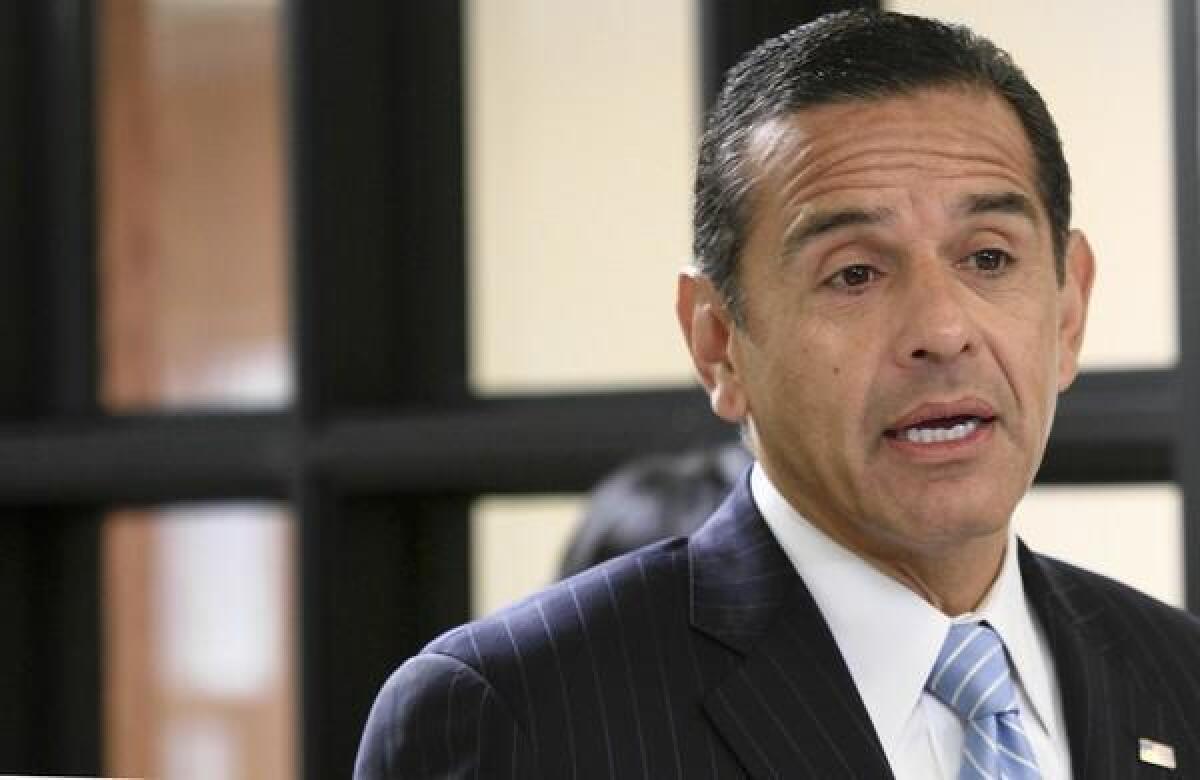
California candidate for governor Antonio Villaraigosa wants the state to bring back an urban renewal program to fund low-income housing.
“Solving our state’s growing housing crisis will take a sustained commitment and creative thinking,” Villaraigosa wrote in an op-ed in the San Francisco Chronicle. “But when it comes to giving local governments the tools they need, we don’t need to reinvent the wheel.”
Gov. Jerry Brown and lawmakers eliminated a state redevelopment program in 2011 as a cost-cutting move aimed at saving nearly $2 billion during the state’s budget crisis. The program allowed cities to target run-down neighborhoods for investment and use a share of property tax dollars generated by development to fund improvements, including financing low-income housing. But doing so required the state to spend more to support public schools, and Brown derided the agencies as being rife with abuses of taxpayer dollars.
Villaraigosa, a former mayor of Los Angeles, said a revived program would allow for greater state assistance to address housing problems.
Lawmakers passed a large package of housing legislation earlier this month, including a new real estate transaction fee and a bond measure for the November 2018 ballot. But even with that new spending, state subsidies will remain billions of dollars’ short of what’s needed to finance housing for its neediest residents, according to state and third-party estimates.
- Share via
Will California Republicans in the House support a tax proposal that would hit their districts hard?
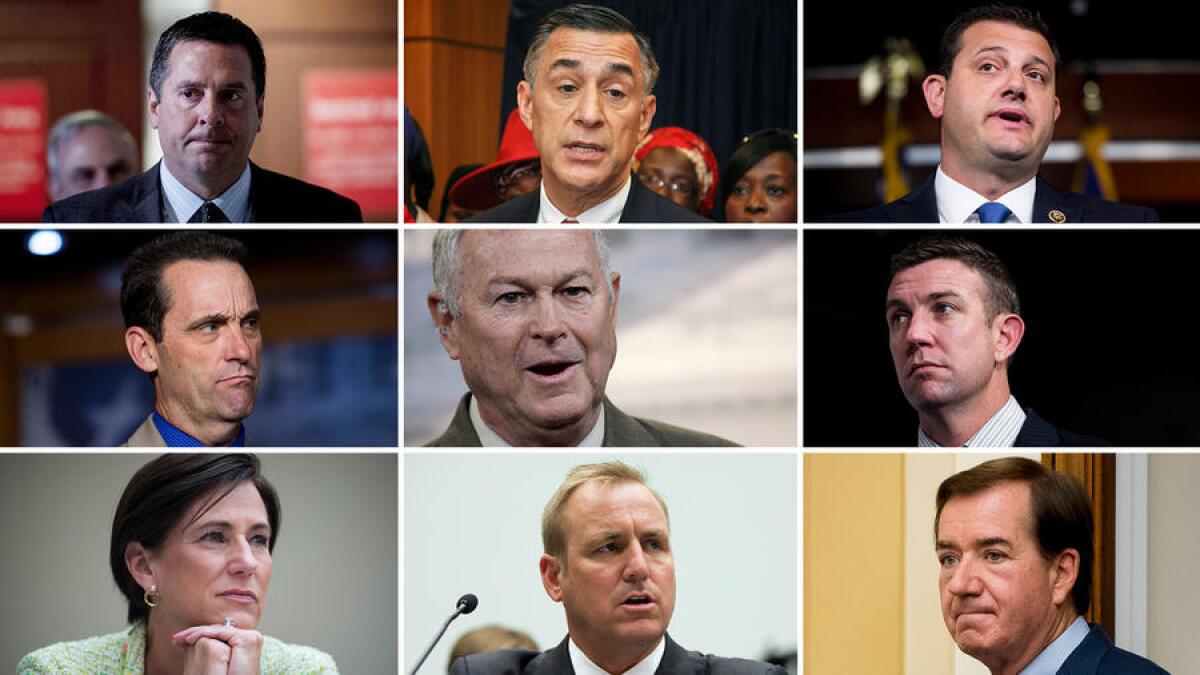
One-third of Californian taxpayers could be forced to pay thousands more in federal taxes from the repeal of one deduction under a GOP proposal released Wednesday, setting up another political dilemma for California Republicans facing tough reelection battles next year as Democrats work to win back the House of Representatives.
The potential repeal of the state and local tax (SALT) deduction, which allows taxpayers to write off those taxes on their federal returns, would hit especially hard in wealthier areas, some of which are on the exact turf Democrats are trying to win over in Southern California.
Details of the overall tax reform plan have yet to be worked out, but so far, vulnerable California Republicans are not joining GOP colleagues in other states who have said they won’t accept the repeal of the deduction, and some of them seem willing to negotiate.
- Share via
Here’s why California’s early primary in 2020 is destined to pick the next president. (Nah, not really)
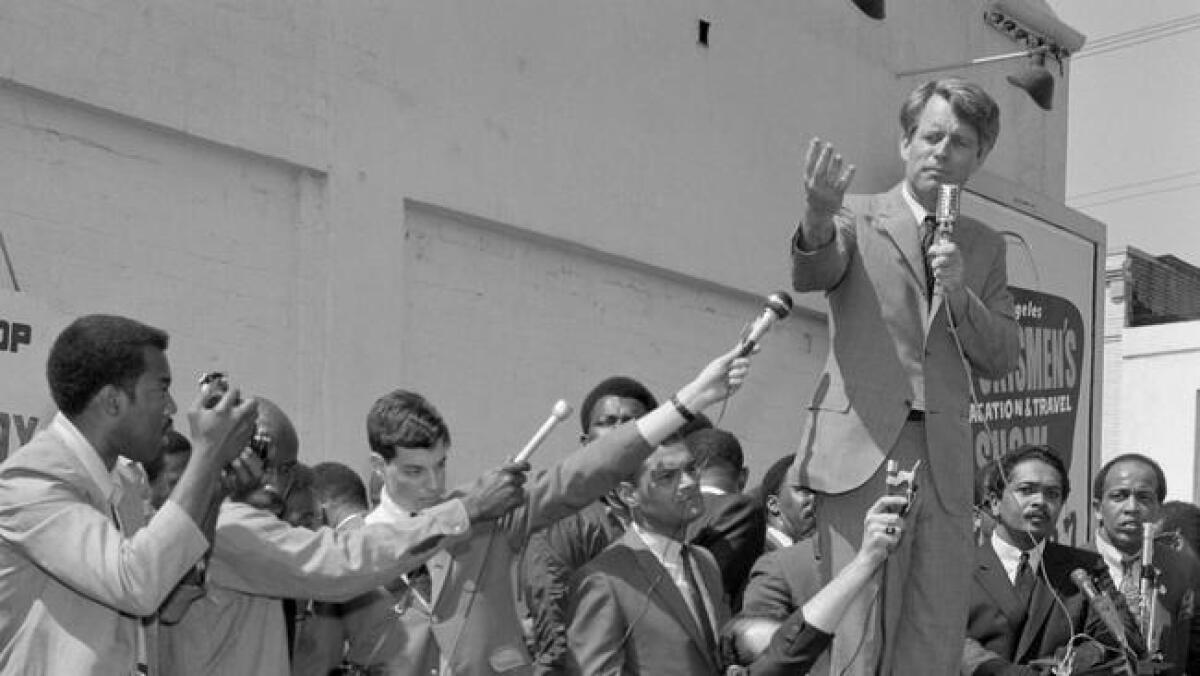
Today we answer questions.
Woo-hoo! Now that Gov. Jerry Brown has signed the bill, it looks like California is moving up its 2020 presidential primary. Finally!
Uh.
No more watching from the sidelines as small-fry states like Iowa and New Hampshire throw their weight around.
Um.
I’m already fluffing pillows and prepping the guestroom for all the 2020 hopefuls who’ll be camped out.
Er.
What? You don’t seem too excited.
Look, it would be great if California voted in a truly meaningful presidential primary. It’s been about 50 years since that happened. But it’s about as likely in 2020 as President Trump dumping Vice President Pence and running for reelection on a unity ticket with Hillary Clinton.
How can that be?
Lots of reasons, both political and practical.
Do tell.
- Share via
Poll: Californians like Obamacare more than ever but are divided on single-payer healthcare
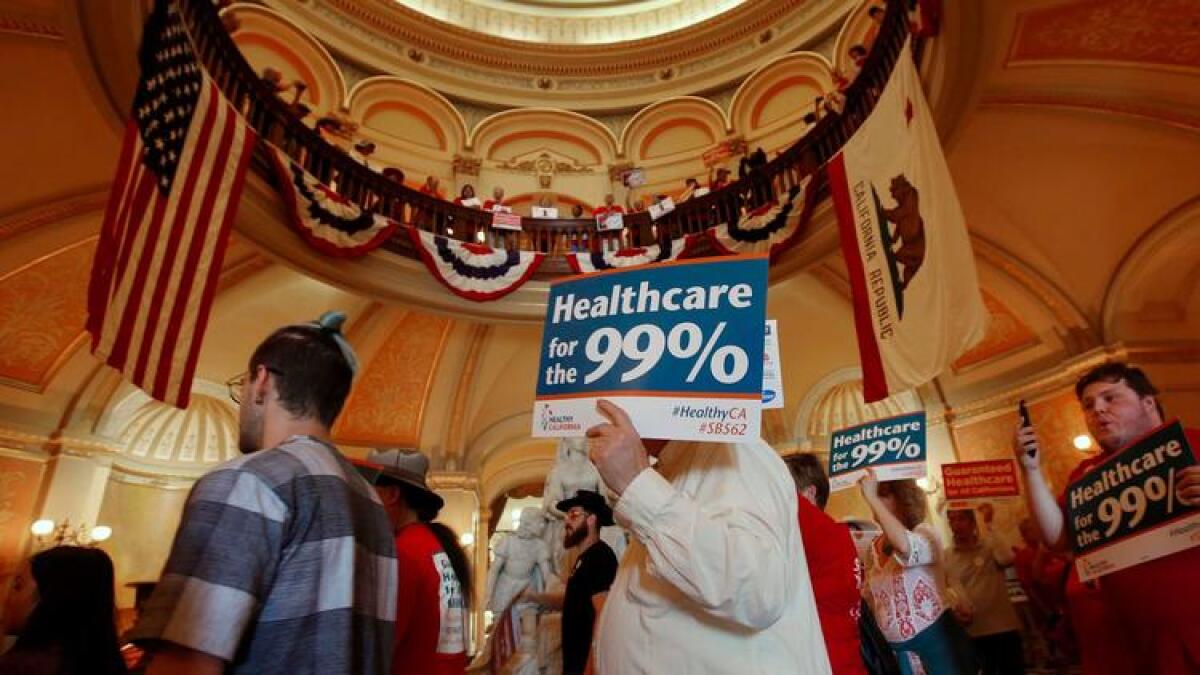
As the latest attempt to repeal the Affordable Care Act fizzles, the law has reached its highest popularity in California in four years, according to a new poll released Wednesday by the Public Policy Institute of California.
Nearly 60% of the Californians hold a generally favorable view of the healthcare law, and just over a third of Californians see it unfavorably — the highest approval rating since PPIC began tracking the law’s popularity in 2013.
But while Democrats and independents back the law, known as Obamacare, with strong majorities, three-quarters of Republicans have negative views of it.
Only 18% of Californians believe congressional Republicans should try again to repeal and replace the Affordable Care Act, and 58% of adults want to see bipartisan efforts to improve the law.
Underscoring the GOP’s challenge in dramatically reducing government’s role in healthcare, two-thirds of the state’s adults believe it is the federal government’s responsibility to ensure that all Americans have health coverage.
But Californians are divided on whether to substantially increase government involvement through a single-payer system, such as the “Medicare for All” proposal recently introduced by Sen. Bernie Sanders (I-Vermont).
A national single-payer insurance program such as “Medicare for All” gets support from 35% of Californians, according to the poll. Support is higher among Democrats — 44% — and independents — 34% — than among Republicans. Only 6% of Republicans back such a system.
But the current system, a patchwork of government and private insurance options, isn’t particularly adored by Californians.
Just under 30% of adults support continuing with a mix of private and public insurance options, while 36% of Democrats, 21% of Republicans and 31% of independents see that mixed system as the best way to provide health coverage.
- Share via
Half of California’s likely voters think Sen. Dianne Feinstein should retire, poll finds
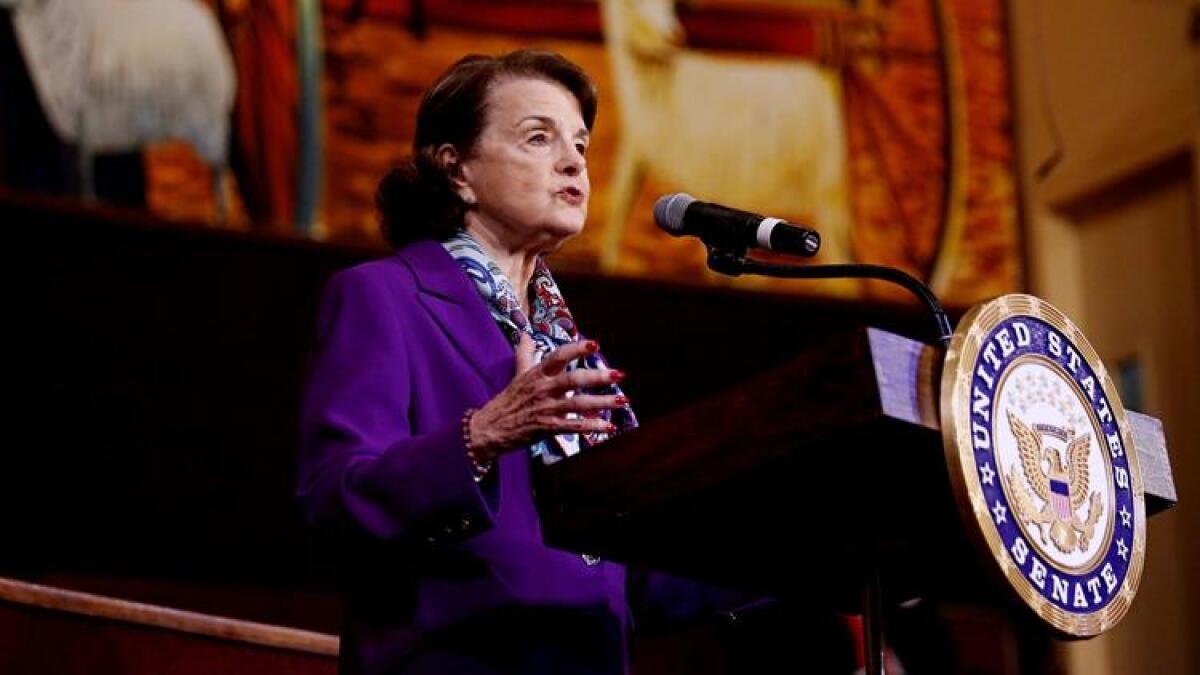
As Democratic Sen. Dianne Feinstein contemplates a 2018 bid for reelection, a new poll has found that 50% of California’s likely voters think she shouldn’t run again.
Just 43% of likely voters support Feinstein running for a sixth term, according to a Public Policy Institute of California poll released Wednesday. The results are similar among all California adults, not just likely voters, with 46% saying she should not run for another term and 41% saying she should run.
Feinstein, 84, has come under increased pressure from members of California’s left, many of whom were infuriated when earlier this month she called for “patience” with President Trump and refused to back demands for his impeachment.
Still, the poll found that Feinstein remains popular. More than half of likely voters — 54% — approve of the job she’s doing, compared with 38% who disapprove.
That’s on par with Gov. Jerry Brown’s approval rating, and it bests the marks for California’s other Democratic senator, Kamala Harris. When likely voters were asked about Harris, the former state attorney general elected to the Senate in November, 47% approved of the job she was doing in Washington and 30% disapproved. Almost a quarter of voters didn’t offer an opinion about Harris.
The contrasting results on Feinstein are difficult to decipher but at the very least indicate voters remain restless.
“Partly, this is a holdover from last year’s election in which you saw many Democrats wanting a more liberal alternative at the presidential level and you saw many independents wanting an outsider,” said Mark Baldassare, president of Public Policy Institute of California. “As people are looking to next year, there’s a desire for something new.”
Speculation continues that Feinstein may face a Democratic challenger. Among those who have been mentioned is state Senate leader Kevin de León (D-Los Angeles), who is weighing his next political move after he terms out of office in 2018. De León lashed out at Feinstein after her comments about Trump in early September.
In her last election, Feinstein trounced her Republican opponent, Elizabeth Emken, by a 25-percentage-point margin in 2012. She won by almost an identical margin in 2006 when challenged by former Republican state Sen. Richard Mountjoy.
However, California has since switched to a top-two primary system. The two candidates who receive the most voters in the June primary election will advance to the 2018 general election, regardless of their party.
Two Democrats faced off in the finale of California’s 2016 U.S. Senate election, with Harris besting then-Rep. Loretta Sanchez.
- Share via
Want to see ‘Hamilton’ in L.A.? Rep. Cardenas is raffling tickets as a fundraiser
Rep. Tony Cardenas (D-Los Angeles) is raffling off a set of tickets to “Hamilton” in Los Angeles as a campaign fundraiser.
According to the small print in an email the campaign sent to supporters, one winner will be randomly selected among donors by 11:59 p.m. PST on Oct. 3. The tickets are for the Oct. 19 showing of the hit musical and have an approximate retail value of $824. Entries for the raffle can also be made without donating to the campaign.
Cardenas is friends with the father of Lin-Manuel Miranda, the Tony- and Pulitzer-winning creator of “Hamilton.” When the show opened in Los Angeles in mid-August, Miranda spoke to nearly 1,000 students in Cardenas’ largely Latino San Fernando Valley district.
The congressman isn’t the only one with the idea. Gubernatorial candidate John Chiang is raffling tickets to the Nov. 1 show to those who follow him on Instagram — if they fill out a form on his campaign website.
- Share via
Barbara Boxer says if Sen. Dianne Feinstein runs for another term, she should expect a tough race
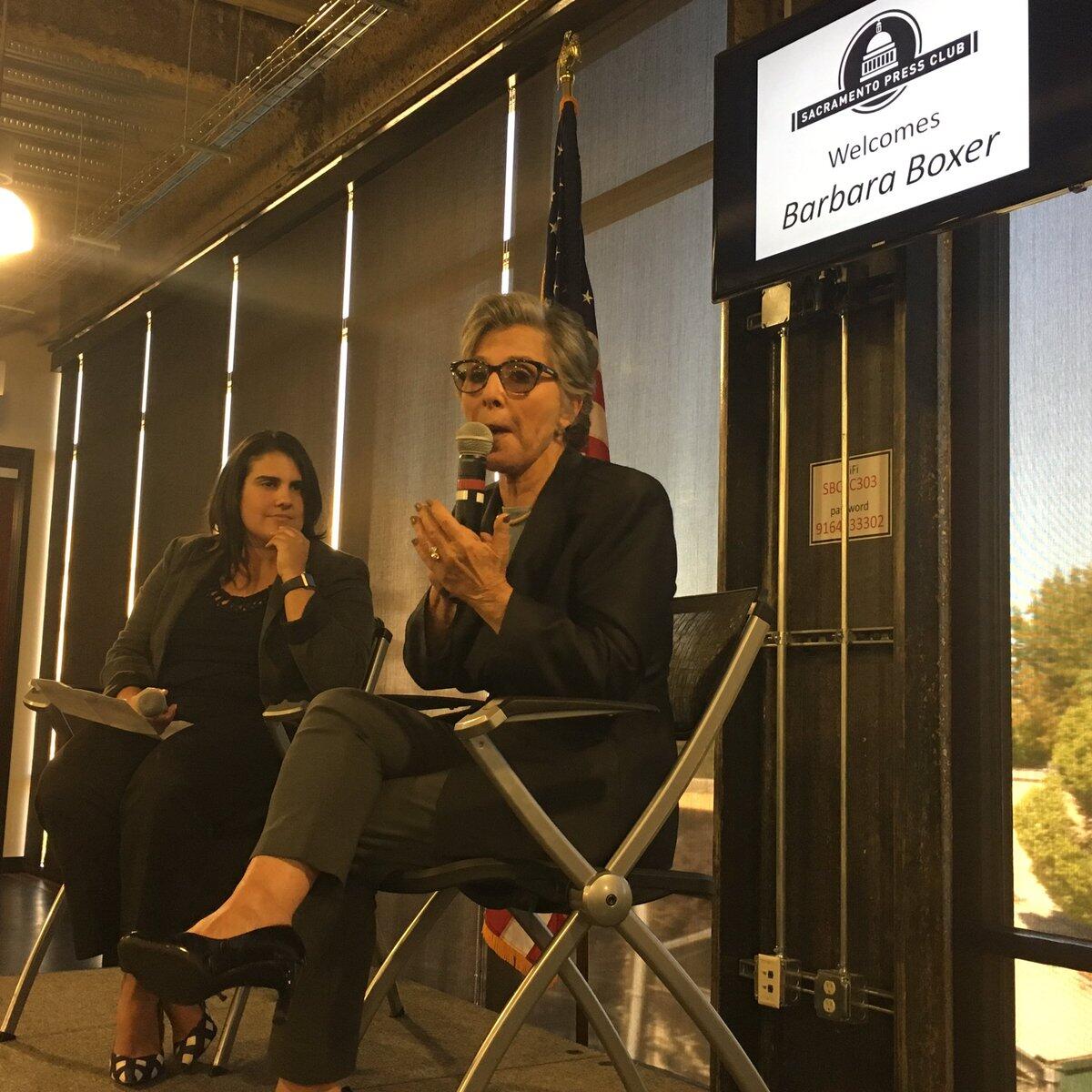
It’s one of the hottest political parlor games in California right now: Will she run again?
Everyone is waiting for Sen. Dianne Feinstein to announce if she’ll seek a sixth term.
And even though they served as colleagues in Washington for more than two decades, former Sen. Barbara Boxer said she has no inside intel on what Feinstein will do in 2018.
“I believe she is running until I see any other indication,” Boxer said Wednesday at a Sacramento Press Club lunch. “Every single race is hard.... Anyone who runs against her will give her a tough race.”
Feinstein, 84, has made clear she is taking her time, even as ambitious politicians eye the seat she has held since 1992. One long-shot Democrat already is raising money for the race, and Feinstein recently drew criticism from California Senate President Pro Tem Kevin de León, who has not ruled out a primary challenge against her.
Boxer said Wednesday her own priority for next year’s midterm election is flipping several Republican-held House seats in Southern California.
“There’s no such thing as an off election year,” she said. “It’s an on year.”
Much of this work will be done through the political action committee Boxer founded, PAC for a Change. The organization also supports electing more Democrats to the Senate and standing up to President Trump’s policies, she said.
Since leaving the Senate in January, Boxer has also given speeches and promoted her book, “The Art of Tough.” She doesn’t like to consider herself a retiree.
Boxer also skirted a question about her pick for governor in a race that already is crowded with several Democrats. All of the candidates, she joked, are “like my sons and daughters.”
- Share via
California’s top elections officer now says his agency’s website wasn’t the one ‘scanned’ by Russian hackers
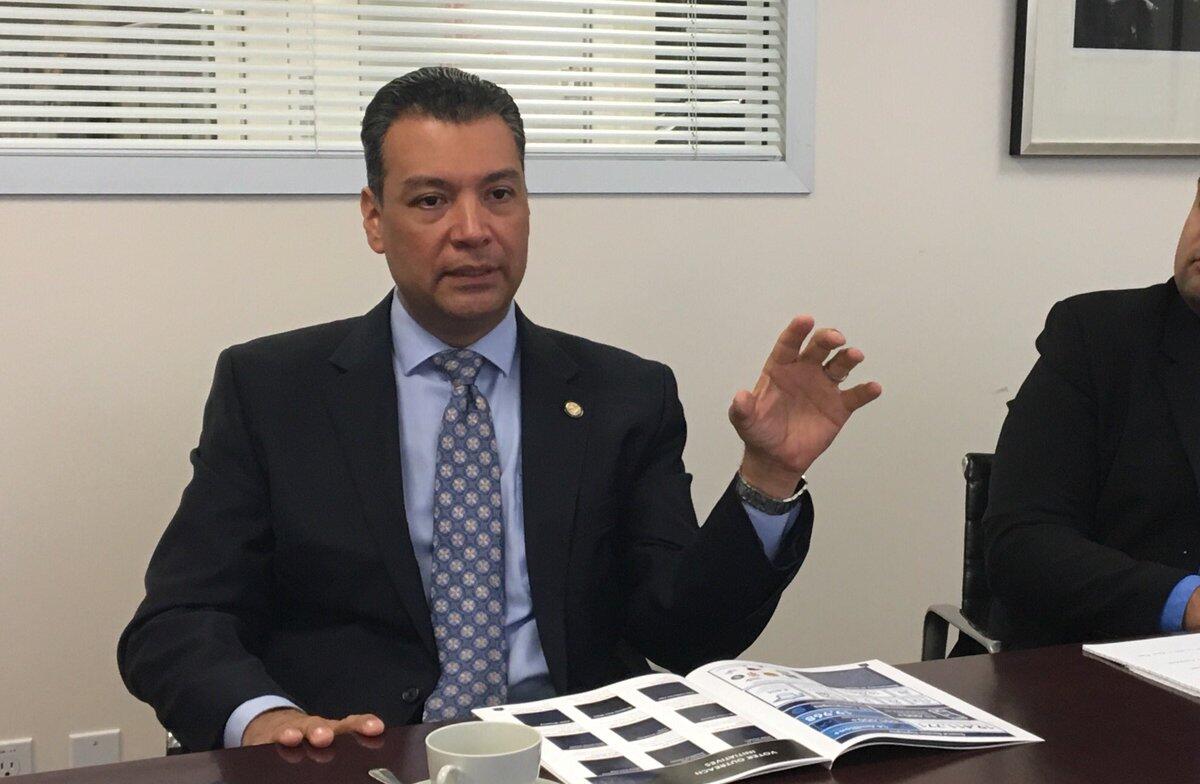
Five days after saying he had been told Russian hackers scanned the state’s main elections website for weaknesses in 2016, California Secretary of State Alex Padilla said Wednesday that it turns out it didn’t actually happen that way.
Padilla said that his office was given incorrect information by the U.S. Department of Homeland Security and that the Russian operation was instead focused on “scanning” the network of the state Department of Technology.
“Our notification from DHS last Friday was not only a year late, it also turned out to be bad information,” Padilla said in a statement.
Bryce Brown, a spokesman for the state’s information technology agency, said officials had long known about “suspect activity that occurred on our network last summer” but didn’t know anything else until the notification from federal officials.
“Although we did not have knowledge of the source until now, we have confirmed our security systems worked as planned and the activity was blocked as it happened in 2016,” he said.
The Department of Homeland Security did not respond to a request for comment.
On Tuesday, the Associated Press reported that federal officials also reversed course in a notification they had made to Wisconsin elections officials about Russian activity. In June, federal officials told Congress that 21 states’ elections systems were targeted by Russian activity.
Padilla insisted last week that the “scanning” incident found no vulnerabilities or access to any California voter information, and he criticized DHS officials for the delay in sharing information about 2016 activities. On Wednesday, he said hopes that federal officials will continue to work with the states in preventing cyberattacks.
“I remain committed to a partnership with DHS and other intelligence agencies; however, elections officials and the American public expect and deserve timely and accurate information,” Padilla said.
- Share via
California moves its presidential primary to March in push for electoral relevance
Backing an effort for California to claim a bigger share of the attention from presidential candidates, Gov. Jerry Brown has signed a bill moving the state’s primary elections to early March.
Brown’s decision, announced without fanfare on Wednesday, means the state will hold its presidential primary on March 3, 2020. It’s a reversal from a decision he made in 2011 to push the state’s primary elections back until June, after years of trying — and failing — to entice major candidates to bring their campaigns to California instead of smaller, more rural states.
Democrats who embraced the push for an early primary said they were motivated in part by the election of President Trump, whose successful bid for the Republican Party nomination was well on its way to reality by the time California voters cast ballots on June 7, 2016.
“We have a greater responsibility and a greater role to promote a different sort of agenda at the national level,” said state Sen. Ricardo Lara (D-Bell Gardens), the author of the bill. “We need to have a greater influence at the national level.”
The new law also moves California’s congressional and legislative primaries to March, a change which some have suggested could make it difficult for challengers to raise money and quickly put together a credible campaign for challenging established incumbents.
Under current projections, California’s primary would come fifth in the presidential nominating process in 2020 — following caucuses in Iowa and Nevada and primaries in New Hampshire and South Carolina. Lara said he realizes that the Democratic National Committee may not like the state moving its election up to the early slot, but that he hopes party officials will work with California officials over the next few years to accommodate the change.
“California’s role has clearly changed,” he said.
California first tried the March primary in 1996. But by election day, 27 states had already held their own presidential primary or caucus, passing over California – one of the most expensive places to buy political advertising time in the nation.
The state’s most successful early presidential primary was in February 2008, when 57.7% of registered voters turned out in a race won by Democrat Hillary Clinton and Republican John McCain. That was the highest voter turnout for a California presidential primary since 1980. But even then, enough states had already voted that the relative impact of the early election was small.
Last year, 47.7% of registered voters cast ballots in the state’s June presidential primary.
Several Democratic lawmakers praised Brown’s decision to allow another try at the early primary.
“Candidates will not be able to ignore the largest, most diverse state in the nation as they seek our country’s highest office,” said Secretary of State Alex Padilla.
The bill does not change the scheduled 2018 statewide primary, which will be held in June.
Brown has one other closely watched bill on his desk with the potential for national political impact: A proposal to deny access to the California ballot for any presidential candidate who won’t release personal tax returns to the public – a not-so-subtle jab at Trump’s refusal to do so in 2016. The governor has until Oct. 15 to act on that, and other, bills passed by the Legislature before it adjourned earlier this month.
UPDATES:
2:54 p.m.: This article was updated with additional information on California’s past attempts to move up its primary, as well as details about the 2016 campaign and comment from Secretary Padilla.
This article was originally published at 1:48 p.m.
ALSO:
California’s Democratic leaders have a plan for thwarting Trump in 2020
Skelton: Brown should junk the presidential election bills on his desk
- Share via
Hollywood tour buses could get more rules slapped on them under the law Gov. Jerry Brown just signed

Gov. Jerry Brown on Wednesday signed legislation aimed at reining in the proliferation of tour buses offering to take fans to the homes and gathering spots of celebrities in Hollywood and other trendy neighborhoods.
The measure allows cities and counties to adopt rules that restrict the routes or streets used by the tour buses, and prohibit the use of loudspeakers on open-topped buses and vans.
Assemblyman Adrin Nazarian (D-Sherman Oaks) introduced the proposal in response to a report by NBC Los Angeles that found some tour buses were operating unsafely without proper permits. He also cited complaints about topless buses on narrow streets of the Hollywood Hills, Malibu and Bel-Air.
- Share via
Latino state lawmakers back Antonio Villaraigosa for California governor
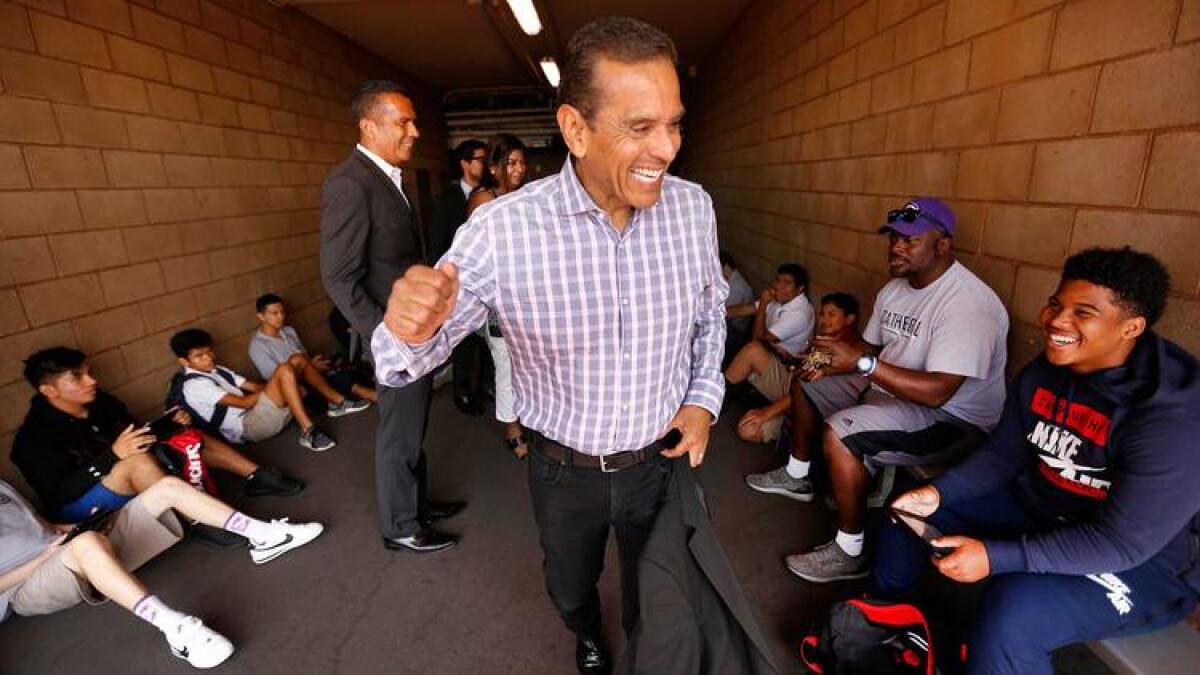
The Legislature’s California Latino Caucus on Wednesday endorsed former Los Angeles Mayor Antonio Villaraigosa for governor.
While expected, the nod from the politically influential caucus is a boon for Villaraigosa, a former Democratic Assembly speaker and the only major Latino candidate running for governor. Villaraigosa has lagged behind Lt. Gov. Gavin Newson in early polls and fundraising.
“As Assembly speaker and Los Angeles mayor, Antonio Villaraigosa worked to strengthen our economy, expand our healthcare, improve our schools and invest in strategic infrastructure projects that create middle-class jobs,” Sen. Ben Hueso (D-San Diego), chair of the caucus, said in a statement Wednesday morning.
An intriguing aspect of the endorsement is that one of the most prominent members of the California Latino Caucus is Senate leader Kevin de León (D-Los Angeles). In Sacramento, speculation abounds over whether De León may run for governor, and the Villaraigosa endorsement could indicate De León has other plans for his political future.
Villaraigosa joins a slate of other Latino statewide candidates endorsed by the caucus: Sen. Ed Hernandez (D-Azusa) for lieutenant governor; current appointee Xavier Becerra for attorney general; incumbent Alex Padilla for secretary of state; Sen. Ricardo Lara (D-Bell Gardens) for insurance commissioner; and Assemblyman Tony Thurmond (D-Richmond) for superintendent of public instruction.
- Share via
California is trying to educate people about marijuana before recreational sales start
Months before California allows the sale of marijuana for recreational use, the state has launched an education campaign about the drug, including highlighting the potential harms of cannabis for minors and pregnant women.
The state is scheduled to issue licenses starting Jan. 2 for growing and selling marijuana for recreational use, expanding a program that currently allows cannabis use for medical purposes.
In response, the California Department of Public Health has created a website to educate Californians about the drug and its impacts, including how to purchase and safely store cannabis.
“We are committed to providing Californians with science-based information to ensure safe and informed choices,” said State Public Health Officer Dr. Karen Smith.
The website, “Let’s Talk Cannabis,” notes it is illegal for people under 21 to buy marijuana for non-medical use and warns that “using cannabis regularly in your teens and early 20s may lead to physical changes in your brain.”
The site also warns that marijuana edibles may have higher concentrations of tetrahydrocannabinol, or THC. “If you eat too much, too fast you are at higher risk for poisoning,” the website warns.
The state urges parents and guardians to talk to their teenagers about legal and health issues surrounding marijuana use.
The state officials also say consuming cannabis is not recommended for women who are pregnant or breastfeeding, or who plan to become pregnant soon, noting that it “can affect the health of your baby.”
The website got good marks from legalization activist Ellen Komp, deputy director of California’s chapter of National Organization for the Reform of Marijuana Laws.
The website is “fairly accurate,” she said, but added, “The risks with pregnancy are somewhat overstated, telling women they should not use cannabis for nausea or even if they are thinking of getting pregnant.”
Some 43% of Californians have used marijuana for recreational purposes and 54% said they have not, according to a USC Dornsife/Los Angeles Times poll last November.
Among those who have not used it, just 2% said they are much more likely to use it if Proposition 64 passed, which it did, while 5% said they are somewhat more likely to use it, and 89% said they are no more likely to smoke pot if it was legalized.
Other advice from the state’s site: driving under the influence of cannabis is illegal and increases the chance of a car accident, and cannabis should be stored in a locked area to avoid poisoning children and pets.
Updated at 11:30 am to include data from poll on marijuana use.
- Share via
Today’s newsletter: Republicans fail again to repeal Obamacare
Today’s Essential Politics newsletter details the last gasp of the Republican efforts in Washington to repeal the Affordable Care Act, efforts that President Trump insisted on Tuesday aren’t over.
We also take a look at the win by Roy Moore, a former chief justice of the Alabama Supreme Court, in a Senate runoff that saw the president back the losing candidate.
And we’ve got the details of what happens if Gov. Jerry Brown, as expected, signs the “sanctuary state” bill into law.
The newsletter comes out Mondays, Wednesdays and Fridays. Are you a subscriber? Sign up below.
- Share via
Combustion engines could go the way of the horse and buggy in California, top air regulator says

Imagine a future where only zero-emission vehicles could be registered in California or driven on the state’s freeways.
Those are two tactics that could be used to help the world’s sixth largest economy phase out combustion engines, suggested California Air Resources Board Chair Mary Nichols in a recent interview with Bloomberg.
The state already has far-reaching policies for fighting climate change, but Nichols said Gov. Jerry Brown wants to make sure California is keeping pace with goals set by other countries.
Britain and France plan to ban vehicles powered by gasoline or diesel fuel by 2040, and China recently announced it would set its own deadline.
“I’ve gotten messages from the governor asking, ‘Why haven’t we done something already?’” Nichols said in the Bloomberg interview. “The governor has certainly indicated an interest in why China can do this and not California.”
The discussion is not a new one for California leaders. Brown signed legislation last year requiring the state to reduce greenhouse gas emissions to 40% below 1990 levels by 2030, but an even more ambitious target was included in a 2005 executive order from Gov. Arnold Schwarzenegger.
To hit the goal of slashing emissions to 80% below 1990 levels by 2050, California would need nearly every new vehicle sold between 2040 and 2050 to produce zero emissions, according to an analysis from the Air Resources Board.
So far, California has struggled to meet more modest goals of getting more electric cars on the road, and emissions from transportation have recently increased.
“Given the existential challenge we face, the administration is looking at many, many possible measures – including additional action on electric vehicles – to help rapidly decarbonize the economy and protect the health of our citizens,” Dave Clegern, a spokesman for the Air Resources Board, said in a statement.
- Share via
Police body camera footage depicting rape victims won’t be released in California under new law

Gov. Jerry Brown signed a measure Tuesday that would prohibit the public release of police body camera footage or other videos that depict victims of rape, incest, sexual assault, domestic violence or child abuse.
The new law will not change existing policy. Generally, police departments across California don’t release body camera footage outside of a courtroom. This measure, Assembly Bill 459 from Assemblyman Ed Chau (D-Arcadia) enshrines extra protection for such footage into state law.
Lawmakers have struggled to pass more wide-ranging police body camera policies. A bill that would have allowed much more footage to be released did not advance this year.
- Share via
After meeting with Trump, California Democrats say they want a seat at the tax reform table
Ahead of Republicans’ plans to unveil a more detailed overview of their tax reform plan Wednesday, President Trump sat down with a bipartisan group of members that included California Democratic Reps. Linda Sanchez and Mike Thompson.
Sanchez, of Whittier, who serves on the House committee that has authority over tax legislation, said members didn’t learn much about the details of the plan Tuesday.
“There were kind of generalities but no specificity, which is why we’re interested to see what they put out tomorrow, because clearly it’s not something that’s had Democratic input,” Sanchez said.
According to a White House transcript of part of the meeting, Trump said the plan is focused on making the tax code “simple and fair,” increasing the deduction most families can take, lowering the business tax rate and bringing wealth stored overseas back to the United States.
Thompson, of St. Helena, said the president listened to what Democrats had to say, but he didn’t get the impression that the policy plan would change before it becomes public Wednesday.
“I don’t think it was that kind of meeting. We all agreed we wanted a fair, easy-to-work-with tax code that generates more jobs,” said Thompson, who is also on the committee. “He said repeatedly he wants to be successful.”
Republicans are set to unveil a “consensus document” Wednesday they say will be a much more detailed overview than previous tax policy papers they’ve released. But it is not expected to be an actual plan or bill.
Republicans will huddle with Vice President Mike Pence for half of Wednesday to discuss tax reform. Democrats are holding their own tax reform forum too.
It’s been 30 years since Congress has passed a major tax overhaul, and Republican leaders have set an ambitious timeline for passing a tax-reform measure, indicating they want to get it to Trump’s desk by the end of the year.
Sanchez said she tried to stress in the meeting that Democrats should play a role in writing the final bill. There wasn’t discussion about the group sitting down with Trump again, she said.
“The president was very pleased that it was a bipartisan effort, which sort of confused me because that was the first meeting where there were members of the Democratic side of the Ways and Means Committee there,” Sanchez said. “I don’t know if they’ve been telling him that the process is bipartisan or if he knew it wasn’t bipartisan but didn’t care, but I thought that was kind of odd.”
- Share via
Tom Steyer won’t rule out challenging Sen. Dianne Feinstein, but warns against reading too much into that
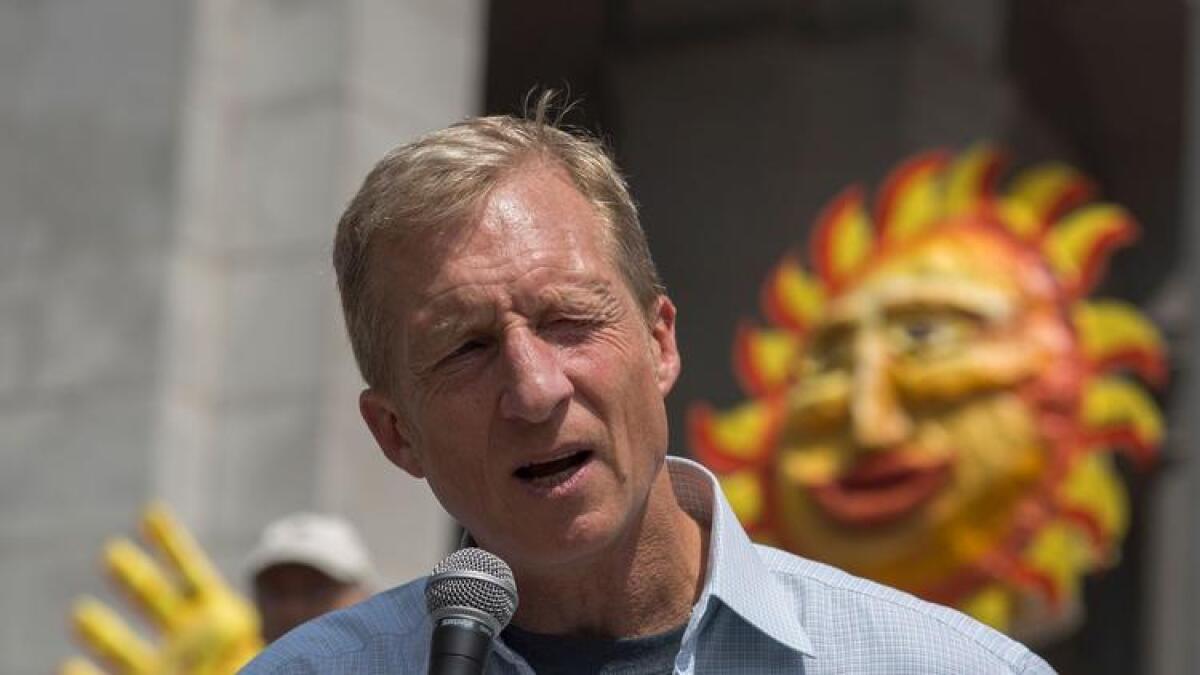
Billionaire environmentalist Tom Steyer did a little political two-step Tuesday when a reporter pressed him on whether he might challenge Democratic Sen. Dianne Feinstein if she runs for reelection.
Capital Public Radio’s Ben Adler tweeted that he asked Steyer if he would rule out running against Feinstein, and that Steyer would not nix the idea. Steyer was visiting a Sacramento high school to encourage students to register to vote.
Steyer quickly added that he hates answering speculative questions such as the one posed to him because there’s always a chance it might “bite you in the rear end.”
“I’d rather come out with what I do want to do as opposed to eliminating all the things I don’t want to do,” he told Adler.
Steyer, a Democrat who has openly contemplated a run for governor, said he is still weighing his political prospects and has not decided if he will run for office in 2018.
Feinstein has been facing increased pressure from progressive activists who believe she’s out of touch with her constituents. That intensified earlier this month when Feinstein refused to back the impeachment of President Trump, instead calling for “patience” during his presidency, which prompted a rebuke from state Senate leader Kevin De León.
Feinstein has been coy so far about whether she’ll retire or run again in 2018, but she does have a hefty $3.5 million in campaign funds socked away.
- Share via
Judge rewrites summary of proposed gas tax repeal initiative, saying it was ‘fundamentally flawed’

A judge on Monday rewrote the title and summary for a proposed initiative that would repeal recent gas tax increases in California. He rejected a title and summary written by the state attorney general’s office as “fundamentally flawed.”
Sacramento Superior Court Judge Timothy M. Frawley criticized the attorney general’s office for not mentioning in the title that the ballot measure would repeal newly approved taxes or fees.
“This is not a situation where reasonable minds may differ,” Frawley wrote in his ruling. “The Attorney General’s title and summary ... must be changed to avoid misleading the voters and creating prejudice against the measure.”
The initiative proposed by Assemblyman Travis Allen (R-Huntington Beach) would repeal a bill approved in April by the Legislature and governor that would raise the gas tax by 12 cents per gallon and increase vehicle fees in order to generate $5.2 billion for road repairs and to improve mass transit.
The title and summary will be placed on petitions to be circulated by those trying to qualify the measure for the November 2018 ballot. The title and summary are also placed on the ballot if enough signatures are collected.
The original title written by Atty. Gen. Xavier Becerra’s office was: “Eliminates recently enacted road repair and transportation funding by repealing revenues dedicated for those purposes.”
Allen’s attorneys argued the voter could read that to mean that the Legislature identified existing funds for transportation and the initiative would take those funds away.
The judge’s title says: “Repeals recently enacted gas and diesel taxes and vehicle registration fees. Eliminates road repair and transportation programs funded by these taxes and fees.”
The judge also made it clear in the summary that an Independent Office of Audits and Investigations that would be eliminated by the initiative is “newly established.”
Representatives of the attorney general’s office were not immediately available to comment on whether the ruling would be appealed.
- Share via
Democrats to try to force vote on Dream Act with rarely successful procedural move
House Democrats are trying to force a vote on Rep. Lucille Roybal-Allard’s version of the Dream Act, they announced in a news conference Monday.
The House and Senate have less than six months to address the legal status of people brought into the country illegally as children before the program protecting them from deportation ends in March.
In the weeks since President Trump announced he was ending the Deferred Action for Childhood Arrivals program, Democrats have pushed for a quick vote on Roybal-Allard’s bill, which is backed by every House Democrat and four Republicans. There are also a handful of other Republican-sponsored bills that could be considered.
To force a vote, Democrats would need a majority of the House — 218 members — to sign what’s called a discharge petition to pull the bill from the House Judiciary Committee and bring it to the House floor.
Roybal-Allard, a Democrat from Downey, said she believes there is enough support to pass the bill if Democrats can get it to the House floor. Democratic leaders said they expect all House Democrats will sign the petition.
“The American people overwhelmingly oppose deporting our ‘Dreamers,’” Roybal-Allard said. “But the Republican leadership is ignoring the wishes of a majority of the American people.”
Democrats hold only 194 seats, and would have to convince 24 Republicans to buck their party leaders and sign the petition.
House leaders control which bills come to the floor for a vote and when. Although discharge petitions have been used in the past to shame congressional leadership into letting a bill move forward, the procedural move is rarely successful.
This month, Republican Rep. Mike Coffman of Colorado filed a discharge petition for the Bridge Act, a Republican- sponsored bill to address the legal status of people brought to the country illegally as children. Five members of Congress had signed on as of Monday.
FOR THE RECORD
Sept 26, 12:38 p.m.: An earlier version of this post identified the member of Congress who filed a discharge petition for the Bridge Act as Rep. Mike Thompson. It was Rep. Mike Coffman.
- Share via
California lawmakers grant some megaprojects relief from environmental law, but not others

When professional sports team owners, Facebook and big developers have asked California lawmakers for some relief from the state’s main environmental law over growth, the answer usually has been yes.
The law, the California Environmental Quality Act, requires developers to disclose and reduce a project’s effects on the environment — a process that often can get tied up in lengthy litigation.
This year, legislators passed a measure aiming to shorten any potential environmental lawsuit against Facebook’s expansion of its headquarters, two skyscrapers planned in Hollywood and other megaprojects to less than nine months. Doing so has led many to question why only big projects get such relief.
- Share via
The fate of California’s biggest campaign donor disclosure bill may hinge on some small details
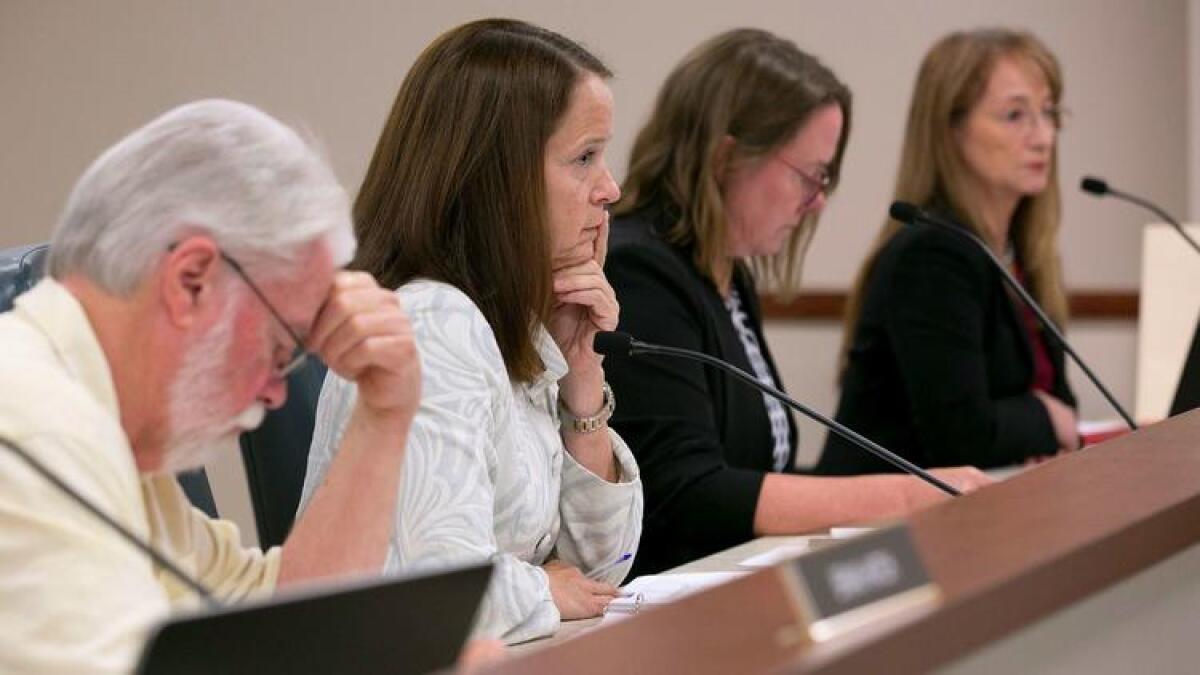
You wouldn’t expect to see the leader of California’s campaign watchdog agency rooting for Gov. Jerry Brown to veto sweeping new disclosure rules for political donors. And yet, that’s where things stand in a seven-year debate over helping voters follow the money.
“I think we can do better than this bill,” said Jodi Remke, chair of the California Fair Political Practices Commission.
Remke and her staff have raised a red flag about the fine print tucked inside Assembly Bill 249, the “California Disclose Act,” that rewrites rules for campaign contributions that are “earmarked.”
- Share via
Bay Area Rep. Eric Swalwell backs Gavin Newsom for governor
- Share via
Oceanside lifeguard receives California’s highest public safety honor

An Oceanside Fire Department officer who risked his life to save a boater received the state’s highest award for public safety officers on Monday.
Gov. Jerry Brown and Atty. Gen. Xavier Becerra presented David Wilson with the Public Safety Medal of Valor at a ceremony at the state Capitol.
In July 2016, Wilson rescued a man whose boat crashed into a jetty in Oceanside Harbor. The victim was barely conscious and jammed between two rocks. With only a short window between each set of waves, Wilson dove underneath the water and swam into the boulders to free the victim’s legs.
“You earned it,” Brown said at the ceremony. “You were assaulted by the waves and the rocks, and you went ahead anyways. That’s why you are the only one getting a medal of honor.”
A review board made up of law enforcement officers reviewed 21 nominations for the Medal of Valor.
The award is given out once a year. There can be more than one recipient, but this year Brown chose one.
- Share via
California joins 11 states to oppose one of the ways Ohio cancels a voter’s registration
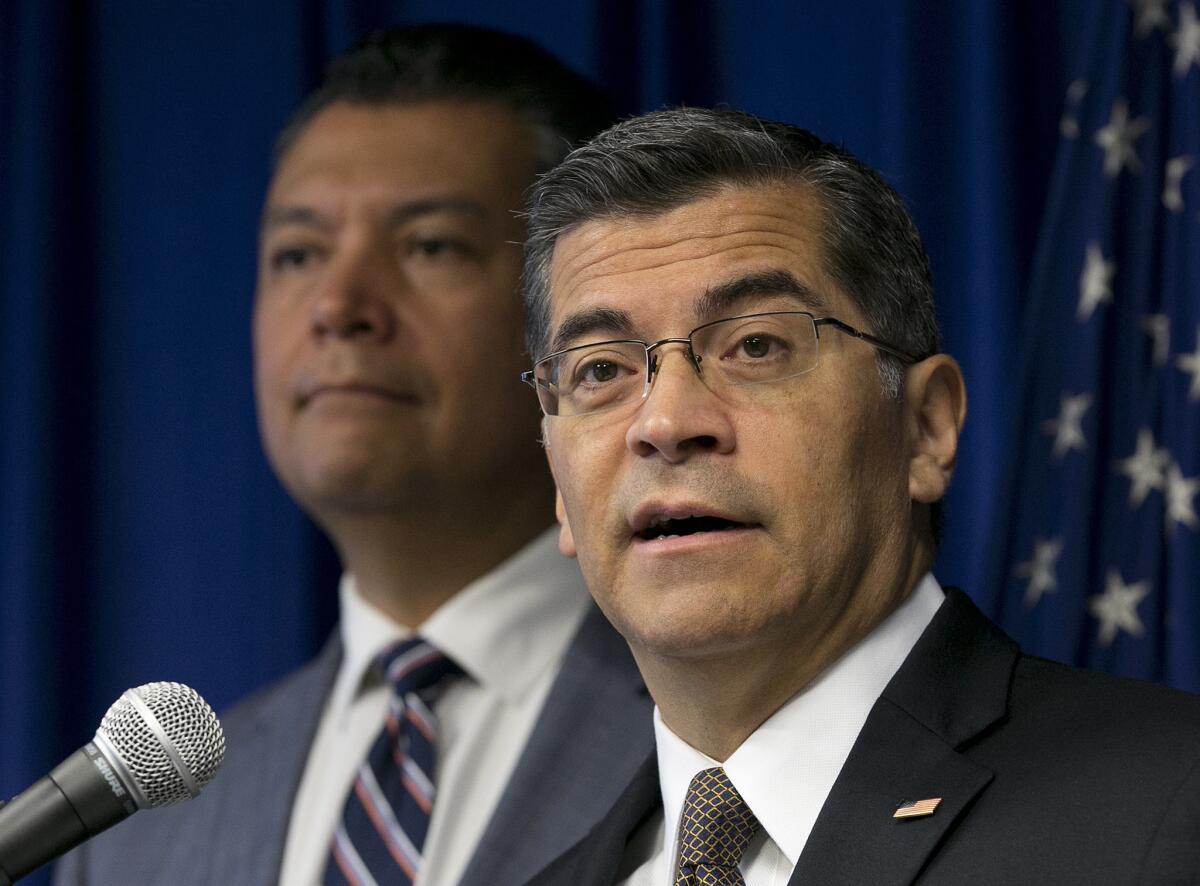
California’s attorney general joined a group of other states on Monday to ask the Supreme Court to abolish a controversial policy in Ohio that cancels a voter’s registration for not frequently casting a ballot.
A federal appeals court earlier this year found the Ohio practice to be illegal. Though California doesn’t use a similar process, state Atty. Gen. Xavier Becerra signed on to a court filing with 11 other states and the District of Columbia to urge the justices to uphold the lower court’s ruling.
“Removing eligible voters from registration lists serves to silence and suppress citizens,” Becerra said in a written statement. “All too often, state policies like the one we’re opposing in Ohio make it harder for our most vulnerable citizens to vote.”
The case centers on Ohio’s practice of sending a registration notice to those who don’t cast any ballot in a two-year period. If a voter doesn’t respond or vote over the following four years, his or her registration is canceled.
In California, elections officials generally remove voters from their lists only if there’s proof the person has died or if it’s clear through other research methods that he or she has moved. Otherwise, those who don’t cast ballots over a period of time are moved to an “inactive list” of voters.
“Aggressive purging of voter rolls jeopardizes the fundamental rights of American citizens,” California Secretary of State Alex Padilla said in a written statement. “States should not have free rein to kick voters off the rolls merely because they sit out elections.”
Ohio elections officials maintain that the system has been in use for a number of years, and that it’s been used to keep the lists of voters accurate. Critics who filed the original lawsuit argued that the purging of names has been used selectively in a way that penalizes only certain voters for not casting a ballot.
- Share via
Put Californians before Republicans on healthcare vote, Dianne Feinstein tells GOP House members
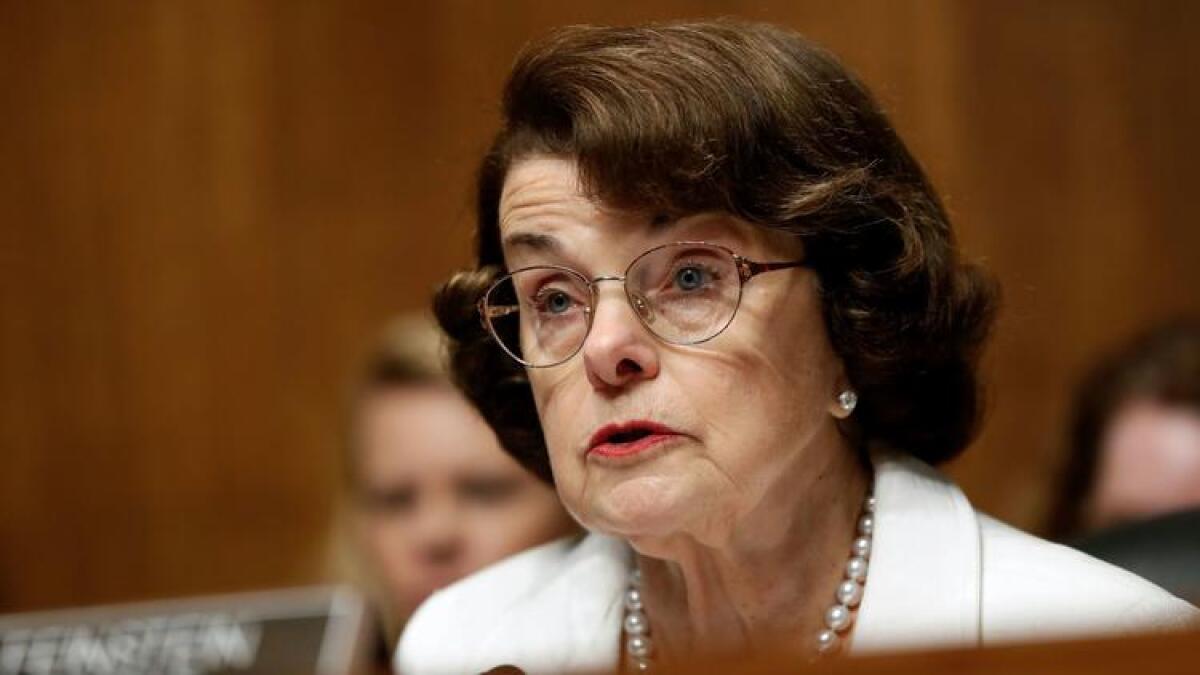
Sen. Dianne Feinstein made a direct appeal to her 14 California congressional Republican colleagues on Monday, asking them to stop the latest GOP healthcare bill if it gets to the House.
The Senate hasn’t scheduled a vote on the plan, and it’s not clear it would pass if a vote was held. But if it did, California House members could determine whether it goes to President Trump’s desk or not.
If it gets through Congress, the Senate bill is expected to have an outsized effect on California, slashing more than $100 billion in federal funding for the state over the next decade and tens of billions more in the years that follow.
“If this bill makes it to the House, you have an opportunity to stop it. I implore you to do so. This is about putting people over politics, Californians ahead of party,” Feinstein wrote in a letter to House Majority Leader Kevin McCarthy of Bakersfield.
Senate leaders want to take up the bill this week because a Senate rule that allows Republicans to pass the bill with a simple majority expires Sept. 30. Democratic senators, including Feinstein and Kamala Harris, oppose the bill.
“While I will do all I can to defeat this bill, I ask that if it passes you put politics aside and vote in the best interest of those you represent and help defeat this dangerous bill,” Feinstein said in her letter. “It is no secret that the bill was drafted to take federal funds from California and other states that expanded Medicaid (in order to cover low-income working adults) and give it to states that put politics ahead of their people and failed to expand Medicaid.”
Many of the state’s conservative-leaning districts benefited the most from Obamacare’s expansion of Medi-Cal to include more low-income adults, a group of people that would likely lose coverage if the bill passes and the federal government no longer contributes as much to pay for their healthcare.
California’s House Republicans all voted in favor of a GOP plan to repeal the Affordable Care Act in May. Several politically vulnerable Republicans said they did so because they believed the Senate would return a bill to the House that would address their concerns with the House bill.
Seven California Republicans face particularly tough reelection campaigns in 2018, in part because their districts backed Hillary Clinton for president in 2018, and many of their opponents have already started using the May vote against them.
- Share via
7.5 million Californians could lose coverage under latest Obamacare repeal effort, state health insurance exchange says
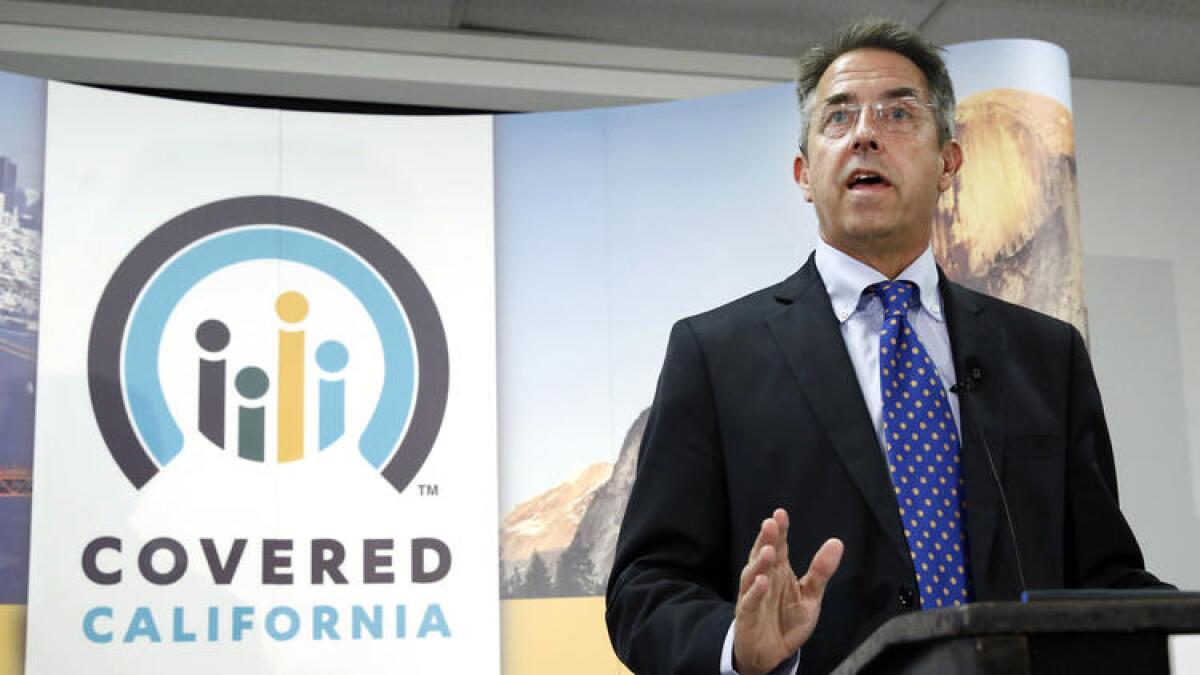
Californians who get their health coverage on the individual market could face dire consequences under the current Republican effort to dismantle the Affordable Care Act, warned a new analysis released Monday by Covered California, the state’s health insurance exchange.
Under the latest plan, which is being led by Sens. Lindsey Graham (R-S.C.) and Bill Cassidy (R-La.), 7.5 million Californians could lose their health insurance by 2027, the analysis said. It also said the repeal could trigger a collapse of the state’s individual insurance market.
“The Graham-Cassidy plan takes resources away from California and from the majority of states, which means that far fewer Americans would have insurance or the existing protections from insurers,” said Peter V. Lee, executive director of Covered California, in a statement.
“The effect on California would be devastating, and lead not only to there being more uninsured people than there were before the Affordable Care Act, but would also cause huge negative impacts on the health care delivery system, the economy and on those with employer-based coverage,” Lee said.
The report comes on the heels of another grim analysis by Gov. Jerry Brown’s administration, which estimated that the Senate proposal would strip California of nearly $139 billion in federal funds from 2020 to 2027.
The Covered California report looked at two different scenarios for how state officials could respond to such a slash in federal dollars. If the state chose to prioritize protecting Medi-Cal, which provides coverage for low-income Californians, the analysis projects the collapse of the individual insurance market by 2021.
If officials chose to direct attention to the individual market by stepping in to cover subsidies now paid for by the federal government, that could lead to large reductions in the Medi-Cal program.
In both scenarios, the result would be up to 7.5 million fewer Californians with health insurance, according to the report.
“Proponents claim Graham-Cassidy gives states flexibility and choice, but in reality it puts states into a lose-lose situation,” Lee said. “Under this plan, California and states across the nation would be forced to either turn their backs on their most needy residents, or let the individual market be destroyed. Either way, millions lose coverage.”
- Share via
Keep an eye out for these 10 California bills that could become law
In a flurry of floor debates, committee meetings and deal-making to wrap up the first year of the Legislature’s session, lawmakers sent hundreds of bills to the governor’s desk.
While high-profile legislation to make California a “sanctuary state” and address the state’s housing crisis may have stood out, other bills that can have an effect on daily life could also become law.
Here are 10 bills awaiting Gov. Jerry Brown’s signature:
- Landlords won’t be able to threaten to deport immigrant tenants
- Students could attend their first year at community college for free
- Knowingly exposing a sexual partner to HIV would no longer be considered a felony
- People who smoke pot while driving or riding in a car could be punished by fine
- Parks and beaches would be tobacco- and marijuana-free
- Taxpayers could pay $270 million if the Los Angeles 2028 Olympic bid goes over budget
- There may be a gender-neutral option for state driver’s licenses
- New parents at small businesses could get 12 weeks of leave to care for a new child
- California teachers could get paid pregnancy leave
- Public schools with low-income students might provide free menstrual products
- Share via
Today’s newsletter: Sports spat starts with California teams
Today’s Essential Politics newsletter details President Trump’s sports spat, which originated with California teams before becoming national political drama on football fields across America.
It also notes last fall’s USC/Los Angeles Times poll, which found huge partisan divisions in how California voters viewed Colin Kaepernick at the time. Democrats liked him more, while he had just 6% favorability among tea party Republicans here. The state was evenly divided on whether to support his protest during the national anthem.
The newsletter comes out Mondays, Wednesdays and Fridays. Are you a subscriber? Sign up below.
- Share via
Democrats make it clear the Golden State Warriors are welcome in the state Capitol
The Golden State Warriors may not be swinging by the White House to mark their 2017 NBA championship, but they’ll still be feted in the state Capitol.
Democratic legislators took to Twitter over the weekend to make clear the Warriors would be welcomed in Sacramento, after President Trump tweeted on Saturday that a White House invitation was “withdrawn” due to star point guard Stephen Curry’s disinclination to visit the president.
State Sen. Nancy Skinner (D-Berkeley), whose district includes Oakland, the team’s hometown, said the Warriors were invited to the state Capitol well before the Twitter fracas, as is customary whenever California teams win a national championship.
But she said it was important to reiterate that invitation in light of Trump’s comment.
“Look at the amount of tweets that guy sends out. No way do we respond to every tweet,” Skinner said. “But when it’s to disinvite the three-time NBA champions, that deserves a response.”
No date for a Warriors visit has been set as of yet.
Skinner lauded the team’s handling of Trump’s tweet, pointing to a statement in which the Warriors said they’d find ways to “celebrate equality, diversity and inclusion” on their trip to Washington.
“While of course as Californians, we’re incredibly proud that it’s a California team that won the NBA championship, there’s
even that much more pride that it’s a team that lives and expresses those values that we try to put into practice every day,” she said.
Senate President Pro Tem Kevin de León (D-Los Angeles) also chimed in with an invitation.
- Share via
Attorney running against Sen. Dianne Feinstein is hosting Hollywood fundraiser
Pat Harris may be a long-shot candidate for U.S. Senate, but he’s not fundraising like one.
On Monday Harris, a Democrat challenging Sen. Dianne Feinstein, is set to tread territory familiar to many prominent statewide candidates looking for cash: the Hollywood fundraiser.
The event is to be held at the Catalina Jazz Club on Sunset Boulevard and is being billed as a CD release party for Carol Welman, a jazz musician and Harris’ wife. Tickets range from $150 for a single ticket to $2,700 for a VIP dinner for two. (An email to Welman’s subscriber list earlier this week advertised tickets for as little as $30).
Harris announced that he was running last month on a platform that includes support for single-payer healthcare and a pledge that he will only take campaign donations from individuals.
Facing pressure from progressive activists, Feinstein has been coy so far about whether she’ll retire or run again in 2018. Either way, she’s stockpiled $3.5 million in her campaign war chest. As of June 30, Harris had raised no money except for $104,685 he loaned his own campaign.
Three other candidates have also filed to run against Feinstein: Democrats Steve Stokes and David Hildebrand, and independent Jerry Carroll.
- Share via
Rep. Keith Ellison headlines dinner for Orange County Democrats, who declare ‘orange is the new blue’
The focus was on 2018 as Orange County Democrats gathered Saturday night in Costa Mesa to bask in their high hopes here.
Headliner and deputy chairman of the Democratic National Committee, Rep. Keith Ellison of Minnesota, urged unity as dozens of Democrats navigate crowded primaries throughout the state.
The theme of the annual awards dinner was “Orange is the New Blue,” a twist on the title of a popular Netflix show and the latest indication of Democrats’ rosy outlook as they try to flip the county’s four GOP-held House seats next year.
Ellison told the crowd it was “not the proper role” of the DNC to choose among the many primary contenders. “But you will sort it out running spirited campaigns, you will sort it out over ideas, and when it is over we need you to hold hands and support the Democrat.”
Ellison pushed for a return to grass-roots organizing and outreach to voters of all stripes — and not just during election years.
“We cannot come a month before the election, tell them ... ‘Come vote for us,’” Ellison said. “We’ve got to be in their lives in a physical, palpable way. Then we do have to have the right words, we do have to stand up for them.”
In an interview, Ellison also stressed the need to pass legislation for young people brought to the country illegally who were allowed to stay and work under the Obama Administration’s Deferred Action for Childhood Arrivals program.
Ellison said Democrats are open to negotiating certain immigration enforcement provisions in order pass a replacement for DACA, which President Trump announced he will end in March. But he said Democrats won’t acquiesce to Trump’s demand for a border wall or allow additional capacity for immigration detentions.
“There are certain things that are simply not on the table — the wall or more detention beds, we’re just not doing that,” he said.
- Share via
California Politics Podcast: Here’s the impact from the state lawsuit against Trump’s border wall plans
Last week’s California lawsuit against the proposed new border wall with Mexico was a dramatic challenge to President Trump. But politically it was very much in line with the narrative that’s been crafted all year long.
On this week’s episode of the California Politics Podcast, we take a closer look at how the new lawsuit may be the biggest moment so far for state Atty. Gen. Xavier Becerra.
We then turn to two other items in the news in which significant challenges have appeared: a rebuke of Gov. Jerry Brown’s controversial plan to build a pair of Northern California water tunnels, and some closely watched bills that quietly fizzled in the final hours of the California Legislature’s 2017 session.
I’m joined by Times staff writer Melanie Mason and Marisa Lagos of KQED News.
- Share via
California Republican won’t say if he supports Graham-Cassidy healthcare bill
Orange County Rep. Ed Royce was noncommittal about his stance on the controversial Graham-Cassidy healthcare bill designed to roll back provisions of the Affordable Care Act.
“I have not looked at the details in it,” Royce said as he arrived at an event at his Yorba Linda campaign office. “We’ll see if something passes out of the Senate.”
California’s congressional Republicans have stayed mum on the bill so far. An expected vote on the measure in the Senate next week could be stymied by Sen. John McCain’s announcement Friday that he would not support the bill.
Asked about President Trump’s announcement that he was ending the Deferred Action for Childhood Arrivals program, which allowed young people who came to the country illegally as children to stay and work, Royce said he would try to “work out a solution in tandem with border security.”
Royce addressed several dozen volunteers at his campaign headquarters Saturday afternoon.
About 40 volunteers showed up to knock on doors and make phone calls for his reelection campaign. He already has drawn more than half a dozen challengers as Democrats attempt to reclaim the House. The Royce campaign office has been up and running for a couple of months.
It’s rare for a congressional incumbent to begin campaigning so early in an off-year, but Royce is one of nine California Republicans deemed potentially vulnerable in 2018.
Earlier in the day, several dozen protesters showed up to picket outside and protest Royce’s vote to repeal Obamacare earlier this year.
One of the protesters returned hours later, when Royce showed up at the office. She also asked about his position on the Graham-Cassidy bill.
“We’re going to see what legislation comes out,” Royce told her.
- Share via
California, meet your new state dinosaur
- Share via
Russians tried to find weaknesses in California’s election website last year, say state officials
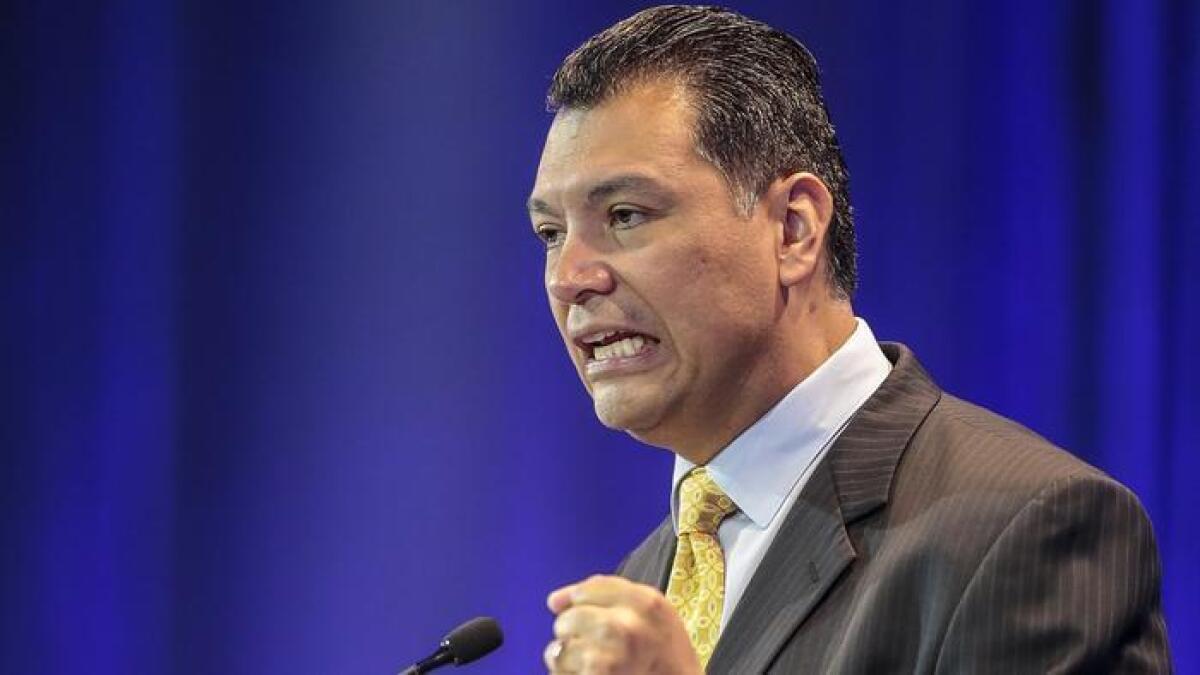
California’s chief elections officer said U.S. government officials believe Russian hackers tried to find weaknesses in the state’s election website during the 2016 campaign, but that there’s no evidence their effort was successful.
Secretary of State Alex Padilla said the Department of Homeland Security only told him on Friday of last year’s attempt. He described the attack as a “scanning” of the state’s website in hopes of finding weaknesses in its computer network.
“Our office actively monitors scanning activity as part of our routine cybersecurity protocols,” Padilla said in a statement. “We have no information or evidence that our systems have been breached in any way or that any voter information was compromised.”
Those involved were “Russian cyber actors” according to Padilla’s description of information he received from federal officials. In June, a top federal official told the Senate Intelligence Committee that systems in 21 states were believed to have been scoured by cyberattackers.
The election website, www.sos.ca.gov, contains public information about voting procedures as well as data on past election results and current issues. More sensitive data, including the electronic files of some 17 million registered voters, are not included on the website.
A leaked National Security Agency document earlier this year outlined a Russian effort to hack into devices made by a Florida-based voting software company. One California county, Humboldt, used the company’s software, but did not find any evidence of tampering.
Padilla, a frequent critic of President Trump’s special panel investigating the potential of voter fraud, said federal officials should have notified him much earlier of the attempted breach.
“The practice of withholding critical information from elections officials is a detriment to the security of our elections and our democracy,” he said.
- Share via
Antonio Villaraigosa jabs at Gavin Newsom over his apparent embrace of single-payer healthcare bill
Supporters of a measure to establish single-payer healthcare in California were thrilled by Lt. Gov. Gavin Newsom’s embrace of their bill on Friday, but a rival gubernatorial campaign was less impressed with his position.
A spokesman for former Los Angeles Mayor Antonio Villaraigosa accused the lieutenant governor of flip-flopping because after Newsom was asked if he explicitly endorsed the legislation — Senate Bill 562 — he responded that he endorsed “getting this debate going again.”
“This is an outrageous parsing of words when millions of people are at risk of losing their healthcare,” Villaraigosa spokesman Luis Vizcaino said in a statement.
“It is a yes or no question, lieutenant governor. Are you for SB 562 or not? The nurses and California voters deserve the truth,” Vizcaino added.
The question of backing SB 562 is thorny since it was shelved earlier this year after Assembly Speaker Anthony Rendon (D-Paramount) called it “woefully incomplete.” Backers have said they’d be willing to make changes to the measure, but the contours of those proposed changes have not been made public.
Vizcaino said Villaraigosa “has always supported universal healthcare and the concept of single payer,” but agreed with Speaker Rendon that the bill couldn’t be sent to the governor without a funding plan.
Speaking to reporters, Newsom said he saw a single-payer system in which the government covers healthcare costs as the best way to achieve universal coverage and said he would be “actively engaged in designing and developing it” if SB 562 does not pass next year.
RoseAnn DeMoro, executive director of the California Nurses Assn./National Nurses United, said she saw Newsom’s remarks as a clear endorsement of their measure and a stance she said was not surprising.
“We always knew Gavin would support our bill,” DeMoro said.
She lambasted Villaraigosa — who does not support SB 562 — for criticizing Newsom, whom her group endorsed nearly two years ago.
“I want Villaraigosa to explain to the Latino community why he doesn’t think they should have ... comprehensive healthcare,” she said. “Villaraigosa’s being disingenuous. He knows better. He’s just politically posturing trying to find a wedge issue and he knows better.”
UPDATE
4:32 p.m.: This post was updated with an additional statement from Villaraigosa’s spokesperson on the former L.A. mayor’s support for universal healthcare.
- Share via
In San Francisco, Bernie Sanders plays two roles: Obamacare defender and single-payer advocate
Sen. Bernie Sanders headed west to drum up support for his recently unveiled “Medicare for All” proposal Friday, but first trained his sights on the Obamacare repeal bill currently gripping Congress.
Sanders (I-Vt.), whose speech was the cornerstone of a California Nurses Assn. gathering in San Francisco, blasted the Republican plan led by Sens. Bill Cassidy of Louisiana and Lindsey Graham of South Carolina as “horrific legislation.”
“How cruel, how immoral it is, to say to those millions of Americans, we are going to take away that health insurance that keeps you alive,” Sanders said.
Sen. John McCain announced on Friday he could not support the measure, dealing the GOP plan a blow. Sanders thanked McCain for his stance, prompting the liberal crowd to cheer the Arizona Republican.
Some Democrats had worried that Sanders’ push for his single-payer plan could distract from efforts to oppose the repeal bill. But the senator was explicit in his appeal to the approximately 2,000 supporters in attendance to focus their energy on defeating the repeal measure.
“Our job is to continue to make sure the Republicans do not get the 50 votes they need ... I beg of you, please, do everything you can to stop the bill,” he said.
Still, the crux of Sanders’ speech focused on his single-payer bill, which he sold as an improvement over the status quo.
“The Affordable Care Act, as we all know, made significant improvements to our healthcare system,” Sanders said, citing the expansion of the number of Americans with health insurance and the ban on insurance companies’ ability to deny coverage to people with preexisting conditions.
“But we must be honest and acknowledge that with all the gains of the Affordable Care Act, it does not go far enough,” he added.
The bill expands the Medicare program to cover the healthcare costs of all Americans with no out-of-pocket payments for patients. The measure does not include a plan to finance such a system, but Sanders has released a report laying out various ways to cover the costs, including a progressive income tax.
During his pitch, Sanders said the implications extended beyond health policy.
“It is a struggle about what this great nation stands for,” Sanders said. “It is a struggle about whether or not every working person in this country has healthcare as a right or whether we allow insurance companies and drug companies to continue to rip us off.”
- Share via
‘Reclaiming my time’: Rep. Maxine Waters’ viral words inspire the theme of Women’s March convention
Democratic Rep. Maxine Waters has gotten a lot of attention this year as she’s pushed back on the Trump administration, earning the nickname “Auntie Maxine.” Now her words will be the theme of the new Women’s Convention.
The two-day Women’s Convention in Detroit is hoping to capitalize on the energy of January’s Women’s March, when hundreds of thousands of women marched in cities across the country the day after Trump’s inauguration. It is scheduled for the end of October, and announced this week its theme will be “Reclaiming Our Time.”
The theme refers to a heated exchange in July between Waters of Los Angeles and Treasury Secretary Steven Mnuchin during a House Financial Services Committee hearing. It began when Waters asked Mnuchin why he hadn’t responded to a letter Democrats sent him asking for information about President Trump. Committee members get a set amount of time to question a witness and Waters became frustrated that Mnuchin appeared to be skirting her question and using up her time. Waters over and over demanded “reclaiming my time” as Mnuchin tried to speak over her.
“Reclaiming my time” became a rallying cry for women, producing the requisite hashtags, memes (including a catchy gospel cover of the exchange) and merchandise like T-shirts.
Convention organizers said on Twitter that Waters gave her blessing for them to use the phrase, and that Waters is also scheduled to attend the convention.
- Share via
Graham-Cassidy Obamacare repeal plan ‘devastating,’ could cost California almost $139 billion, state officials warn
Healthcare advisors to Gov. Jerry Brown believe the latest effort on Capitol Hill to repeal the Affordable Care Act would blow a monstrous hole in the state budget, slashing federal health funds by $138.8-billion over a seven-year period.
The estimate, released Friday by the state Department of Healthcare Services, comes on the heels of increased focus on the Republican bill championed by Louisiana Sen. Bill Cassidy and South Carolina Sen. Lindsey Graham.
It is the third time since President Trump took office that GOP lawmakers in Washington have proposed changes to federal health subsidies that would downsize California’s share of federal funds. No firm estimates have been made of the number of state residents who might lose health coverage under the Cassidy-Graham proposal, though earlier efforts from congressional Republicans were estimated to put millions of Californians at risk.
“Simply stated, this proposal is the most devastating of the three federal health care proposals that we have evaluated this year,” wrote Jennifer Kent, director of the Department of Healthcare Services in a memo to Diana Dooley, the governor’s secretary of health and human services.
The report estimates a loss of $4.4 billion to the state budget in 2020 through reduced dollars for Medi-Cal, the state’s version of the federal Medicaid program. By 2026, state officials estimate the annual reduction in health dollars would grow to $22.5 billion.
That moment in time is key, say state officials, because the Senate GOP plan calls for no additional dollars under a new “block grant” healthcare funding plan beyond 2026.
“The Graham-Cassidy proposal represents a significant shift of costs from the federal government to states,” wrote Kent.
The expansion of Medicaid dollars under the Affordable Care Act has had a dramatic impact on reducing the number of uninsured people in the state. Estimates are that almost one of every three Californians is now enrolled in the Medi-Cal program.
With a $183.2-billion state budget, California would have no easy options for replacing even a portion of the missing dollars. The state is projected to have an $8.5-billion “rainy-day fund” by next summer, which would cover only a portion of the lost federal dollars and even then, only for a single year.
“Given our state’s significant population of low-income individuals,” Kent wrote, “this proposal abandons our traditional state/federal partnership and shifts billions in additional costs to California.”
- Share via
Gas tax foes win victory as they try to get a repeal on November 2018 ballot

In a rare court rebuke of the state Attorney General’s Office, a judge said Friday that the title and summary written for a proposed initiative is misleading — and that he’d do a rewrite himself to make it clear the measure would repeal recently approved increases to gas taxes and vehicle fees.
Sacramento Superior Court Judge Timothy M. Frawley said he would draft a new title and summary to be placed on petitions for the initiative after attorneys for the state and proponents of the ballot measure could not agree on compromise language.
“In this circumstance, I honestly believe that the circulated title and summary that has been prepared is misleading,” Frawley told attorneys during a court hearing Friday. He hopes to release the new title and summary by Monday.
The initiative proposed by Assemblyman Travis Allen (R-Huntington Beach) would repeal a bill approved in April by the Legislature and governor that would raise the gas tax by 12 cents per gallon and increase vehicle fees to generate $5.2 billion annually to fix the state’s roads and bridges and improve mass transit.
Allen and his attorneys said the state attorney general sought to confuse voters with a title that does not use the words “taxes” or “fees.”
The title was proposed to say: “Eliminates recently enacted road repair and transportation funding by repealing revenues dedicated for those purposes.”
Allen, who is running for governor in 2018, said the court decision showed the attorney general was trying to sway voters against the initiative.
“Justice is being served for the voters of California,” Allen said after the court hearing. “I think that he [the judge] has properly seen that the attorney general has tried to intentionally mislead the voters of California because he has tried to prejudice their vote and tried to keep increased taxes for Californians.”
A coalition of business, labor and government officials called Fix Our Roads, which supports the gas tax legislation, had representatives in the courtroom who later criticized Allen for seeking political gain at the expense of California motorists.
“This is more about Travis Allen’s gubernatorial race than anything else,” said coalition spokeswoman Kathy Fairbanks. “He’s condemning voters to driving on potholed roads and being stuck in traffic.”
Allen said the initiative and his campaign for governor are both aimed at giving voters power to fight higher taxes.
“Finally ordinary Californians are understanding that they actually can hold Sacramento accountable,” Allen said. “This is why I’m running to be the next governor of California, because for too long Sacramento has been run by out-of-touch elitists that are coming from Sacramento and the Bay Area of San Francisco.”
A second initiative to repeal the gas tax has been proposed by a different group of Republican activists.
Allen said he supports the second initiative but noted it has to collect many more signatures because it seeks to change the state constitution. “It has a long way to go,” Allen said.
If the judge issues a new title and summary Monday, Allen said the petitions will hit the streets immediately and he is confident they will get the 365,880 signatures to qualify the measure for the November 2018 ballot.
- Share via
‘We will have universal healthcare in the state of California,’ Gavin Newsom promises single-payer advocates
Lt. Gov. Gavin Newsom has made his most explicit endorsement yet of a controversial single-payer healthcare proposal that has roiled Democratic politics in California.
Newsom appeared Friday before the California Nurses Assn., the most ardent backers of SB 562, a stalled bill to establish a system in which the state would cover all residents’ healthcare costs.
“There’s no reason to wait around on universal healthcare and single-payer in California,” Newsom said. “It’s time to move 562. It’s time to get it out of committee.” The line prompted cheers and a standing ovation from the audience of about 1,500 members of the nurses’ union.
He capped off his remarks with a promise: “If we can’t get it done next year, you have my firm and absolute commitment as your next governor that I will lead the effort to get it done. We will have universal healthcare in the state of California.”
Enthusiastic nurses in the room heard an unequivocal backing of their effort to push forward with the bill.
“When he says he’s going to get this done, he means, seriously, that he will pass SB 562 and make sure that there is healthcare for all Californians,” said Catherine Kennedy, a neonatal nurse from Roseville.
But speaking to reporters after his address, Newsom was less clear in embracing the specifics of the proposal.
“I 100% support moving this process along, getting this debate going again and addressing the concerns, the open-ended issues that the nurses themselves have acknowledged as it relates to the need of going through the legislative process and to fill in the blanks on the financing plan, among other issues,” he said.
- Share via
President Obama appears in an Assembly race mailer in California — but read it closely
The race to replace Jimmy Gomez, who was elected to Congress earlier this year, has so far been waged by mail and door-knocking in northeast Los Angeles.
Most of the mailers feature local leaders and endorsements from groups including Planned Parenthood and the Sierra Club.
But one mailer that arrived in my mailbox Thursday has a much more familiar face — former President Barack Obama. While it might seem like one to the casual voter sorting through junk mail, this isn’t an endorsement.
“Want to know what kind of job Gabriel Sandoval will do in the Assembly? Listen to the people he’s worked with in the past,” the mailer reads, above Obama’s official White House portrait.
In small type, it notes that Sandoval “served as a Senior Civil Rights Attorney and Senior Advisor” for a White House initiative within the Department of Education.
It features a glowing quote over an image of a July 12, 2013, letter from the president to Sandoval written on White House letterhead.
- Share via
Healthcare a hot issue in race for California governor
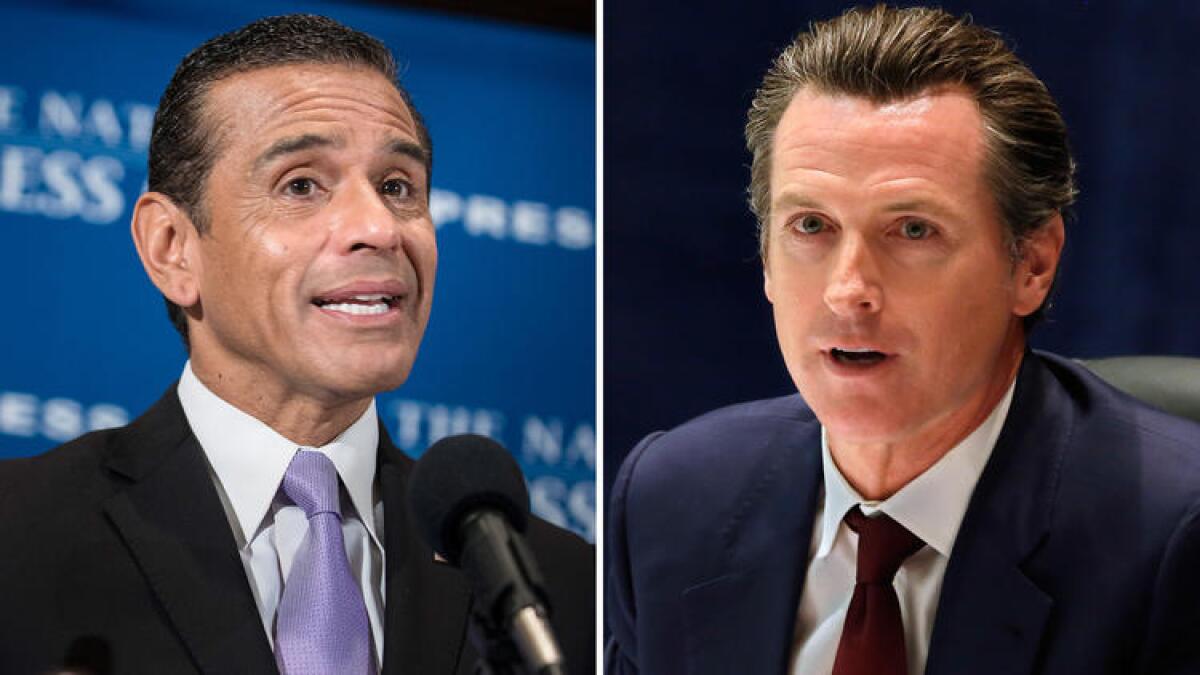
With the hyperpartisan politics surrounding healthcare stirred up by efforts to repeal Obamacare and calls for a single-payer system, both Lt. Gov. Gavin Newsom and former Los Angeles Antonio Villaraigosa are claiming the mantle of healthcare visionary.
On the campaign trail the two Democratic candidates for governor are touting their signature healthcare accomplishments from earlier in their political careers as their bona fides.
For Newsom, it’s about Healthy San Francisco, the nation’s first municipal universal healthcare program, approved while he was mayor; and for Villaraigosa, it’s Healthy Families, which provided healthcare coverage to the children of California’s working poor, legislation he authored as a California assemblyman.
But do they deserve all the credit? It sure doesn’t look that way.
Healthy San Francisco is one of the many topics Newsom is expected to highlight when he speaks to the California Nurses Assn. convention in the Bay Area on Friday morning.
On Thursday night, Newsom took a shot at the latest Republican effort in Washington to roll back the Affordable Care Act – a bill written by Sens. Lindsey Graham (R-S.C.) and Bill Cassidy (R-La.)
“The numbers on this make my skin crawl. Under Graham-Cassidy, an individual with metastatic cancer could see their premiums increase by $142,650. Diabetes? $5,600. Want to tackle the opioid crisis? Gets a lot tougher if an individual suffering from drug dependence sees their premiums go up by $20,450,” Newsom said in an email sent out by his campaign. “This is not a game. Lives are at stake.”
- Share via
Rep. Duncan Hunter calls for preemptive strike against North Korea

Rep. Duncan Hunter said that the United States needs to launch a preemptive strike against North Korea in order to prevent the rogue nation from harming the U.S. first.
“You could assume, right now, that we have a nuclear missile aimed at the United States, and here in San Diego. Why would they not aim here, at Hawaii, Guam, our major naval bases?” Hunter, an Alpine Republican, said Thursday during an appearance on San Diego television station KUSI.
“The question is, do you wait for one of those? Or two? Do you preemptively strike them? And that’s what the president has to wrestle with. I would preemptively strike them. You could call it declaring war, call it whatever you want,” Hunter continued.
Hunter, a member of a House Armed Services Committee and the subcommittee with jurisdiction over the United States’ nuclear arsenal, did not say whether the military should strike North Korea with conventional or nuclear weapons.
- Share via
Will Bernie Sanders’ push for ‘Medicare for All’ help or hinder the California effort for single-payer?
When Vermont Sen. Bernie Sanders visited Beverly Hills last May, he made a full-throated appeal for California to “lead the country” and pass a pending state proposal to establish single-payer healthcare.
On Friday, he’ll return to California for a San Francisco speech trumpeting his own higher-stakes plan — a bill to drastically overhaul the nation’s healthcare system by covering everyone through Medicare.
The push for single-payer, in which the government pays for residents’ medical care, has already rattled California’s political landscape. Now, the Sanders measure brings an additional jolt, elevating the issue to a national debate that has implications for the future direction of the Democratic Party and early jockeying in the 2020 presidential race.
- Share via
One of Jeff Denham’s Democratic challengers drops out
Republican Rep. Jeff Denham of Turlock still has at least nine challengers..
- Share via
What will Kevin de León do when his term in the California Senate expires next year?
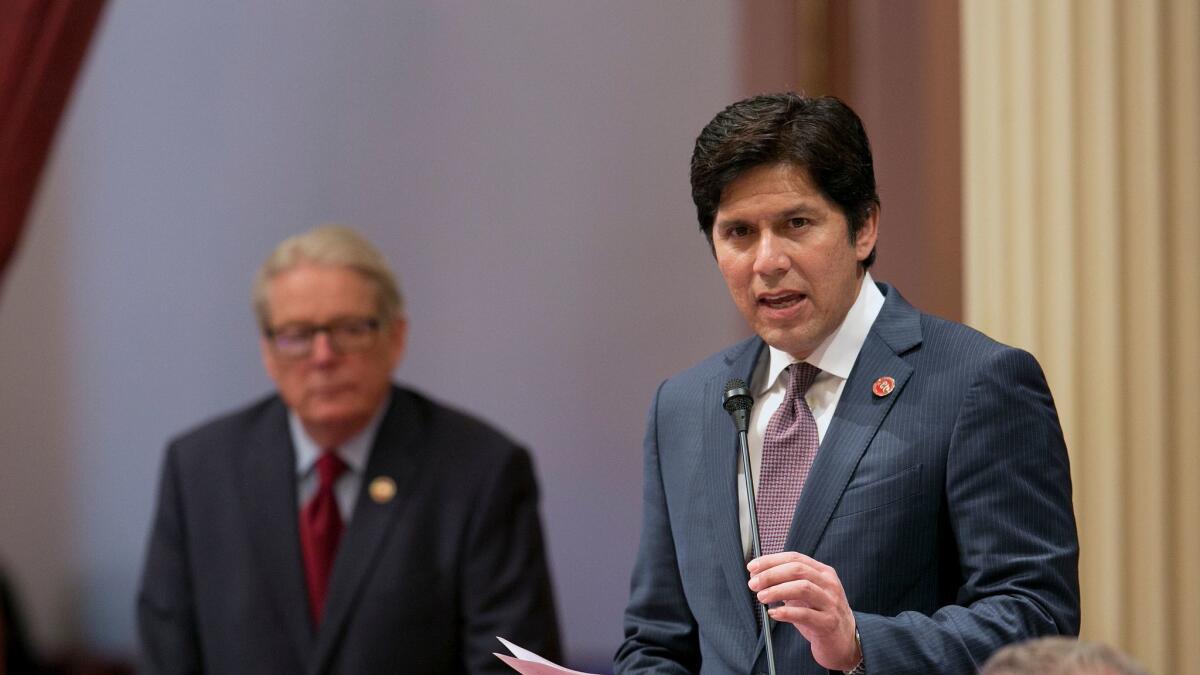
As he gaveled down what may be his last full year as leader of the California Senate on Saturday, Kevin de León had still not said what he planned to do next.
Will he run for governor or U.S. Senate? Does he want to be mayor of Los Angeles some day? De León told reporters they will have to wait to find out.
His advisors, supporters and political observers have their own ideas what De León could do next.
- Share via
‘Who the hell is Dana Rohrabacher?’ Seth Meyers asks on ‘Late Night’ as he slams the congressman
“Late Night” host Seth Meyers focused on Orange County Rep. Dana Rohrabacher on Wednesday in a segment looking at the Republican congressman’s relationship with Russia, titled “Who the Hell is Dana Rohrabacher?”
The seven-minute segment highlights Rohrabacher’s recent trip to meet with Wikileaks founder Julian Assange, who claims he has evidence Russia wasn’t involved in hacking Democratic emails during the election, then hits on some of Rohrabacher’s other more eccentric moments — his patriotic songwriting, medical marijuana use and musing about whether global warming was caused by dinosaur flatulence.
Rohrabacher’s friendliness toward Russia has drawn increased attention in recent months, especially as his name has popped up on the periphery of the House and Senate investigations into Russian attempts to interfere with the 2016 election.
Rohrabacher is one of nine Republicans whom Democrats have identified as vulnerable in California, and Rohrabacher’s 2018 opponents have tried to use the congressman’s relationship with Russia against him.
One of his challengers, biotech firm chief executive and Democrat Hans Keirstead, made a statement early Thursday on the segment.
“I, like many people in Orange County, wish we could laugh at some late-night TV and then turn it off and move on, but unfortunately Dana Rohrabacher is our representative in Congress,” Keirstead said. “For too long he has put his own career and ideology before the people of Southern California, and it’s time we had someone representing us whose No. 1 priority is the quality of life for the people in our community.”
Rohrabacher did not immediately respond to a request for comment.
- Share via
Skelton: The presidential election bills on Gov. Brown’s desk may be satisfying politics, but they’re risky ideas
Two presidential election bills are on Gov. Jerry Brown’s desk, sent to him by the Democratic Legislature. Both should be tossed in the trash.
No doubt I’m in the minority on this. These bills do offer some fun, even if they’re flawed.
One has strong pluses that are outweighed by unacceptable minuses.
The second is a mean-spirited “gotcha” bill aimed at the Democrats’ No. 1 enemy: President Trump. It may be satisfying politics, but it sets a risky precedent.
The first bill moves up California’s presidential primary from June to March. Great idea. But it also moves up the state primary along with it. A horrible idea.
The second measure would require all presidential candidates to release their tax returns for the last five years. Anyone who refused wouldn’t be allowed on the California ballot. That’s a sharp poke at Trump, who in 2016 was the first presidential candidate in 40 years not to release his taxes.
Yes, watching Trump squirm would be entertaining. And maybe the tax information would be useful for some voters. But even if the disclosure requirement were constitutional — and there’s substantial doubt about that — it’s a crummy precedent.
- Share via
This millennial is running as an independent and thinks he can unseat Orange County Rep. Dana Rohrabacher
Orange County Rep. Dana Rohrabacher officially got another challenger this week. Kevin Kensinger, 33, is an investor from Aliso Viejo and is running as an independent in the 48th Congressional District.
Kensinger, who filed papers with the Federal Election Commission this week, says he thinks using an agenda-driven campaign will appeal to members of both parties as well as the district’s growing number of voters who don’t register by party.
(Most voters who identify as independents still tend to vote for one party or another).
“We’re in a purple district that voted for Hillary [Clinton] and Dana [Rohrabacher],” Kensinger said in an interview. “I know a lot of people that could never bring themselves to pull the lever for a Democrat.”
A former Democrat himself, Kensinger says his policy proposals, which include support for single-payer healthcare and allowing states that allow legalized marijuana use to create banking structures that can accommodate the industry, will transcend the district’s 11-point voter registration advantage for Republicans.
“We’re at a crossroads where both parties seem to have lost their direction,” he said. “I believe we have the opportunity to speak to both sides of the fence in this election.”
Rohrabacher is one of nine Republicans the Democratic Congressional Campaign Committee has identified as vulnerable in California. He has faced increasing criticism for his fondness for Russia and antics such as a visit with Wikileaks founder Julian Assange and his comments on the recent violence in Charlottesville, Va.
- Share via
California Republicans have been mum on Graham-Cassidy bill so far, but this GOP challenger says he supports it
California could stand to lose the most under the Graham-Cassidy healthcare bill that would roll back the Affordable Care Act, which is perhaps why GOP members of Congress have stayed mostly silent on the Republican-backed proposal.
But one congressional challenger, Republican James Veltmeyer, called it a “major step in the right direction.”
Veltmeyer, a physician from La Jolla, is running against Rep. Scott Peters (D-San Diego) in the 52nd Congressional District. “There is a lot of good stuff in this legislation,” he said in a statement Wednesday.
The measure leaves major details to be determined and the Congressional Budget Office likely won’t have time to release a full analysis of the bill’s impacts before the Senate’s scheduled vote next week.
California’s GOP members have not indicated how they might vote if the bill makes it to the House, but all 14 of them voted in favor of repealing Obamacare earlier this year.
Veltmeyer praised the proposal to use block grants to states to fund healthcare, saying it allows states “the flexibility to run their own healthcare systems” and that the repeal of Obamacare’s individual mandate would help create jobs.
Veltmeyer, who has called Obamacare a failure, recently wrote an op-ed supporting a membership-based model of healthcare. Peters is one of four Democrats the National Republican Congressional Committee is hoping to unseat in 2018. Other candidates running in the June primary include Republicans Daniel Casara and Omar Qudrat and Democrat Alexander Miller.
- Share via
Ads target California’s GOP House members on new healthcare bill but it’s not clear who’s paying for them
Five of California’s House Republicans are being featured in new digital ads urging them to oppose the so-called Graham-Cassidy healthcare bill to roll back Obamacare.
But the newly formed group that’s running the ads isn’t saying where it’s getting the money for them.
The ads, which began running Thursday, highlight the bill’s provisions, saying they would would “gut Medicaid” and get rid of affordable coverage for patients with preexisting conditions.
The nonprofit behind them, SoCal Health Care Coalition, was formed over the last few weeks and is “supported by a diverse group of donors who believe healthcare is a criticial issue for Californians,” according to spokesman Yusef Robb.
Robb declined to identify the group’s major donors or who funded the ads. The group’s website was registered at the end of August, and its social media accounts became active last week.
They are aimed at five Republicans who are being targeted by Democrats in 2018: Rep. Darrell Issa (Vista); Rep. Steve Knight (Palmdale); Rep. Dana Rohrabacher (Costa Mesa); Rep. Ed Royce (Fullerton) and Rep. Mimi Walters (Irvine).
The video ads are part of a five-figure campaign that will reach “hundreds of thousands” of constituents in their districts, Robb said.
All 14 of California’s GOP House members voted for an earlier Obamacare repeal bill. None of them have released public statements about the newest effort, which would likely leave millions more Americans uninsured and hit states such as California the hardest.
Graham-Cassidy is first expected to face a vote in the Senate next week.
- Share via
California Senate leader preparing for legal fight over ‘sanctuary state’ legislation
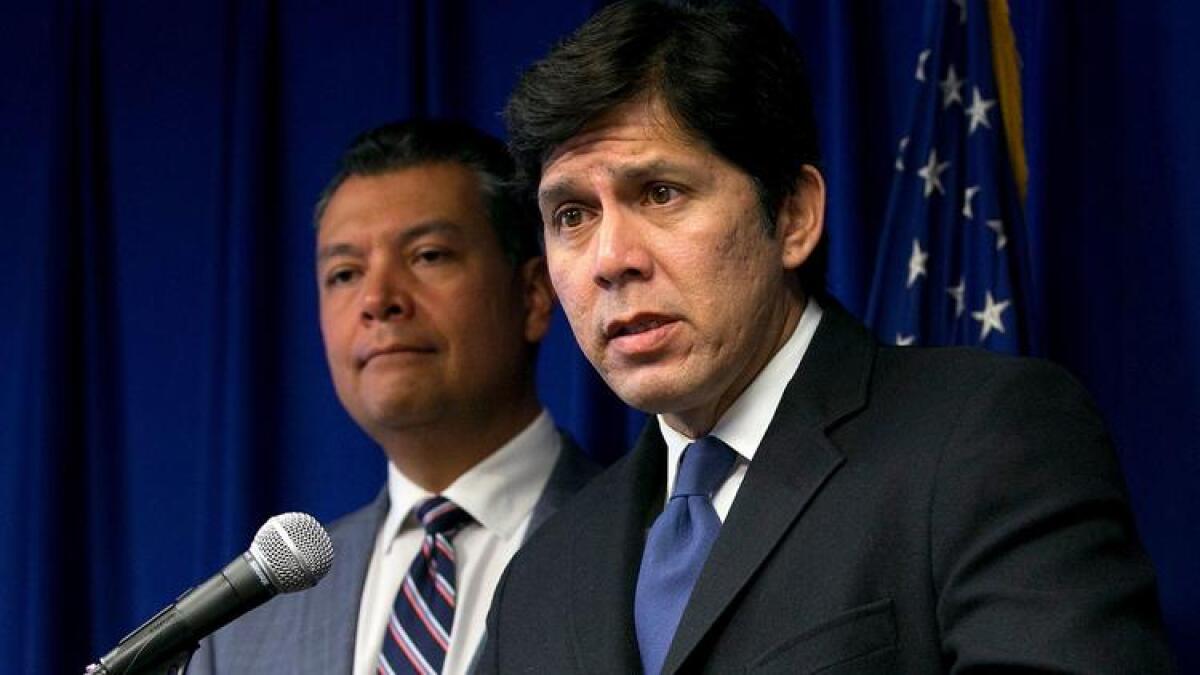
Gov. Jerry Brown hasn’t yet signed legislation making California a so-called sanctuary state, but state Senate President Pro Tem Kevin de León is preparing to defend it in court.
In between several immigration events in Washington on Wednesday, De León (D-Los Angeles) said he met with former U.S. Atty. Gen. Eric H. Holder Jr. — who has served as outside counsel to the Legislature for much of the year — “to continue to further discuss inoculating California from [U.S. Atty. Gen.] Jeff Sessions’ Department of Justice.”
Passed early Saturday by the Legislature, the sanctuary state bill would limit state and local law enforcement communication with federal immigration authorities and prevent officers from questioning and holding people on immigration violations.
Sessions has threatened to withhold some federal grant funds from cities and counties that refuse to assist federal immigration agents.
Holder and other former Justice Department lawyers believe the bill is defendable, and if the Trump administration tries to compel California cities to act by withholding funds, it will find itself in court, De León said. Defenders of so-called sanctuary cities often rely on a 1996 Supreme Court ruling that cited the 10th Amendment and found the federal government can’t compel local governments to cooperate with enforcing federal laws.
“It is immoral, and quite frankly un-American, that America’s top law enforcement official would withhold dollars that our local police officers need — precious dollars we need desperately to counter terrorism, to deal with the issue of human trafficking as well as international drug cartels,” De León said.
On Tuesday, Sessions urged Brown not to sign the bill, calling it “unconscionable” and a threat to public safety. Brown responded to Sessions’ comment on CNN by calling the legislation well-balanced.
“It protects public safety, but it also protects hardworking people who contribute a lot to California,” Brown said. He has until Oct. 15 to sign the bill.
De León also shot back against Sessions’ statement that the federal money isn’t an “entitlement,” saying Californians pay more in federal taxes than they receive in federal funding.
“That’s not a gift or a grant from the Department of Justice to California. Those are our dollars; they belong to the people of California,” he said.
- Share via
California, with alliance of states, pledges to keep pushing climate policies despite lack of federal progress
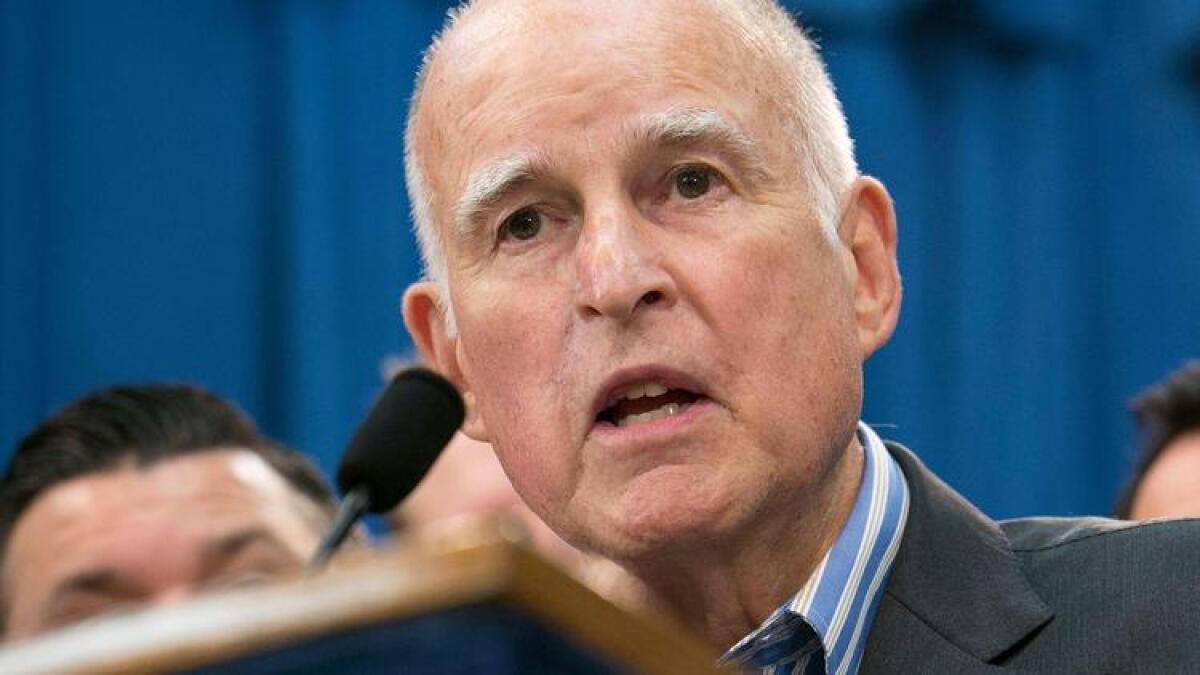
California and a growing alliance of states committed to fighting global warming said Wednesday that they’re slashing greenhouse gas emissions at the rate required by the Paris climate agreement.
However, the rest of the country would need to join their effort for the United States to actually hit the target of cutting emissions by at least 26% below 2005 levels by 2025.
President Trump has pledged to pull the country out of the Paris deal, but the states reiterated their pledge to keep pressing forward during a news conference in New York.
“We’re all in,” California Gov. Jerry Brown said. “Eventually, Washington will join with us. You can’t deny science forever.”
California’s climate goal is even more ambitious than the Paris target. A law signed by Brown last year requires the state to cut emissions to 40% below 1990 levels by 2030.
California became a founding member of the U.S. Climate Alliance, along with New York and Washington state, months ago.
“Either we end this problem, or this problem will end us,” said New York Gov. Andrew Cuomo.
On Wednesday, North Carolina became the 15th member of the U.S. Climate Alliance. Other members include Massachusetts, Oregon and Puerto Rico.
“Clean air and a healthy environment are vital for a strong economy and a healthier future,” North Carolina Gov. Roy Cooper, a newly elected Democrat, said in a statement.
- Share via
Bay Area cities sue major oil companies over climate change

San Francisco and Oakland are suing to get five oil companies, including San Ramon-based Chevron, to pay for the cost of protecting the Bay Area from rising sea levels and other effects of global warming.
“These fossil fuel companies profited handsomely for decades while knowing they were putting the fate of our cities at risk,” San Francisco City Atty. Dennis Herrera said in a statement.
The lawsuits, which were filed Tuesday in state court in San Francisco and Alameda counties and announced Wednesday, don’t ask for a specific dollar amount. But the cities could try to put oil companies on the hook for billions.
Long-term improvements in San Francisco’s seawall are projected to cost $5 billion, according to one of the lawsuits.
“The law is clear that the defendants are responsible for the consequences of their reckless and disastrous actions,” Oakland City Atty. Barbara J. Parker said in a statement.
A spokesman for Chevron, Melissa Ritchie, said the lawsuits would not help address climate change.
“Reducing greenhouse gas emissions is a global issue that requires global engagement and action,” she said in a statement. “Should this litigation proceed, it will only serve special interests at the expense of broader policy, regulatory, and economic priorities.”
- Share via
California sues to stop Trump’s border wall: ‘No one gets to ignore the laws. Not even the president’

California Attorney General Xavier Becerra announces lawsuit against Trump Administration.
California Atty. Gen. Xavier Becerra filed a lawsuit Wednesday alleging that President Trump’s proposal to expedite construction of a wall at the U.S.-Mexico border violates laws aimed at protecting the environment.
Becerra announced the legal challenge standing in front of the existing border fencing at Border Field State Park near San Diego, saying the federal government failed to comply with federal environmental laws and relied on federal statutes that don’t authorize border wall projects in San Diego and Imperial counties.
“No one gets to ignore the laws. Not even the president of the United States,” Becerra said. “The border between the U.S. and Mexico spans some 2,000 miles. The list of laws violated by the president’s administration in order to build his campaign wall is almost as long.”
He said the project involves the improper waiver of 37 federal statutes, many aimed at protecting the environment.
Filed in federal court in San Diego and including the California Coastal Commission as a plaintiff, the lawsuit states its purpose is “to protect the State of California’s residents, natural resources, economic interests, procedural rights, and sovereignty from violations of the United States Constitution” and federal law.
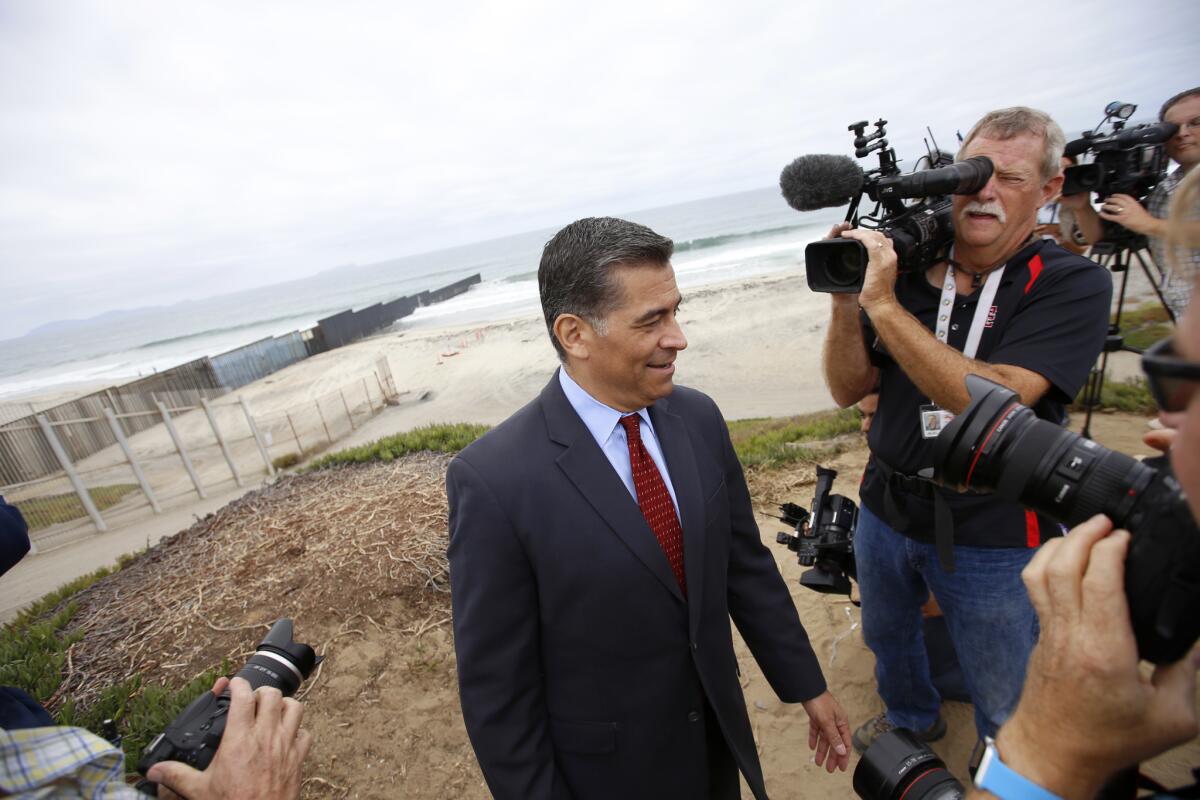
The lawsuit also alleges that federal officials have not shown any data suggesting new border barriers in the San Diego area will reduce illegal entry into the U.S., nor that there is a significant problem in that area.
It adds that the wall would have a chilling effect on tourism to the United States from Mexico.
In August, the U.S. Department of Homeland Security issued a notice that it was waiving federal and state laws on the environment to expedite the construction of prototypes of the wall along the San Diego border with Mexico.
The California lawsuit claims the federal government violated the U.S. Constitution’s separation-of-powers doctrine “by vesting in the Executive Branch the power to waive state and local laws.”
The lawsuit also says the Department of Homeland Security decided to build the walls without complying with the Clean Water Act, the National Environmental Policy Act and the Coastal Zone Management Act.
As a result, the lawsuit alleges, the federal government lacks proper environmental analysis of the impact of the 400-foot prototypes of the wall currently planned, as well as the 2,000-mile-long final wall.
A federal official declined comment.
“As a matter of policy, we do not comment on pending litigation,” said Tyler Q. Houlton, a spokesman for the Department of Homeland Security.
State Assemblywoman Lorena Gonzalez Fletcher (D-San Diego) stood with Becerra at the event, saying the wall is unnecessary and will put a barrier between relations involving the two countries.
“Maybe to people in Iowa, it sounds like a really good idea,” she said. “We don’t need more structure. We need a good relationship [with Mexico].”
Times staff writers McGreevy reported from Sacramento and Ulloa from San Diego.
- Share via
California to sue Trump administration over plan for U.S.-Mexico border wall
California Atty. Gen. Xavier Becerra plans to announce a lawsuit Wednesday on behalf of the state that will challenge President Trump’s proposal to build a wall at the U.S.-Mexico border, a project Becerra has called “medieval.”
Becerra is scheduled to travel to Border Field State Park near San Diego to announce that a lawsuit is being filed in federal court over construction of border wall projects in San Diego and Imperial counties.
The lawsuit, which includes the California Coastal Commission as a plaintiff, states its purpose is “to protect the State of California’s residents, natural resources, economic interests, procedural rights, and sovereignty from violations of the United States Constitution” and federal law. It adds that the wall would have a chilling effect on tourism to the United States from Mexico.
The state’s lawsuit alleges that the Trump administration has failed to comply with federal and state environmental laws and relied on federal statutes that don’t authorize the proposed projects. The brief alleges the federal government violated the U.S. Constitution’s separation-of-powers doctrine “by vesting in the Executive Branch the power to waive state and local laws, including state criminal law.”.
The lawsuit also says the Department of Homeland Security decided to build the walls without complying with the Clean Water Act and the National Environmental Policy Act.
As a result, the lawsuit alleges, the federal government lacks proper environmental analysis of the impact of 400-foot prototypes of the wall currently planned, as well as the 2,000-mile-long final wall.
The Democratic attorney general has been critical of the wall for months, including in April during an appearance on ABC’s “This Week.”
“I’m still trying to figure out who believes that a medieval situation to fix our broken immigration system is what we need,” Becerra said.
He also accused Trump at the time of reneging on his promise to have Mexico pay for the wall.
“I think American taxpayers probably are very much aligned with Mexico. None of them, whether it’s Mexico or our taxpayers, wants to pay for a medieval wall,” he said.
This is the latest of more than two dozen lawsuits and legal briefs filed against the Trump administration by Becerra, who was appointed attorney general in January and is running for election to the post next year. He previously sued to challenge Trump’s plans to end a program that protects young immigrants from deportation, ban immigration from some countries and roll back environmental laws.
Last week, three advocacy groups sued the federal government to block construction of a border wall, alleging that the Trump administration overstepped its authority by waiving environmental reviews and other laws.
The action by the Sierra Club, Defenders of Wildlife and Animal Legal Defense Fund seeks to prevent construction of wall prototypes in San Diego. U.S. Customs and Border Protection officials said last month that prototypes for a border wall may be completed by the end of October.
Becerra’s lawsuit is the latest attempt by California Democrats to fight the wall proposal. A bill that would have banned state government contracts for any company that helps build the wall passed the state Senate, but stalled recently in an Assembly committee.
Sen. Ricardo Lara (D-Bell Gardens) authored the bill, testifying at a committee hearing that “the wall is another attempt to separate and divide us. It sends a message that we are better off in a homogenous society.”
Todd Bloomstine, a lobbyist representing the Southern California Contractors Assn., opposed the bill, asking the panel, “What next unpopular project would be [on the] blacklist?”
UPDATE
8:30 a.m. This article was updated to provide additional details of the lawsuit.
This article was originally published at 6 a.m.
- Share via
Judge rules state used misleading language in summary of ballot measure to repeal California gas tax
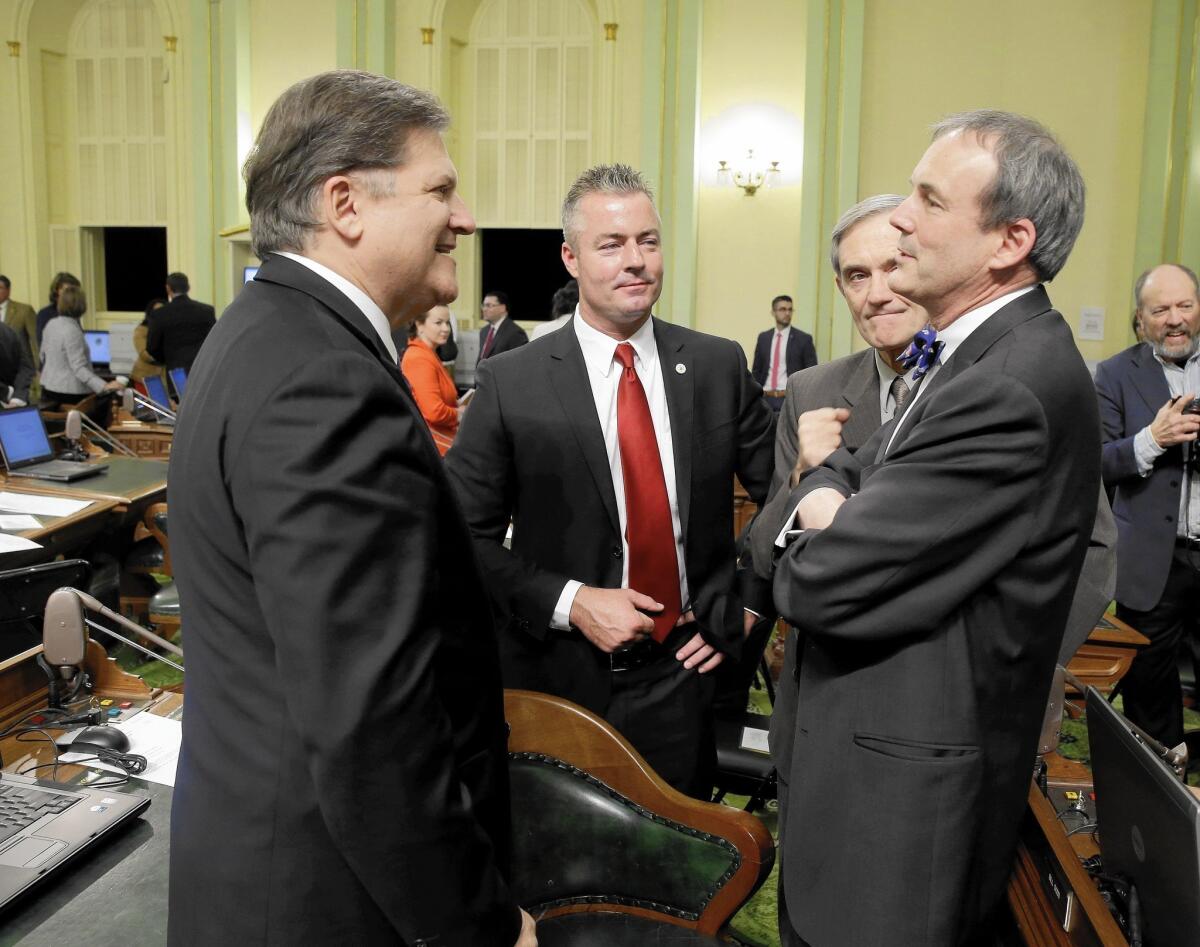
A judge tentatively ruled Tuesday that the state-written title and summary of an initiative to repeal the recent gas-tax increases were misleading and should be rewritten by the state attorney general’s office.
The ruling by Sacramento Superior Court Judge Timothy M. Frawley, scheduled to be finalized at a court hearing on Friday, was welcomed by the initiative’s lead proponent, Assemblyman Travis Allen (R-Huntington Beach).
“This preliminary ruling is a major victory for Californians,” Allen, a candidate for governor, said in a statement. “This brings us one step closer to repealing Jerry Brown’s hugely unpopular gas tax. I look forward to the final ruling on Friday, and ensuring that the Repeal the Gas Tax Initiative receives the straightforward ballot title and summary that it deserves.”
Judge Frawley agreed with Allen’s legal claims that the title and summary drafted by Atty. Gen. Xavier Becerra’s office is “confusing, misleading, and likely to create prejudice against the proposed measure.”
The judge said the initiative would repeal taxes and fees approved by the Legislature this year, but the title and summary issued by the state makes it sound like it would eliminate transportation funding without using the words “taxes and “fees” in the title.
He ordered state officials to come to Friday’s hearing prepared to discuss alternate language for the ballot measure.
“To avoid misleading the voters and creating prejudice against the measure, the Attorney General must prepare a ‘true and impartial statement’ that reasonably informs voters of the character and real purpose of the proposed initiative in clear and understandable language,” the ruling says. “The existing circulating title and summary fails this test.”
If the judge finalizes the order after hearing arguments Friday, Allen can use the new title and summary to circulate a petition. Allen needs to collect 365,000 signatures from registered voters in 150 days to put the measure on the November 2018 ballot.
- Share via
Gov. Jerry Brown: Trump’s rhetoric about North Korea adds to “non-rational bluster”
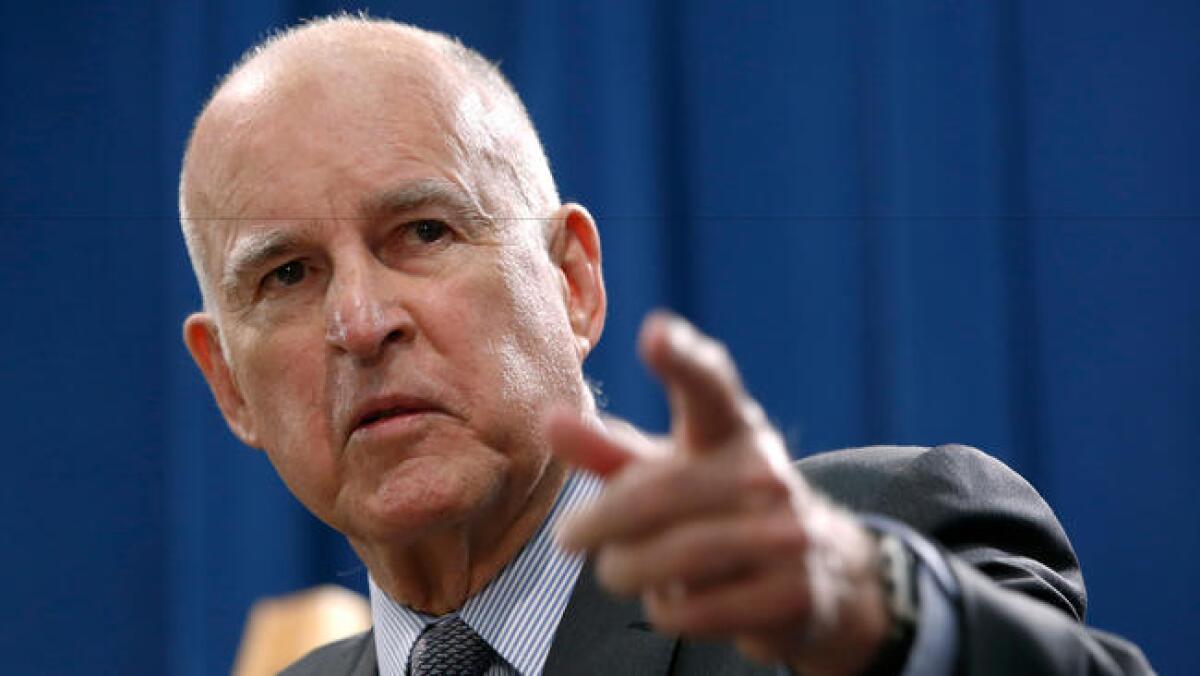
California Gov. Jerry Brown said President Trump’s name calling and threats at the United Nations can get in the way of diplomacy and statesmanship.
Earlier Tuesday, Trump called North Korean leader Kim Jong Un a “Rocket Man on a suicide mission” and said the United States may have no choice but to “totally destroy North Korea.”
“It just raises the temperature and the exchange of non-rational bluster back and forth,” Brown said in a interview with CNN’s Jake Tapper. “I don’t think that’s positive.”
Brown is in New York for some climate meetings related to the United Nations General Assembly.
- Share via
Villaraigosa to address PAC that typically supports GOP candidates
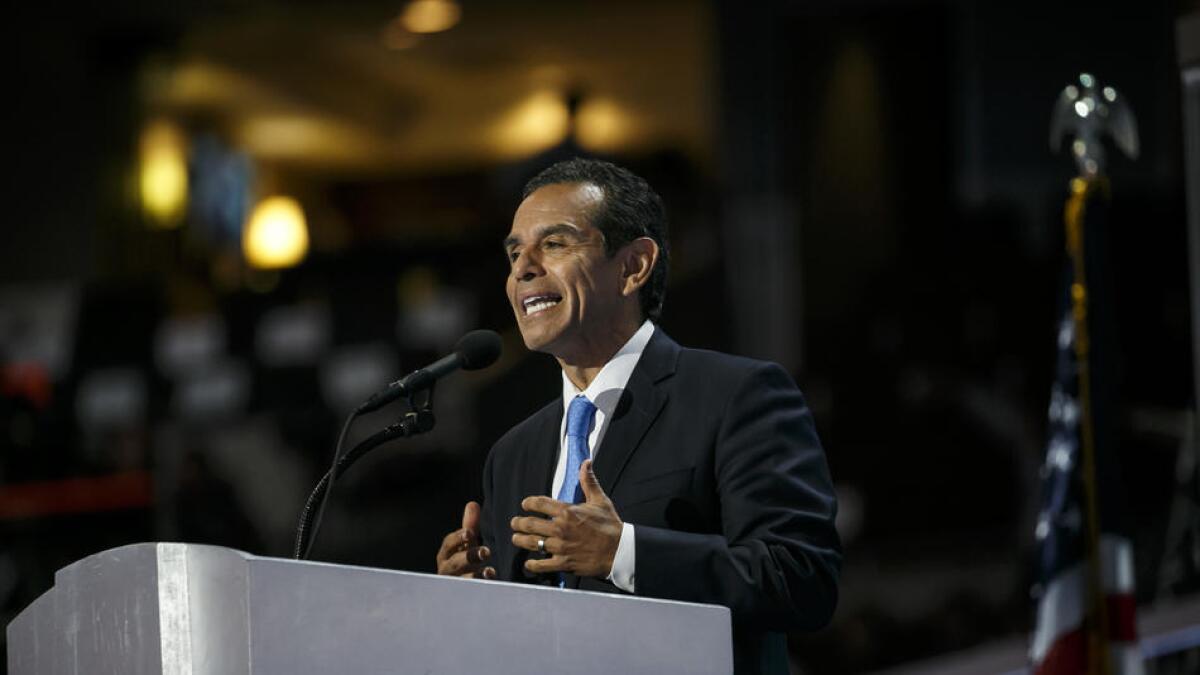
Antonio Villaraigosa, one of the top Democrats running for governor, will address a group Wednesday that typically supports Republican candidates.
Tickets to see the gubernatorial candidate speak at a breakfast meeting hosted by the Fresno Chamber of Commerce’s Political Action Committee cost $40, money that supports the group’s mission of electing pro-business candidates.
“We need the right people making decisions for the community. The PAC endorses the most business-friendly candidate and raises money to get them elected. Donations to the PAC are used for candidate contributions, independent expenditures, or for the promotion of the endorsed candidates,” according to the group’s website.
The PAC has made $31,350 in political donations since 2006, according to the financial disclosure documents filed with the secretary of state’s office. Of that, all but $1,500 was donated to Republican candidates. Among the recipients were Chuck Poochigian, who received $1,000 in his unsuccessful run for attorney general in 2006 against now-Gov. Jerry Brown; then-Fresno Mayor Ashley Swearengin, who received $3,000 for her unsuccessful 2014 state controller bid, and state Sen. Andy Vidak, who received $6,100 over multiple election cycles.
Nathan Ahle, president and chief executive of the PAC, said that all of the major gubernatorial candidates will be invited to address the group.
Villaraigosa, the former mayor of Los Angeles, has spent a notable amount of time campaigning in the Central Valley, once a GOP stronghold that is now more politically mixed and a region where Democrats are not as rigidly liberal on economic and environmental issues as coastal and Bay Area voters. The economic recovery has also not taken hold as strongly in the Central Valley as it has in other parts of the state, an inequity frequently raised by Villaraigosa on the campaign trail.
“The mayor is taking his campaign for economic opportunity and economic equality to every corner of California,” campaign spokeperson Michelle Jenny said.
Updated at 7:45 p.m.: This post was updated with a response from the Villaraigosa campaign.
- Share via
Yes, ‘dahlink’: Frederic Prinz von Anhalt, widower of Zsa Zsa Gabor, is running for California governor

Frederic Prinz von Anhalt, widower of the whimsical celebrity and actress Zsa Zsa Gabor, is back.
Von Anhalt has filed to run for governor of California — his second attempt after a short-lived campaign in 2010 — saying he’s fed up with seeing roads falling apart, people struggling to afford rent and an explosion of homelessness in the state.
“I’ve lived in this city for 36 years. I’ve never seen so many people eating out of a trash can in the Western world,” Von Anhalt said Tuesday. “We talk about Hollywood, and this being the entertainment center of the world. How is this possible?”
Von Anhalt, Garbor’s ninth and last husband, is running as an independent. He filed an official “Candidate Intention Statement” with the California Secretary of State’s office Monday, the first step in launching an official campaign.
The 74-year-old Bel-Air resident, a German immigrant, said he has enough money to help support his own campaign. He said he dropped out of the 2010 governor’s race only because his wife became seriously ill. She died in December.
“She was the one … who wanted me run,” Von Anhalt said.
Von Anhalt also flirted briefly with a run for Los Angeles mayor in 2013, a race eventually won by Eric Garcetti.
FOR THE RECORD
5:33 p.m.: An earlier of this post said Von Anhalt was age 71. He is 74.
- Share via
Assemblyman urges other legislatures to join California in censuring President Trump
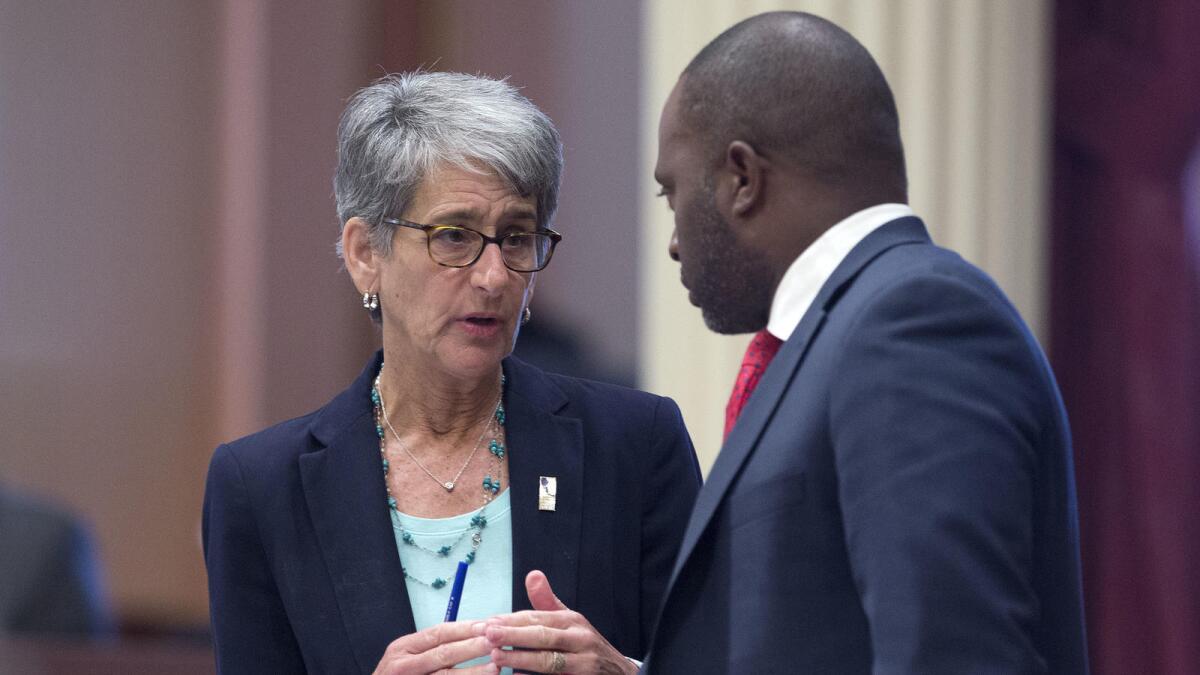
A California lawmaker who authored a resolution to support a censure of President Trump sent letters to 49 other state legislatures Tuesday to urge them to join the effort.
Assemblyman Tony Thurmond, a Richmond Democrat, sent the letters days after the Assembly became the first state legislative body to support a congressional censure of the president.
“California has spoken and we look to the rest of the nation to join us,” Thurmond said in a statement. “It’s important that all our states unite and show that the United States of America stands against hate.”
- Share via
California’s attorney general asks Senate for more tools to fight online sex trafficking
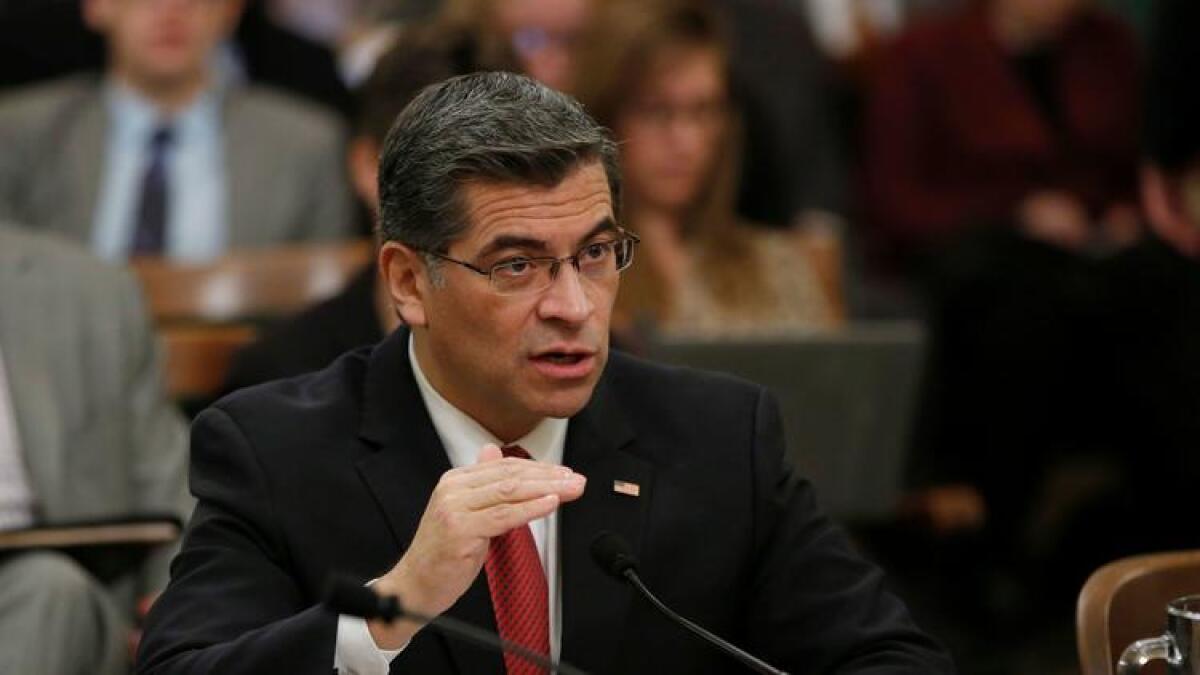
California Atty. Gen. Xavier Becerra pleaded with a U.S. Senate committee on Tuesday to change a decades-old Internet freedom law in order to give states more power to go after online sex traffickers.
“We’re losing the fight against sex trafficking, which means we’re losing our children,” Becerra said.
Some in Silicon Valley have pushed back on the idea for years, saying that it would be a disaster for a free and open Internet to change the 1996 Communications Decency Act so websites can be held liable by states and victims if criminal material is posted on their sites.
The Stop Enabling Sex Traffickers Act would allow states and victims to sue websites that “knowingly” assist or benefit from sex trafficking. The federal government currently can pursue criminal charges against sites, but Becerra argued that the Department of Justice doesn’t have the resources to pursue every incident.
California’s U.S. senators have been walking a fine line with the California-centered tech industry over the issue, and neither is among the 28 co-sponsors of the bill. Spokespersons for Sens. Dianne Feinstein and Kamala Harris indicated the senators want more tweaks to the bill’s language, but haven’t said what changes they’d need in order to support the bill.
Harris’ lack of support was noted during Tuesday’s hearing, with several senators saying they were working with her to address her concerns. Harris championed changing the Communications Decency Act when she was California’s attorney general, and brought a suit against Backpage.com executives on charges of pimping, money laundering and conspiracy.
Becerra left Congress to replace Harris as attorney general and has continued the state’s suit against the classified advertising giant.
Late last month, a Sacramento Superior Court judge threw out the pimping charges, citing the exemption written into the Communications Decency Act.
“The Internet has become an easy way to make money in this criminal enterprise, and we need the tools to go after these folks,” Becerra said. “We’re fighting with two hands tied behind our back.”
After the hearing, he indicated that he understands his former congressional colleagues have had to balance Silicon Valley interests with the fight against sex traffickers, and said, “Everyone has got to get there in their own way.”
5:05 p.m.: This post was updated to clarify that Harris is working with the committee on a change to the bill’s language.
It was originally posted at 2:40 p.m.
- Share via
Feinstein criticizes Trump for using U.N. speech ‘as a stage to threaten war’

Sen. Dianne Feinstein (D-Calif.) criticized President Trump for using his speech to the United Nations General Assembly on Tuesday “as a stage to threaten war.”
It’s the second time this week Feinstein has been harshly critical of Trump. On Monday, she said he needed to “grow up” and stop obsessing over former rival Hillary Clinton.
Feinstein got flak from some progressive Californians last month when she called for “patience” in dealing with the president, saying that Trump could be a good president if he learned and changed.
- Share via
After cap-and-trade vote, Assemblyman Chad Mayes faces a second Republican challenger for reelection
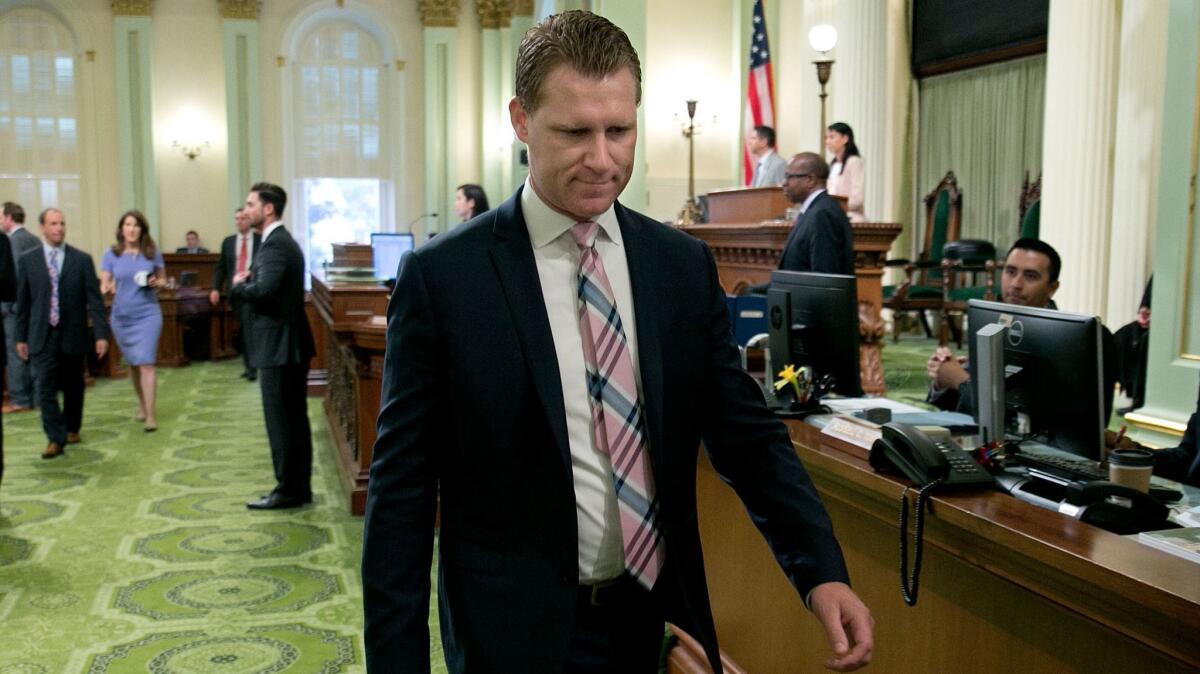
Former Palm Springs Police Chief Gary Jeandron on Tuesday became the second Republican to announce plans to challenge Assemblyman Chad Mayes (R-Yucca Valley) in the 2018 election.
Jeandron, a La Quinta resident, said he was angered over Mayes’ vote as Assembly Republican leader to support an extension of the state’s controversial cap-and-trade program, which requires businesses to buy permits to release greenhouse gas emissions. Jeandron saw the action as continuing a “wrongful tax increase” and said he is signing a no-tax pledge.
“I just don’t believe [Mayes] has held Republican values,” Jeandron told The Times. “He has been blinded by ambition. He has been seduced by the governor.”
Mayes’ vote led to an outcry by Republican leaders, and he eventually succumbed to pressure to step down as leader of the Assembly Republicans.
Mayes defended his position, telling colleagues during the floor debate, “many of us believe that climate change is real and … we have to work to address it.”
Jeandron, who lost to Mayes in the 2014 election, joins San Jacinto City Councilman Andrew Kotyuk in planning to challenge Mayes for the 42nd Assembly District seat.
- Share via
Republican John Cox tasted political defeat many times before launching his bid for California governor
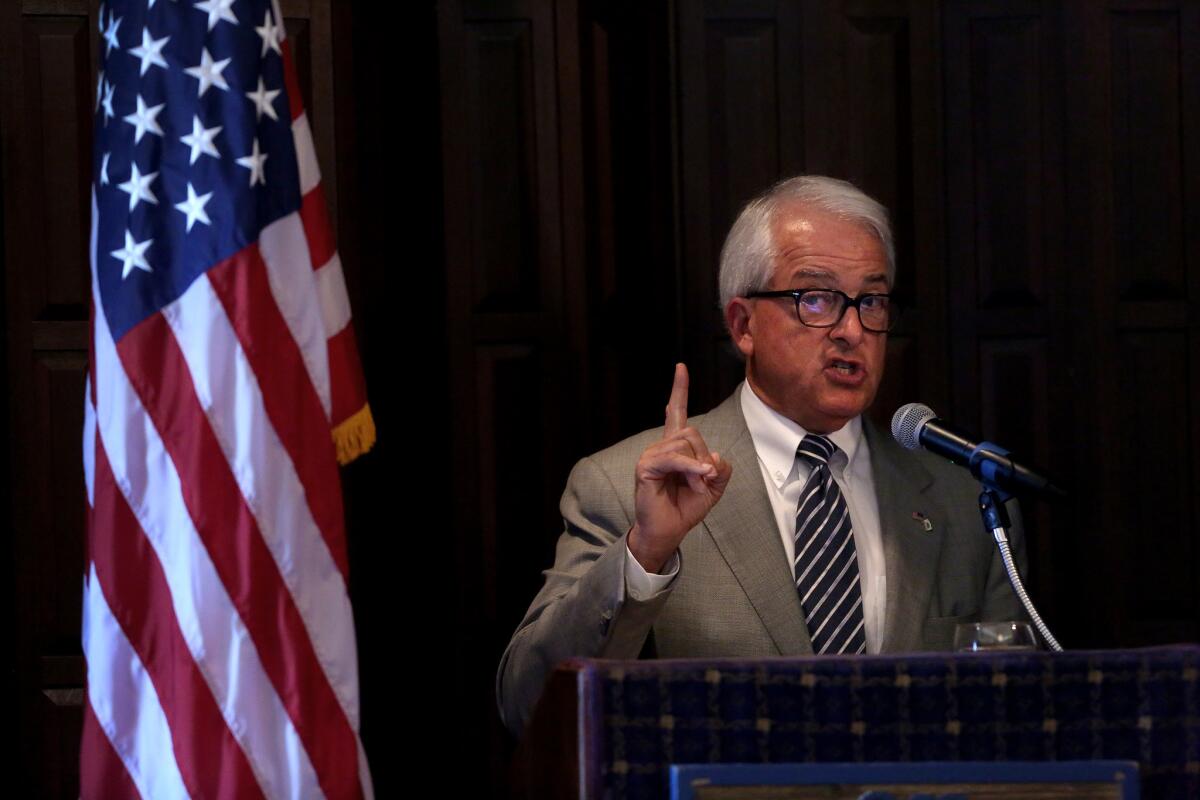
Candidate for California governor John Cox is relatively new to the state’s politics, but Cox has run for office multiple times, and even tangled with Barack Obama on the debate stage when the pair ran in the 2004 Illinois U.S. Senate race.
Neither candidate was considered their party’s favorite. But things began looking up for Obama, of course, who won the Senate race and then the presidency. Cox dropped out before the GOP primary election. It was his third try for elected office in Illinois and his third defeat.
Now he’s back, this time in his new home of California, running for governor against a trio of Democratic heavyweights. Once again, Cox is a practical unknown. Once again, the Republican is in a left-leaning state reaching for a coveted political office. Once again, Cox’s campaign is being fed by cash from his own bank account.
- Share via
After she was confronted by protesters, Pelosi says Democrats want a ‘clean’ Dream Act — with no border wall
House Minority Leader Nancy Pelosi on Monday said she understood the fear in young protesters who shouted her down at a San Francisco news conference, asking for a legal path to citizenship for themselves and their parents.
Speaking at Sacramento State hours after the disruption, Pelosi said she agreed with the protesters, pointing to the Dream Act as only the first step to broader immigration reform.
“We are all disrupters ourselves,” she said, standing next to fellow congressional Democrats. “So we recognize it and respect it in others.”
Both press events were scheduled by Pelosi to discuss a legislative fix to help thousands of young people affected by President Trump’s decision to rescind the Deferred Action for Childhood Arrivals program. The Obama-era policy provided temporary status for 800,000 people brought to the country illegally as children.
Pelosi and Senate Minority Leader Chuck Schumer of New York met with Trump last week after the termination of DACA was announced.
In Sacramento, Pelosi said they had come to an agreement to a “clean” Dream Act, which would provide a path to permanent status for citizens who work, study or serve in the military, without tougher border enforcement or increased deportations.
Meanwhile, Democrats are fighting with the president over the construction of a wall along the U.S-Mexico border. And House Speaker Paul Ryan of Wisconsin “has made it clear he wants some kind of border security,” Pelosi said.
“That is not under discussion,” she said. “We can discuss other issues, but we are not going to discuss how we protect the Dreamers.”
- Share via
Feinstein, who called for patience with Trump, lashes out over his attacks on Clinton
Sen. Dianne Feinstein (D-Calif.) said it was “appalling and disgusting” to see President Trump retweet a video edited to look like he hit former rival Hillary Clinton in the head with a golf ball.
“He continues to obsessively lash out at her — at his rallies, with his words and now through social media — in a manner that is utterly unbecoming of the president of the United States,” Feinstein said in a statement Monday. “Every one of us should be offended by the vindictive and candidly dangerous messages the president sends that demean not only Secretary Clinton, but all women. Grow up and do your job.”
Clinton is out with a new book about the campaign, and Trump has repeatedly used Twitter to deride her as a sore loser. He retweeted the animated GIF Sunday which shows him hitting a golf ball that then knocks down Clinton.
Feinstein, who has yet to say whether she’ll run again in 2018, has walked a fine line with Trump in recent months. She’s criticized him at times, but drew ire from some progressive Californians last month when she called for “patience” in dealing with the president, saying that Trump could be a good president if he learned and changed.
- Share via
Democrats want to replace DACA with the Dream Act, a bill this L.A. member of Congress has been pushing for 16 years
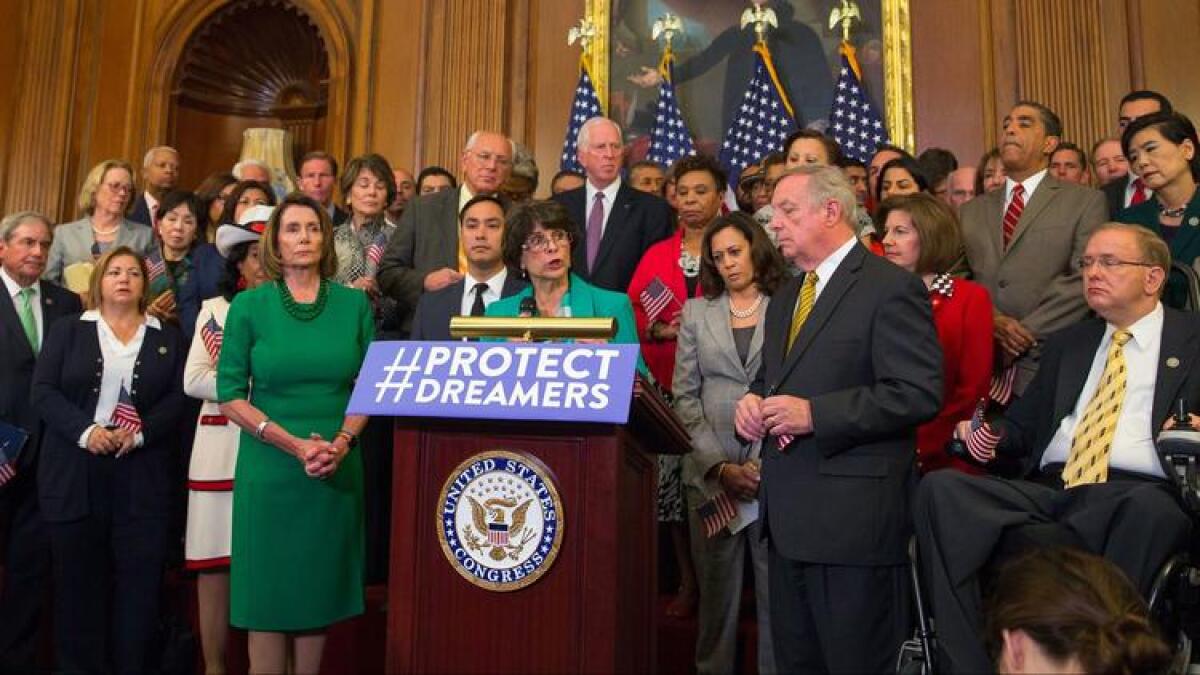
Sixteen years ago, Downey Rep. Lucille Roybal-Allard helped file legislation that would have allowed people brought to the country illegally as children to stay in the United States.
That bill became the Dream Act. Its failure to pass Congress led to the Deferred Action for Childhood Arrivals program, which President Trump this month decided to end as he urged Congress to find a replacement.
If Democrats have their way, DACA’s replacement will look a lot like what Roybal-Allard proposed in 2001. Democratic leaders emerged from a meeting with Trump last week saying Roybal-Allard’s bill, which includes a path to citizenship for some immigrants in the country illegally, must be part of Congress’ plan to protect DACA recipients.
- Share via
Bigger tax breaks for homeowners and renters could be on California’s 2018 ballot
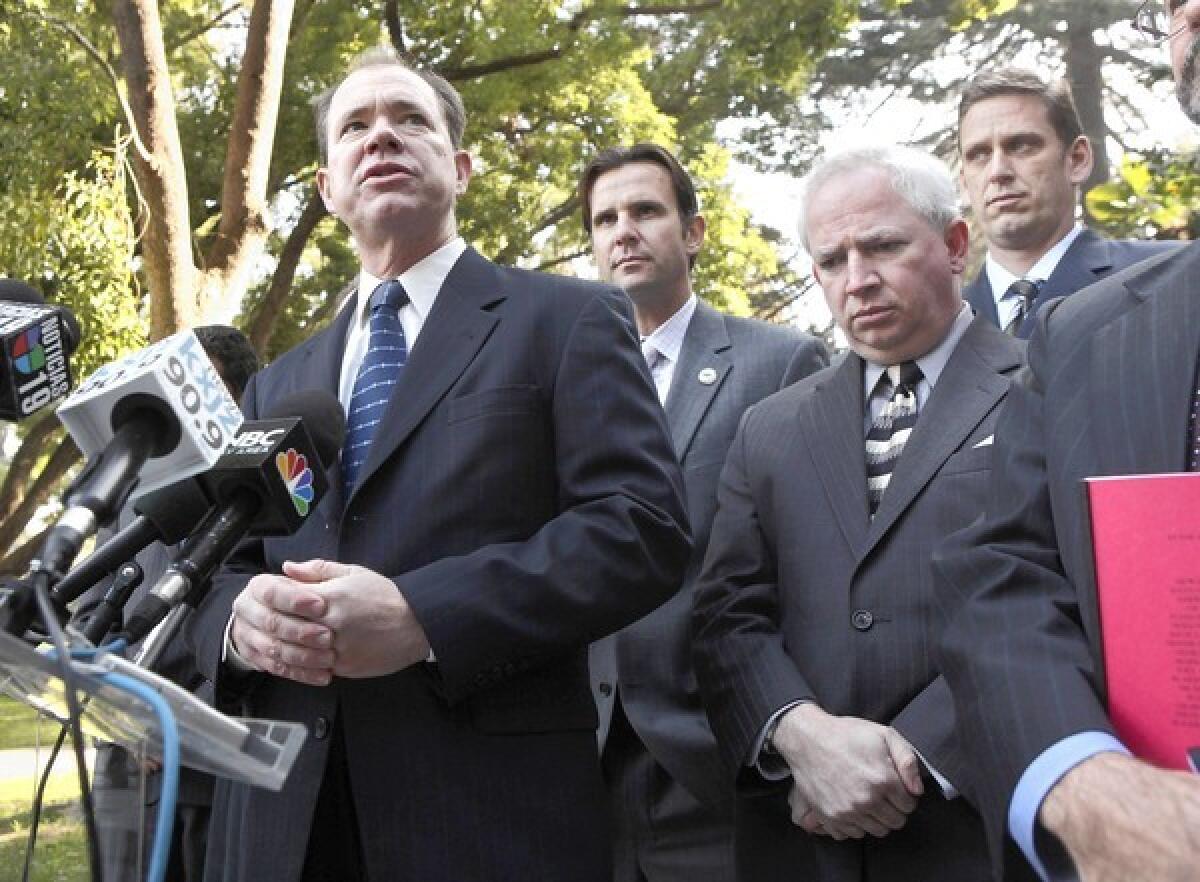
California homeowners and renters could receive more tax breaks under a proposed initiative for the November 2018 state ballot.
The measure would increase a state tax credit for homeowners and renters to $500 a year, which would continue to go up as housing costs rise. The Howard Jarvis Taxpayers Assn., the anti-tax group behind Proposition 13’s property tax restrictions, is sponsoring the initiative.
Currently, homeowners receive a $70 annual credit and renters $60. Neither figure has increased in more than 25 years, according to the association.
Jon Coupal, the association’s president, contrasted its approach to rising housing costs with the recent package of bills passed by the Legislature to spend more on low-income housing construction and ease local home building regulations.
“While the government seeks to address the housing crisis with more regulations, more government costs and more debt, we believe this is the most efficient way to provide immediate tax relief for every Californian who has to pay for a roof over their head,” he said.
Coupal said his organization plans to conduct polls to test the initiative’s viability before deciding if it will finance a signature-gathering campaign. The association also is considering an effort to repeal the gas tax hike that lawmakers approved in the spring.
The proposal is one of many housing-related measures that could appear on the November 2018 ballot. The California Assn. of Realtors is considering an effort to expand Proposition 13’s property tax breaks. And Gov. Jerry Brown is expected to place on the ballot a $4-billion bond to finance low-income housing construction and provide home loans for veterans after lawmakers approved it last week.
- Share via
San Diego members of Congress team up for Tijuana sewage spill fix
- Share via
California lawmakers are building a wall against President Trump’s policies
California state legislators ended their annual session the way they began it — building a wall to protect undocumented immigrants from President Trump.
Not an iron wall, as Trump promised to erect along the U.S.-Mexico border, but a legal barrier to prevent local police and sheriffs from teaming with the president’s agents to enforce federal immigration law.
The legislators did a lot of other things, too, before adjourning early Saturday until January.
They sent Gov. Jerry Brown bills to address California’s dearth of affordable housing, to borrow $4 billion for parks and waterworks, to spend $1.5 billion in greenhouse-gas pollution fees, to provide tuition-free community college for first-year students and to lift some secrecy from prescription drug pricing.
Earlier in the session, the heavily Democratic Legislature passed its boldest, most controversial bill of the year: A $5.2-billion annual increase in fuel taxes and vehicle fees to finance transportation infrastructure, especially to repair crumbling highways. Republicans will attempt to repeal the bill at the ballot box in 2018. Brown says that “borders on insanity.”
- Share via
Trump is ‘riding a very dead horse’ on climate change, Gov. Brown says at New York conference
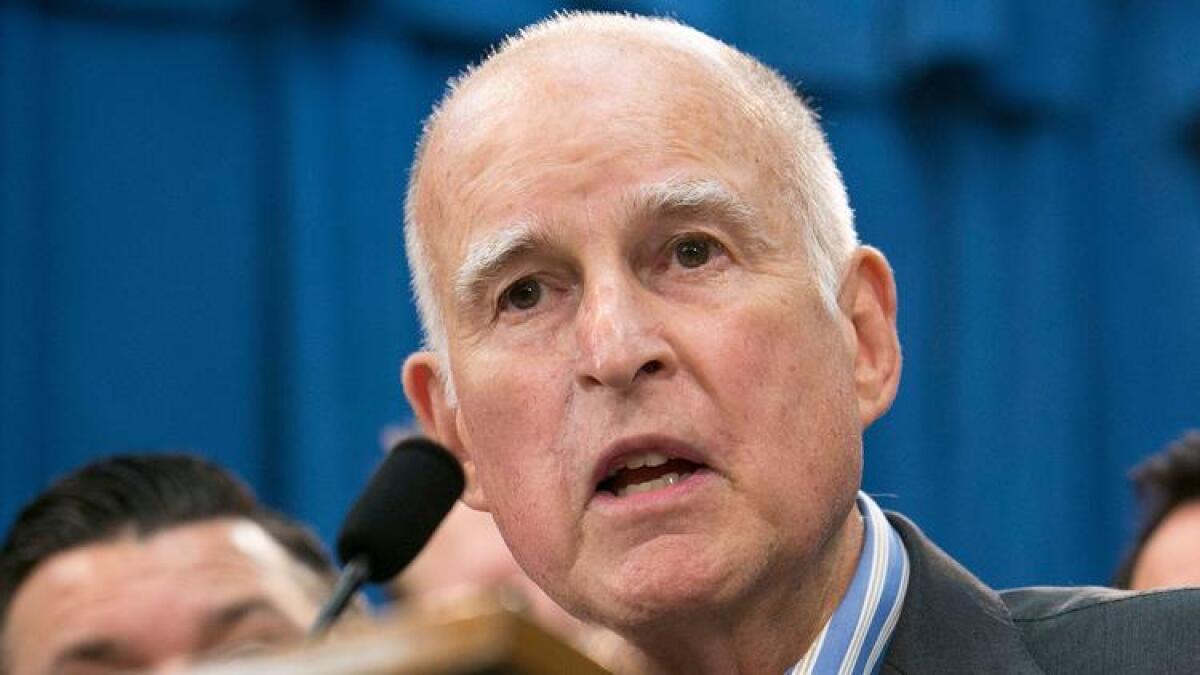
Gov. Jerry Brown on Monday touted steps California has taken toward a healthier climate, but warned that powerful forces he called “climate deniers” are resisting technologies and policies designed to improve conditions.
“I like all the optimism around here, but I don’t want to minimize the steep hill that we have to climb,” Brown said at the start of a gathering of international leaders called Climate Week NYC. “Decarbonizing the economy when the economy depends so totally on carbon is not child’s play. It’s quite daunting.”
Hosted by the Climate Group, an international nonprofit organization that works with business and government to promote clean technologies and policies, the event was scheduled to bring together high-profile governors, executives of Fortune 500 companies and leaders of multinational businesses for a week to share their strategies in tackling climate change.
The discussions come amid concerns about global warming and after Hurricanes Harvey and Irma caused devastation in Houston, Florida and across parts of the Caribbean. Some scientists believe that warmer ocean waters caused by climate change are creating stronger storms.
- Share via
Nancy Pelosi shouted down at DACA news conference for working with Trump
More than four dozen immigration activists upset with Democrats for negotiating with President Trump shouted down House Minority Leader Nancy Pelosi at a San Francisco news conference Monday.
“We are not your bargaining chip,” the crowd chanted at one point, according to KCBS News political reporter Doug Sovern.
San Francisco Chronicle reporter Evan Sernoffsky said on Twitter that some in the group were yelling, “All of us or none of us.” Other reporters said the group chanted, “Shut down ICE.”
Pelosi held the news conference to advocate for speedy passage of a legislative fix to the legal status of hundreds of thousands of people brought to the country illegally as children.
Pelosi and Senate Minority Leader Charles E. Schumer of New York met with Trump last week after he announced an end to the Deferred Action for Childhood Arrivals program. The Obama-era program deferred deportation for some people brought to the country illegally as children.
Pelosi and Schumer said their discussion with the president included the possibility of adding more immigration enforcement — which some immigration advocates are against — to legislation to address DACA.
At the news conference, Pelosi first made remarks and introduced an immigrant in the country illegally, at which point the shouting began, according to a Pelosi aide. The group surrounded Pelosi, with some gesturing close to her face. She attempted to calm the crowd for about half an hour before leaving the news conference. The aide said the group was made up of local DACA beneficiaries.
“We need to have a conversation, but that was completely one-sided; they don’t want any answers,” Pelosi told reporters afterward, according to a transcript.
Pelosi said the activists should be focused on Republican members of Congress, not Democrats.
“I understand their frustration, I’m excited by it as a matter of fact, but the fact is they’re completely wrong. The Democrats are the ones who stopped their assault on ‘sanctuary cities,’ stopped the wall, the increased deportations in our last bill that was at the end of April, and we are determined to get Republicans votes to pass the clean Dream Act. Is it possible to pass a bill without some border security? Well we’ll have to see. We didn’t agree to anything in that regard, except to listen,” Pelosi said.
UPDATES
1:06 p.m.
This post was updated with more details throughout and quotes from Pelosi.This post was originally published at 12:12 p.m.
- Share via
Today’s newsletter: California’s nasty gram to Trump
Today’s Essential Politics newsletter catches you up real quick on everything that happened at the close of the legislative session. It had a whole lot to do with President Trump.
The newsletter comes out Mondays, Wednesdays and Fridays.
Are you a subscriber? Sign up below.
- Share via
Doctor running against Rep. Ed Royce wins endorsement of group trying to elect scientists
- Share via
Gov. Jerry Brown, at New York climate event, says Trump’s actions are ‘stupid’ and ‘dangerous’
- Share via
Democrats’ hopes of flipping seats in California are soaring, but it won’t be as easy at it seems
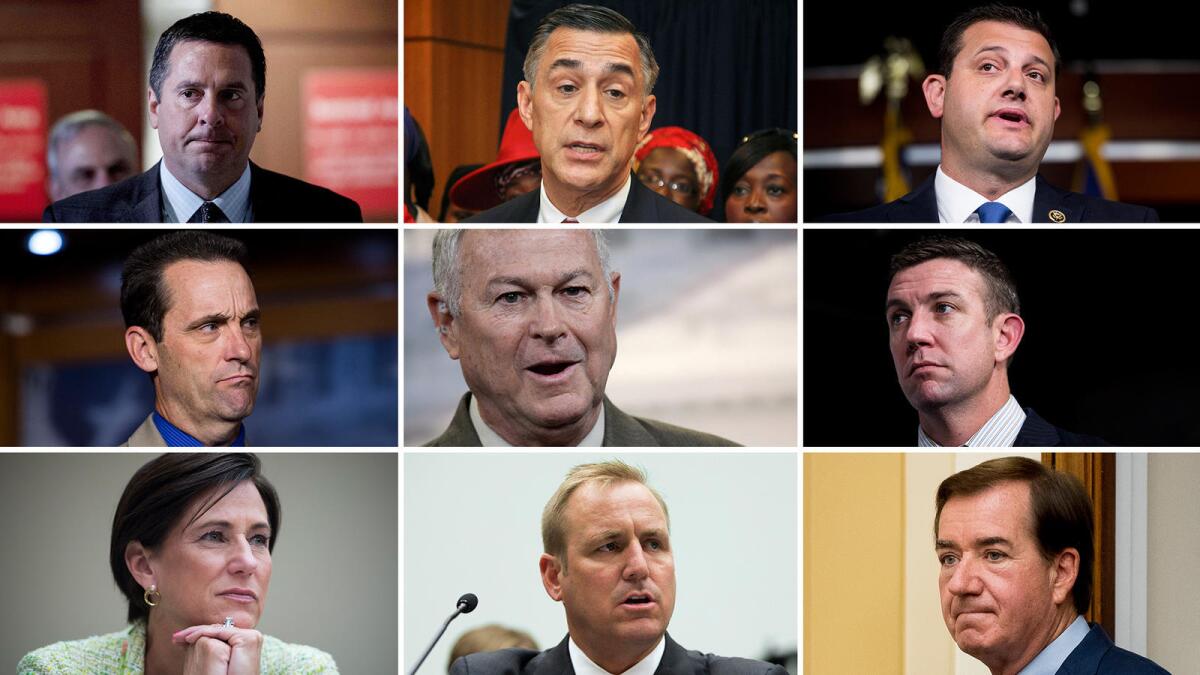
Democrats know they have to win at least a few seats in California if they want to regain control of the House in 2018. But though the energy and hopes of many Democratic activists here are soaring, flipping Republican-held seats here could be harder than it appears.
There are a few bits of conventional wisdom that suggest Democrats have a long road ahead. For one, Republicans often turn out in greater numbers than their Democratic counterparts in midterm-election years.
And even though Hillary Clinton won seven of the Republican-held districts Democrats are now targeting, past election data show voters there still lean much more conservative than other parts of the state.
If past is prologue, says Rob Pyers, research director for the nonpartisan election guide California Target Book, Democrats will have a hard time picking up more than a couple of seats in California.
With most voters unlikely to tune in until at least next spring, there are many factors that could affect the political calculus, including whether the California Republican Party will be able to field a competitive candidate for governor, or whether ballot initiatives such as a potential repeal of the newest gas tax hike will propel GOP voters to the polls.
- Share via
California will be the ‘keeper of the nation’s future’ in the era of Trump, state Democratic lawmakers promise
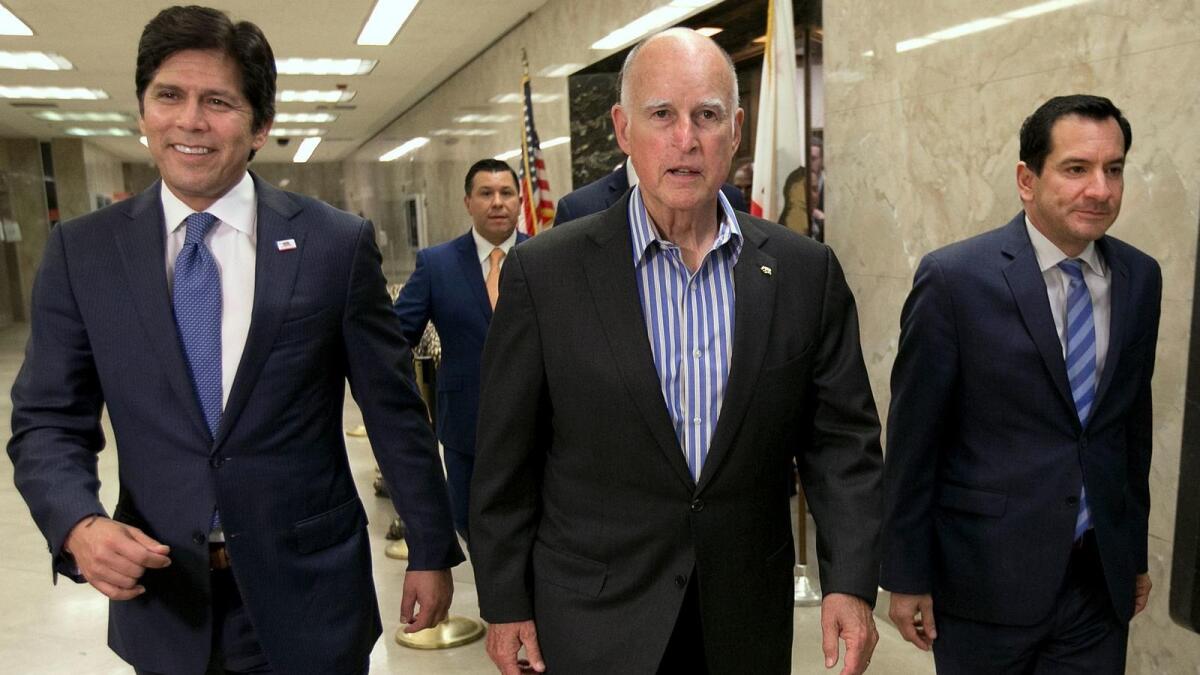
Within a day of President Trump’s election last November, California’s top Democratic lawmakers responded with a joint statement that contained an audacious promise. It was their state, not Washington, D.C., that would be the “keeper of the nation’s future.”
An artistic rendering of that vow, with looping calligraphy and a roaring grizzly, is now on display in the offices of Senate leader Kevin de León and Assembly Speaker Anthony Rendon. In the wake of Trump’s win, the words seemed to be a sort of foundational document — California’s declaration of resistance.
That pugilistic posture is often conveyed in shorthand: California versus Trump. But the ensuing legislative year, which ended Friday, revealed the messy reality of squaring up against the federal government.
“It’s been challenging,” De León (D-Los Angeles) said, bleary-eyed as he took a break during the final days of the session. “You have to debate, you have to negotiate, you have to make your case, and I think at the end of the day, we’ll still have the most far-reaching policy in the nation.”
- Share via
California Politics Podcast: Lawmakers leave Sacramento after a busy year
From immigration issues to housing, some of the biggest debates of the Legislature’s nine-month session happened at the very end.
In governing, as in life, deadlines often make things happen.
On this week’s California Politics Podcast, we take an early look at some of the most important decisions lawmakers made in the final few days of the 2017 session in Sacramento. That includes a landmark decision to intervene in the issue of illegal immigration, and to pass a long discussed package of bills to begin addressing California’s housing crisis.
We also look at some of the broader political themes of the entire legislative year -- most notably, the effort by Democrats in the Legislature to provide a “resistance” to actions taken by President Trump.
I’m joined by Times staff writers Melanie Mason and Liam Dillon.
- Share via
Gov. Jerry Brown signs bills that spend climate change cash, expand rules for marijuana shop owners
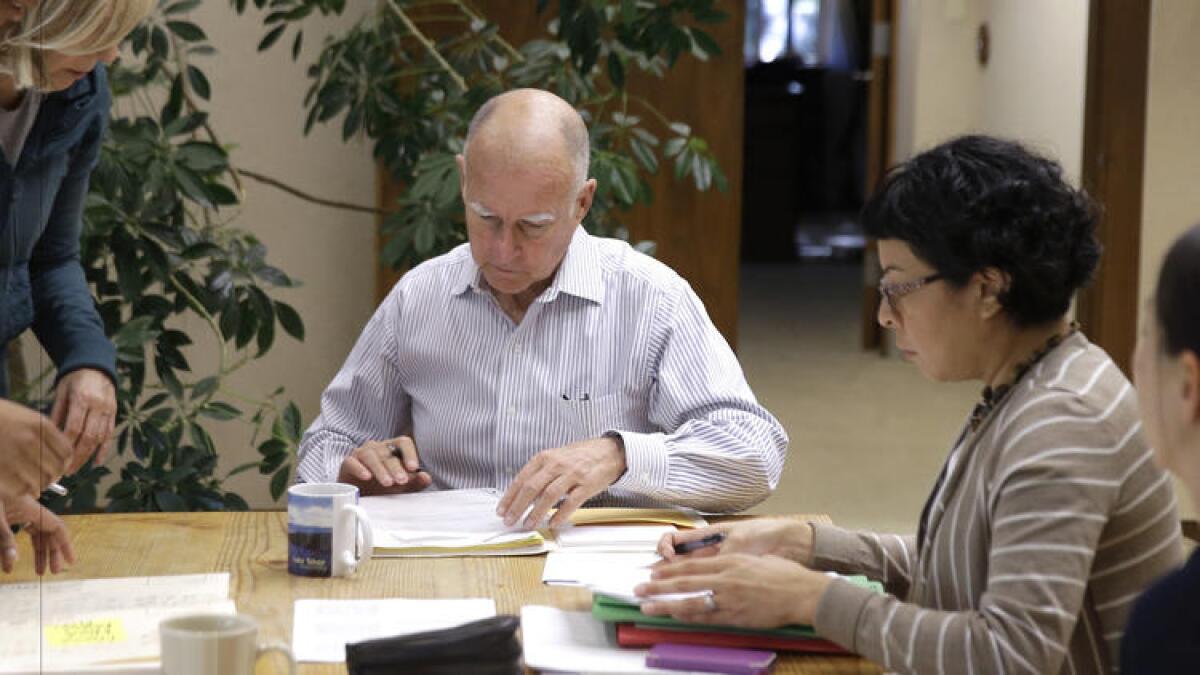
A detailed plan for spending more than $621 million collected through California’s climate change program was signed into law by Gov. Jerry Brown on Saturday, along with new rules on the sale of medical and recreational marijuana.
Brown signed seven bills, all related to the state budget, just hours after the Legislature sent them to his desk in its final day of the 2017 session.
The climate money, raised through California’s sale of greenhouse gas pollution credits, represents the bulk of a $1.5 billion spending agreement between the governor and Democratic legislative leaders earlier in the week.
Brown also signed a bill on Saturday to allow a single store to be used by both medical and recreational marijuana distributors. The stores would also be able to run a manufacturing operation at the same site, and businesses could group together multiple licenses for pot cultivation in one facility.
- Share via
Passage of ‘sanctuary state’ bill draws rebukes from Trump administration officials, praise in California
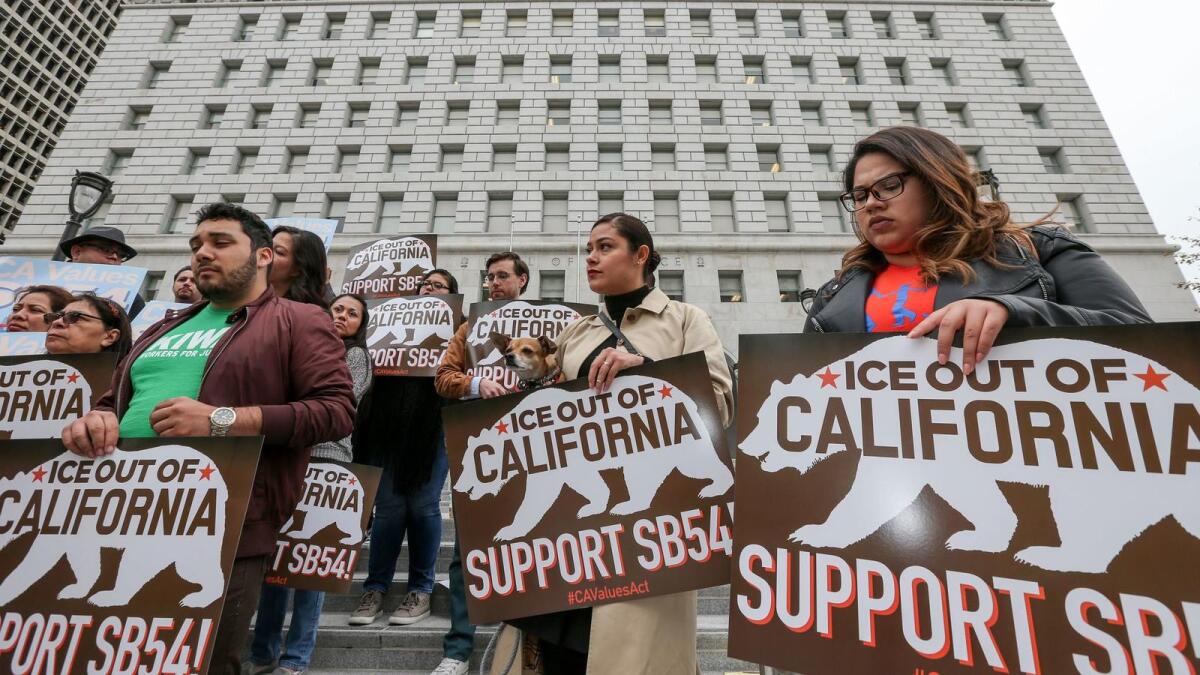
California lawmakers on Saturday passed a “sanctuary state” bill to protect immigrants without legal residency in the U.S., part of a broader push by Democrats to counter expanded deportation orders under the Trump administration.
The landmark legislation by Sen. Kevin de León (D-Los Angeles) would limit state and local law enforcement communication with federal immigration authorities, and prevent officers from questioning and holding people on immigration violations. But the bill sent to Gov. Jerry Brown drastically scaled back the version first introduced, the result of tough negotiations between Brown and De León in the final weeks of the legislative session.
Its passage already is reverberating across the country. Trump administration officials have sounded off in opposition. And immigrant rights groups and some California law enforcement officials have come out in support of what they call a hard compromise.
- Share via
Supporters unable to resurrect California clean-energy proposal on final day of legislative session
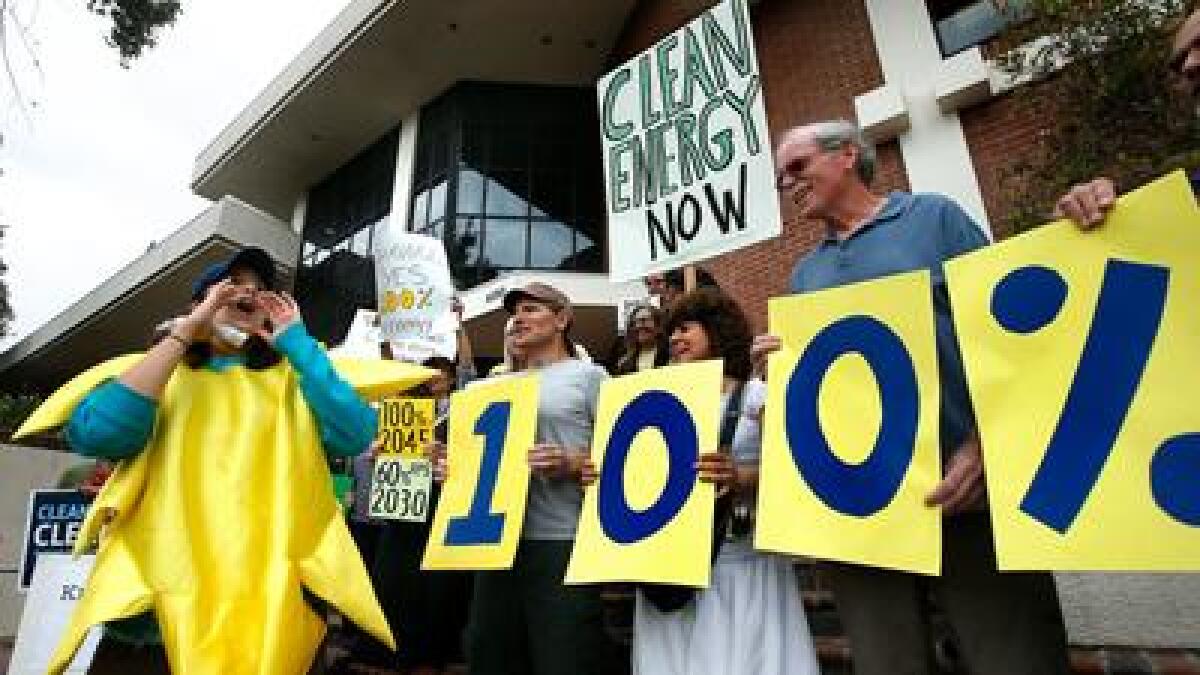
Despite a last-minute push from environmentalists and actors from “The Avengers,” legislation that eventually would require all of California’s electricity to come from clean sources failed to advance this year.
Facing opposition from unions and utilities, Assembly leadership refused to put the measure, SB 100, up for a vote on Friday, the final day of the legislative session.
“The decision to not move the bill this year is disappointing,” said Kathryn Phillips, director of the Sierra Club’s California chapter. “But we are committed to moving this policy next year. There’s no time to waste.”
The measure, written by Senate President Pro Tem Kevin de León (D-Los Angeles), was one of two major pieces of energy legislation to stall this year. The other, a proposal from Gov. Jerry Brown to integrate California’s electricity grid with other states in the region, also failed to generate the support necessary this week.
- Share via
Closely watched California Internet privacy bill dies in final minutes of legislative session

California lawmakers on Saturday shelved a bill that would have required Internet service providers such as Verizon, Comcast and AT&T to get permission from customers before using, selling or allowing access to their browser history.
The legislation by Assemblyman Ed Chau (D-Monterey Park) would have enshrined in state law some federal Internet privacy regulations that were rolled back this year by President Trump and Congress. The regulations limited what broadband providers can do with their customers’ data.
The defeat capped a behind-the-scenes battle that pitted telecom companies against state Internet service providers (ISPs) and brought other bills to a halt in the state Senate as negotiations unfolded over legislation that would have had national significance.
Most of the “California Privacy Act” would have codified the repealed restrictions crafted by the Federal Communications Commission under the Obama administration.
But it also would have barred Internet service companies from refusing to provide service or limiting service if customers do not waive their privacy rights. And it would have prohibited them from offering customers discounts in exchange for waiving their privacy rights or charging customers a penalty for refusing to do so.
The bill had the support of former FCC Chairman Tom Wheeler and smaller California ISPs. Opponents — which included tech giants like Google — argued it was being rushed through the legislative process.
For ISPs that are already complying with the former federal regulations, the bill would haven’t made much of a difference operationally, said Ernesto Falcon, legislative counsel for the Electronic Frontier Foundation, a digital rights group based in San Francisco. But the influence of the legislation could have been sweeping.
“California is a critical state because you are covering a large part of the nation just because of its population,” he said. “It sets the stage for other states to follow suit.”
For now, efforts to implement the rules could move to the ballot box. A ballot initiative proposed this month would give California consumers the right to know what personal information businesses are collecting, what they do with it and to whom they are selling it.
- Share via
It’s a wrap for the California Legislature for 2017. Here’s what lawmakers accomplished
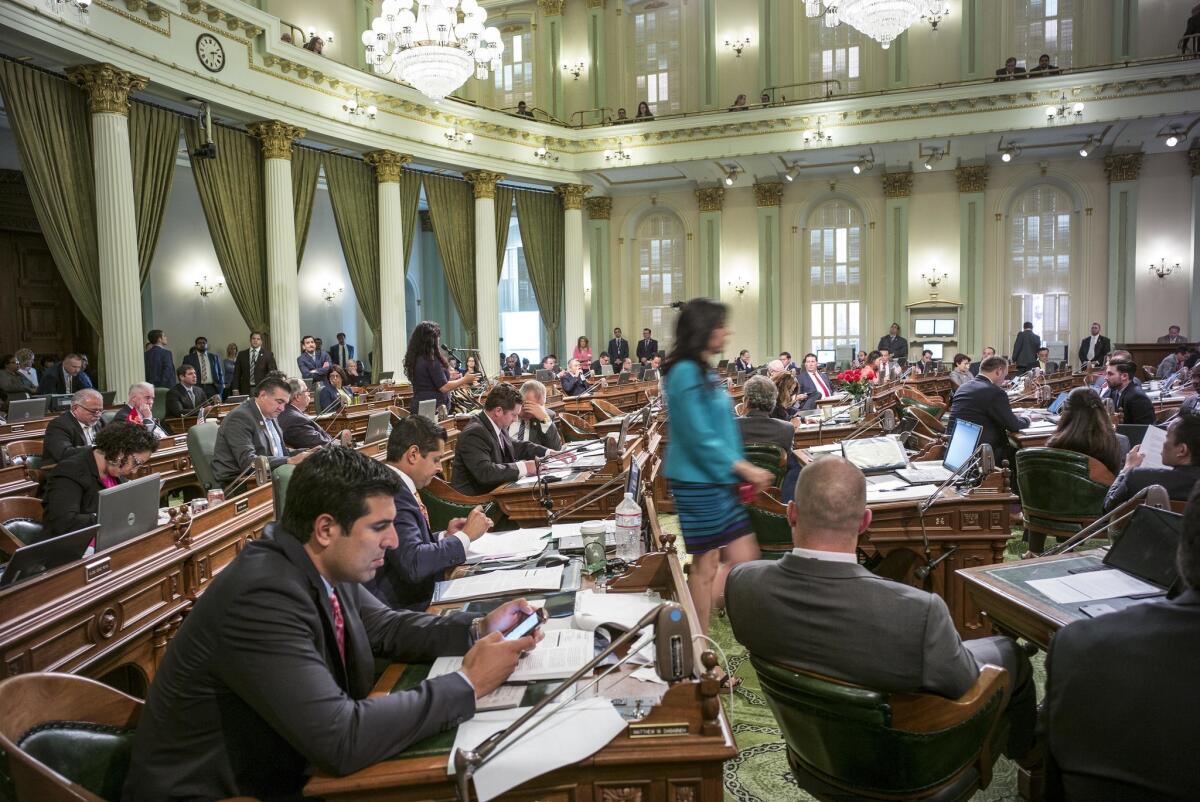
California lawmakers wrapped up their work for the year early Saturday morning, with sweeping new legislation to address issues from illegal immigration to the state’s housing crunch — with hundreds of bills being debated and decided in the final 48 hours.
Leaders of the state Senate and Assembly praised the work of the Legislature in remarks after the final gavels fell in both houses.
”I think this has been an historic year for all of our accomplishments,” said Senate President Pro Tem Kevin de León (D-Los Angeles) just after 2 a.m. Saturday. “We put our values into action.”
This was the first year of the Legislature’s two-year session. Lawmakers now return to their home districts and aren’t scheduled to return to Sacramento until January.
Two of the year’s most talked-about efforts both happened in the closing 48 hours of the legislative session.
Lawmakers gave final approval to a bill curtailing communication between local law enforcement officers and federal immigrations officials, often dubbed the “sanctuary state” measure, SB 54. And they approved a package of bills aimed at addressing California’s growing affordable housing crisis, including funds generated by a new real estate transaction fee and a $4-billion bond that voters must approve next year.
The year also saw the Legislature approve a number of other notable new laws:
- A sweeping law signed by Gov. Jerry Brown in July that extends the state’s landmark cap-and-trade climate change program until 2030.
- A $52-billion transportation plan agreed to in April, funded by a new annual vehicle fee and an increase in the state’s fuel taxes.
- A $183.2-billion state budget that boosts both several government programs and adds money to the state’s cash reserves.
Several closely watched proposals passed in the Legislature’s final hours of work are now headed to Brown’s desk, though it’s unclear whether he will sign them into law.
They include a number of efforts to push back against the policies of President Trump’s administration — from guidelines on campus sexual assault enshrined in federal law by former President Obama to bills designed to allow California to step in and embrace environmental and land-use policies that Democrats fear could be discarded by Republicans in Washington.
“We’re wrapping up what may be the most progressive legislative session in memory,” Assembly Speaker Anthony Rendon (D-Paramount) said in his closing floor remarks early Saturday morning.
Lawmakers ultimately rejected a number of other closely watched proposals, from a hotly debated effort to push back school start times for high schoolers to new rules regarding the release of police body camera video to the public.
The final day of the legislative calendar for 2017 crept beyond the traditional midnight deadline and included a small bit of controversy in the Senate. There, Republicans claimed that Democrats had failed to follow the proper procedure to continue beyond midnight — a charge that stalled the proceedings for more than half an hour. Democrats later said the rules allowed debate on the final bills to continue.
Brown now has until Oct. 15 to sign or veto bills sent to his desk. While he rarely endorses bills during their debate in the Legislature, the governor has historically signed most of the bills sent to him by lawmakers.
- Share via
Parks and water improvements likely to be on California’s 2018 ballot

Californians likely will see a $4-billion bond to fund improvements to parks and water infrastructure on the 2018 statewide ballot.
State lawmakers passed the bond early Saturday morning, and Gov. Jerry Brown has pledged to sign it.
“This is the single-largest investment in the history of the United States to park-starved communities,” said Sen. President Pro Tem Kevin de León (D-Los Angeles), the author of the measure, SB 5.
- Share via
Anti-Trump environmental protection proposal fails to advance in California Legislature
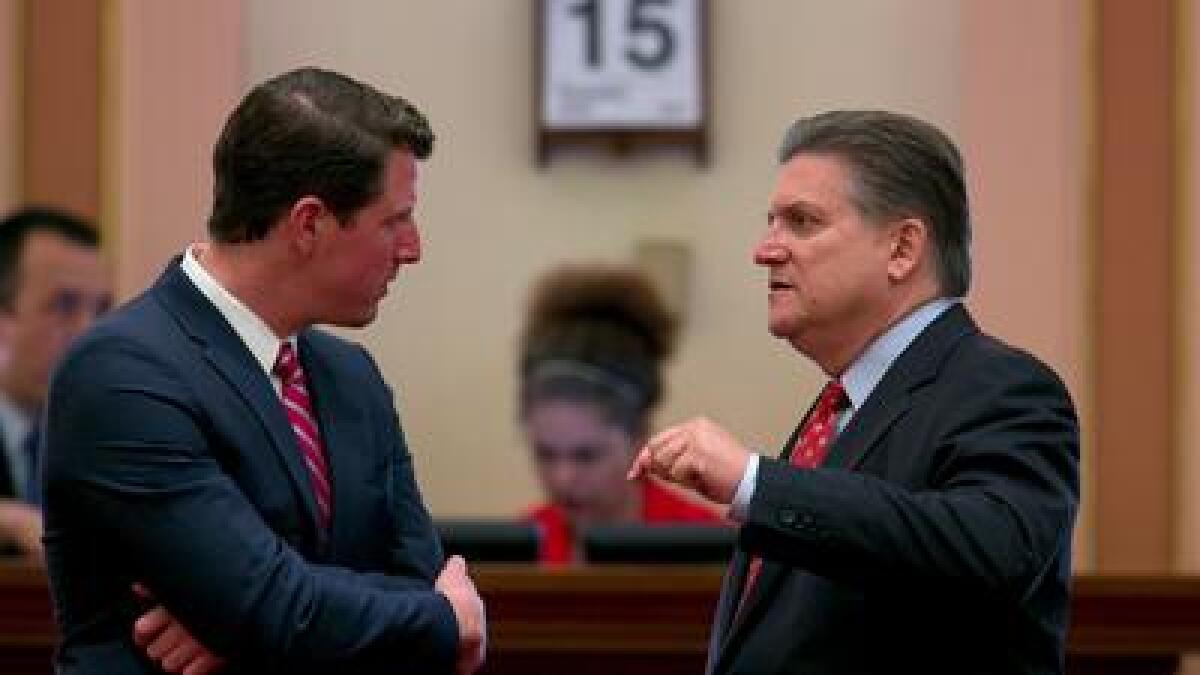
A proposal to help California guard against rollbacks of federal regulations stalled early Saturday morning at the end of the state’s legislative session.
SB 49 would have enshrined large swaths of federal environmental protection regulations and other rules into state law. The goal was to prevent changes made by the Trump administration from affecting California.
“It’s trying to freeze time,” said Sen. Henry Stern (D-Los Angeles), an author of the legislation.
Assemblyman Ian Calderon (D-Whittier), who helped push the legislation in the Assembly, said it struggled to get the necessary votes among members concerned about giving regulators outsized power. He said lawmakers could continue working on the issue next year.
“It’s not dead,” he said. “It’s just paused.”
Two related measures, Senate bills 50 and 51, were approved by lawmakers and sent to Gov. Jerry Brown. One would try to prevent the federal government from selling federal land without first offering it to the state, and the other would direct California officials to preserve climate change data at risk of being deleted by the federal government.
- Share via
Legislature declares California will be a ‘sanctuary state’
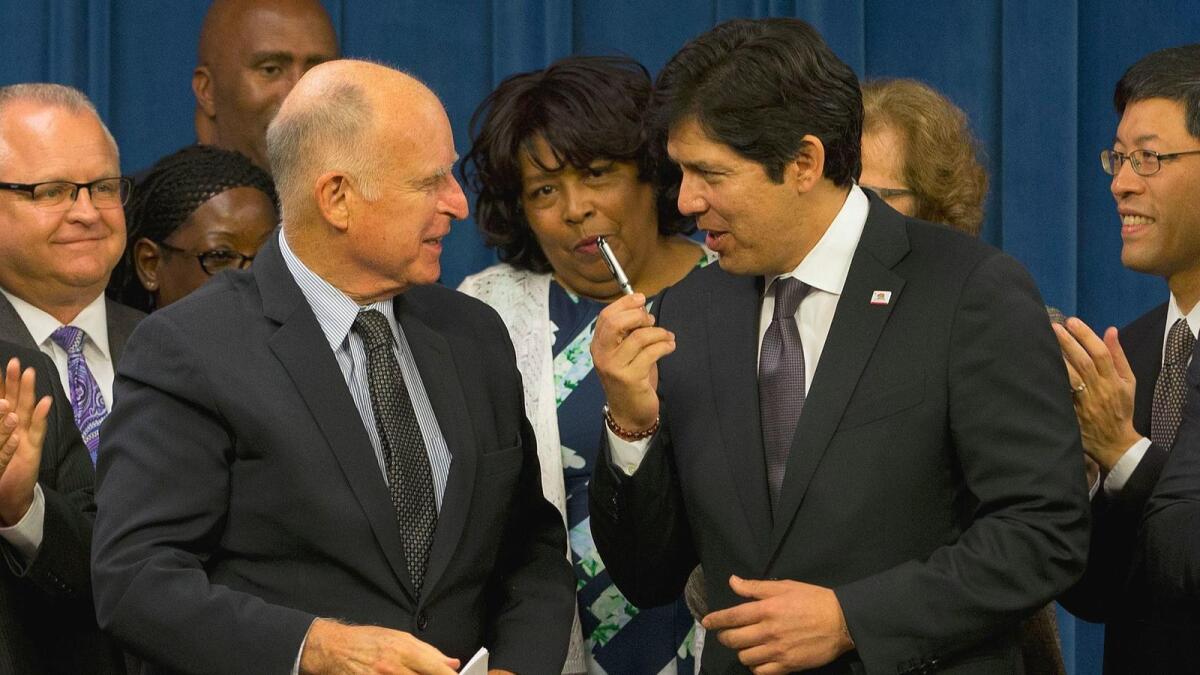
California lawmakers on Saturday passed a Senate bill that would turn the state into a sanctuary for immigrants without legal residency in the country, part of a broader push by Democrats to counter expanded deportation orders under the Trump administration.
After passionate debate on both House chamber floors, staunch opposition from Republican sheriffs and threats from Trump administration officials against so-called sanctuary cities, SB 54 by Sen. Kevin de León (D-Los Angeles) was approved with a final 27-11 vote. But the bill sent to Gov. Jerry Brown was drastically scaled back from the version first introduced, changes that were negotiated between Brown and De León in the final weeks of the legislative session.
On the Senate floor minutes before 2 a.m. Saturday, De León said the changes did not erode the mission of the bill, which was to protect hardworking families, and reflected a compromise between law enforcement officials and advocates.
“This is a measure that reflects the values of who we are as a great state,” he said.
SB 54 would limit state and local law enforcement agencies from communication with federal immigration authorities, and prevent all state and local police forces from questioning and holding people on immigration violations.
But amendments added this week would permit officers to continue sharing information and transferring people for immigration authorities if they have convictions for one or more of roughly 800 crimes.
In their respective chambers Friday, at least 20 members of the Assembly and six members of the Senate took the floor for debate on the bill.
Opponents pointed to the concerns from sheriff’s organizations, saying it tied officers’ hands, allowing serial thieves, chronic drug abusers and gang members to slip through the cracks. Supporters countered that the Trump administration was trying to paint all immigrants illegally in the country as criminals.
They pointed to provisions in the bill that would make hospitals, schools and courthouses safe zones for immigrants from federal immigration authorities at a time of fear for some communities. Some children without legal status were not going to school, they said, while police statistics showed a drop in reports of sexual assault and domestic violence as immigrant victims refused to come forward.
- Share via
California taxpayers will provide $270 million if L.A.’s 2028 Olympics goes over budget under bill passed by Legislature
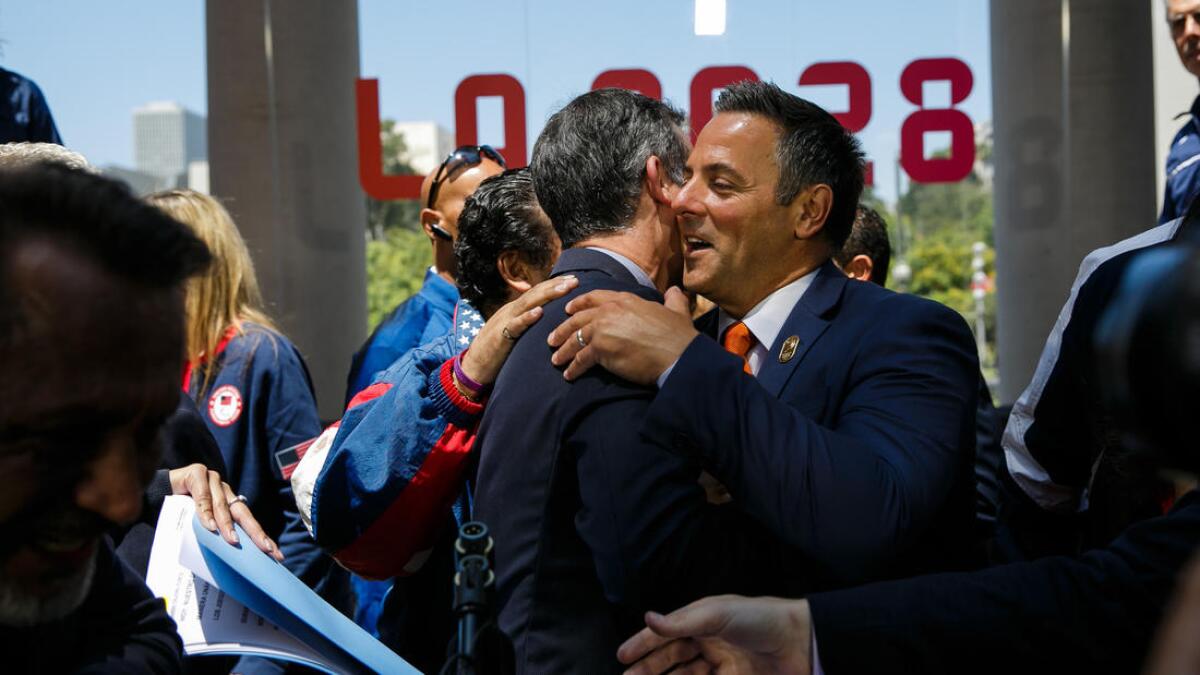
California legislators pledged up to $270 million in state tax dollars on Saturday to cover costs should Los Angeles’ 2028 Olympic bid go over budget.
The 2028 Summer Games are expected to have a $5.3-billion price tag, and organizers think corporate sponsorships, ticket sales and other revenue sources could cover expenses. Los Angeles was awarded the 2028 Games this week, and city officials have asked the state for financial assistance.
Gov. Jerry Brown has not specifically weighed in on the measure, AB 132, but has promised broad support for the Olympics. He also signed a measure last year that would have provided a similar financial guarantee when Los Angeles was bidding on the 2024 Games.
- Share via
Bill benefiting Facebook’s new headquarters, Hollywood development heads to governor’s desk
- Share via
California’s 2020 presidential primary should be in early March, lawmakers decide
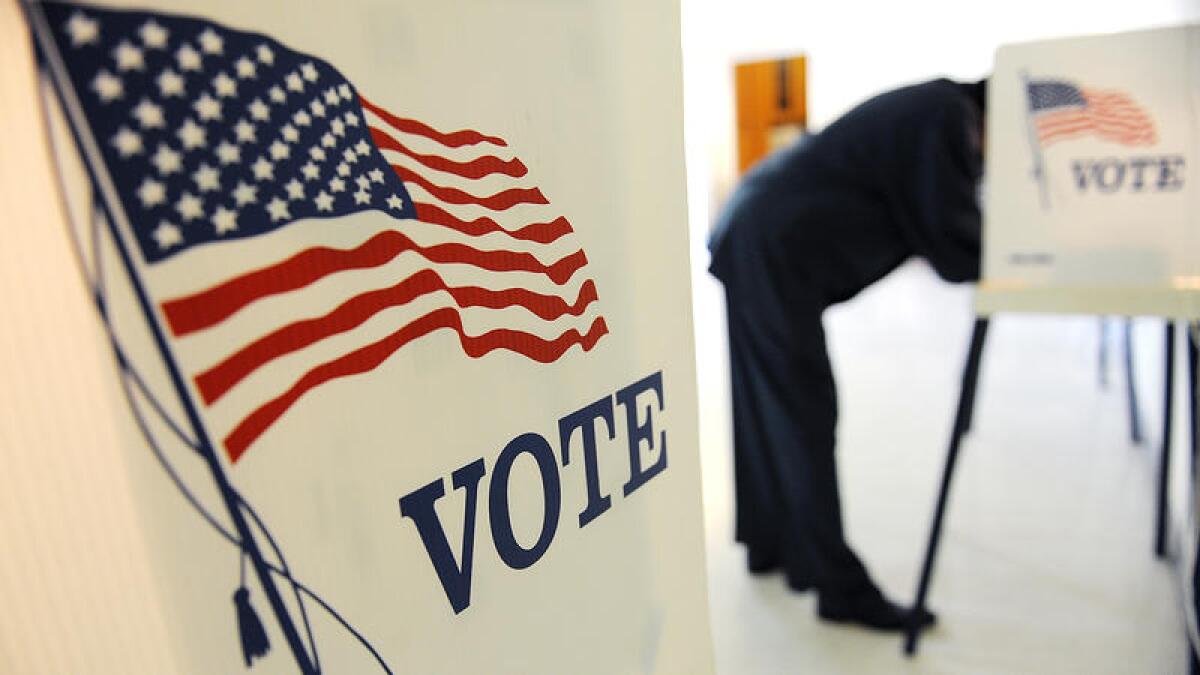
California lawmakers gave final approval on Saturday to moving the state’s primary elections to early March beginning in 2020, a renewed effort at relevance in the quadrennial presidential sweepstakes.
SB 568 would shift all primary elections — including those for statewide, legislative and congressional offices — to the first Tuesday in March, as long as it comes after the first Monday.
“Moving California’s presidential primary to March from June means candidates in both parties can’t treat immigration, climate change, criminal justice reform and investing in jobs and innovation like afterthoughts, as they did too often in 2016,” state Sen. Ricardo Lara (D-Bell Gardens), the bill’s author, said in a written statement.
California has tried to move its presidential primary in prior years as a way to entice Democratic and Republican candidates to come to the state and campaign. But in almost every election cycle, other states moved their primary or caucus even earlier, thus leaving California as a political also-ran.
Whether Gov. Jerry Brown will sign the bill into law is unclear. In 2011, he agreed to a plan by lawmakers to permanently hold all primary elections in June. This bill would undo that, prompted by Democrats who lamented the state again missing real presidential relevance in 2016. Hillary Clinton clinched the Democratic nomination just before California voters went to the polls.
Republican opponents said the early primary would, in turn, force candidates to file their candidacy papers for state offices as early as the December before the election year. They argued that would dissuade some newcomers from challenging incumbents who already might have amassed a large campaign war chest.
“Some of you may love that, but I don’t think it’s right for the voters,” said Assemblyman Matt Harper (R-Huntington Beach).
Brown has until Oct. 15 to act on the bill, along with dozens of others sent to him before the Legislature was to adjourn for the year early on Saturday morning.
- Share via
As legislative session drags on past deadline, Capitol denizens have some fun with Hamilton tweets
As debate in the California Legislature dragged on past midnight, and with it, debate on whether lawmakers could even technically still debate past midnight, some Capitol insiders had some fun with lyrics from the musical “Hamilton.”
Continuing a phenomenon that appeared to have started the night before, Capitol reporters, lobbyists and general policy wonks used lyrics from America’s hottest democracy musical to comment on and poke fun at the legislative sausage-making.
It all started Thursday, when CalMatters reporter Laurel Rosenhall seemed to take the first shot.
And she wasn’t going to throw it away.
Rosenhall promised there’d be more Friday. And there was.
- Share via
Gov. Brown supports bill sent to him that would end lifetime listing of many sex offenders on public registry
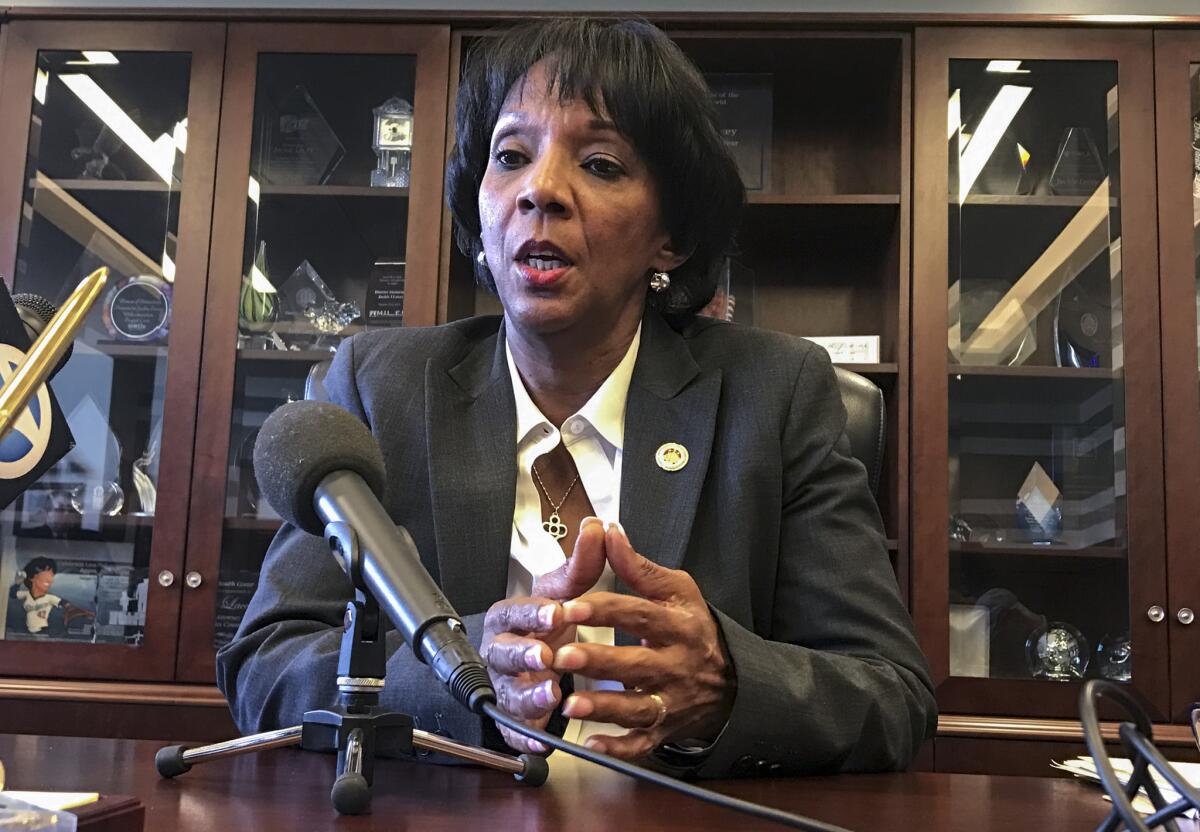
After an emotional debate, state lawmakers on Saturday gave final legislative approval to a controversial bill that would end the lifetime listing of many convicted sex offenders on a public registry in California.
The bill, which was shelved then revived, was sent to the governor on the last day of the legislative session with Assemblywoman Lorena Gonzalez Fletcher (D-San Diego) calling it one of the most difficult votes she has cast.
“It’s not an easy thing to do, but sometimes we have to make hard votes,” Gonzalez Fletcher told her colleagues, adding that being a mom made it difficult to change a system aimed at tracking rapists and child molesters.
The measure by Sen. Scott Wiener (D-San Francisco) would allow, starting in 2021, for the names of those who committed lower-level, nonviolent sex crimes or who are judged to be low risks to re-offend to be removed from the registry after 10 or 20 years, depending on the crime. The offender must petition the local district attorney for a review.
Wiener called his bill “a long overdue reform of California’s broken sex offender registry.”
Gov. Jerry Brown is expected to sign the bill.
“SB 384 proposes thoughtful and balanced reforms that allow prosecutors and law enforcement to focus their resources on tracking sex offenders who pose a real risk to public safety, rather than burying officers in paperwork that has little public benefit,” said Ali Bay, a spokeswoman for the governor.
Los Angeles County Dist. Atty. Jackie Lacey sought the change because the current registry has grown to a difficult-to-manage 105,000 people, which reduces its value to law enforcement trying to solve sex crimes by checking those on the list.
Because the registry is public, it also punishes people who have not committed new crimes for decades, including some who engaged in consensual sex, bill supporters argued.
“The only other states that still use this Draconian, outdated, ineffective law are Alabama, South Carolina and Florida,” Assemblyman Evan Low (D-Campbell) said during the floor debate.
The Assembly vote Friday was 42-22, with most Republicans, including Melissa Melendez of Lake Elsinore, voting against the bill.
Melendez objected to some of the crimes that would put offenders on a second tier, eligible for removal from the list after 20 years, which include rape by deception and lewd and lascivious behavior with a child under 14.
“We put so many children at risk if we do this,” Melendez told her colleagues.
The proposal also went to the Senate after midnight on Saturday for approval of amendments. It took a circuitous route to the governor’s desk. After a legislative analysis estimated it would cost $75 million over six years to revamp the database, an Assembly panel shelved a previous version of the bill for the year.
Wiener revived the proposal by taking a bill that would have studied allowing bars to stay open later, gutting that language and inserting the provision on the sex offender registry.